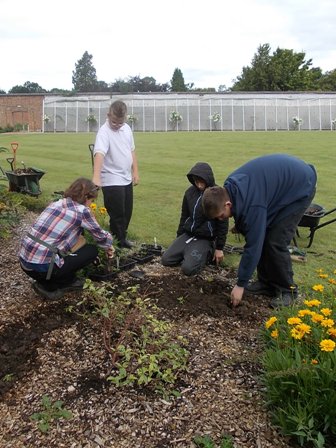Careers Advice: LMI
Hertfordshire Opportunities Portal (HOP) have provided Batchwood School with LMI or Labour market information posters which include important information about current employment sectors within the different parts of Hertfordshire.
What is it?
Labour market information is region specific and it tells you about the current work and job environments.
Why is it important?
- LMI highlights the fantastic career opportunities available across the county
- It helps decode the world of work by breaking it down into digestible chunks
- LMI is important for social mobility, young people should be more equipped to understand what is on offer in their region and how to get there by making informed decisions about their future career choices.
LMI Posters
The posters provide information for each town about where people work, what jobs they have and examples of the companies who people work for locally. It also shows information about qualifications that people have, how much they earn and how they travel around. Download the posters for each town below, and visit Hertfordshire Opportunities Portal www.hopinto.co.uk to find jobs or explore career options.
Newsletter
Welcome to our monthly newsletter, which provides a brief overview of the activities and life at Batchwood School.
Batchwood School is a very busy school, and there is so much going on. We hope you get a feel for the school by reading through our newsletters and seeing how our students develop their Passion, Belief and Courage in themselves.
Everyone is welcome to visit the school and see for themselves the unique happy family community of Batchwood and the belief that students have in themselves.
Cultural Capital
Cultural capital is the essential knowledge that children need to prepare them for their future success. ... It is about giving children the best possible start to their early education.
The importance of cultural capital
It is widely accepted that a person’s level of cultural capital is a huge indicator of how well they are able to succeed academically and engage in wider society.
This isn’t a new concept and Ofsted certainly didn’t coin it.
French sociologist Pierre Bourdeiu originally came up with the concept of a person possessing “capital”. Bourdieu (1973, 1986) explores the theory of cultural capital and highlights the link between an individual’s background and their access to knowledge.
Bourdieu (1986) breaks capital into three distinct types; embodied cultural capital, objectified capital and institutional cultural capital.
He emphasised that cultural capital is intrinsically linked to economic and social capital. Access to economic and social capital allows greater access to cultural capital and Bourdieu (1973) observed that, as a side effect, cultural capital is often linked to social class and as a result reinforces social divisions, hierarchies of power and inequality within society.
Eradicating inequalities
Within education, we obviously aim to reduce and, in time, eradicate inequalities. But improving an individual student's cultural capital isn’t a matter of giving them a book or sending them to see a play.
And, in turn, building on their social capital doesn’t just mean giving them a talking frame so they know how to interact. For schools to truly provide the required skills and experiences, social capital and economic capital must be considered and taken into account, as well as cultural capital.
In Cultural Literacy (1988), E. D. Hirsch succinctly summarises that “to be culturally literate is to possess the basic information needed to thrive in the modern world”. But alongside this, as educationalists, we must not overlook the importance of social capital and the opportunities and skills required for students to be successful in the delivery of themselves.
Exposure not only to culture but also to situations in which they might not have previous experiences is of paramount importance to their ongoing successes.
Moreover, having the understanding that economic capital is intrinsically linked to the level of a student's cultural and social capital keeps at the forefront of our minds the differences in experiences that our disadvantaged children may have had. Although it may not be glaringly obvious, across a class there can be significant variations.
Well-informed individuals
It follows, therefore, that, as educationalists, we need to ensure that along with teaching the content of the curriculum, we are enabling students to function as well-informed individuals well after they leave school.
It’s a huge job, but without the guidance of their teachers, some young people have very little cultural and social input from elsewhere and therefore may miss opportunities others are able to access and make decisions that are less informed than they could be.
The challenge for Batchwood School, now more than ever, is that the job of the classroom teacher has never been more important with regard to filling the gaps that students have.
Overview of Cultural Capital at Batchwood School
No matter the starting point, race, gender, sexual orientation, disability or religion, all students at Batchwood School are provided with opportunities to develop as well-rounded successful adults ready for the next stage of their education and life and play an active role in society.
Cultural Capital at Batchwood School provides students with the chance to:
- Experience awe and wonder throughout the curriculum
- Access visiting professionals/coaches in theme days
- Work with a wide range of local partners and businesses
- Take part in a wide variety of Arts events
- Learn about different leisure opportunities and skills
We ensure that all students at Batchwood School have a variety of opportunities that include:
- Extended learning Days (ELD) exploring a number of themes and relevant topics
- Forest school for all students
- A range of charity events
- Taking part in sports fixtures
- Community visits
- Broad curriculum opportunities for all
- Therapeutic approach for emotional development
Ensuring cultural capital for all students has meant that:
- Students experience a variety of high class opportunities throughout the curriculum
- Students access a breadth of high class art, music, performing and sporting activities
- Students access a variety of community opportunities
- Students are able to learn and apply skills in a wide variety of contexts and situations
- Students learn about their role in society and how they can contribute to society
- Students are able to access appropriate therapeutic input to support emotional development
- Students access a curriculum that is aligned to the aspirations of individuals, families and professionals
Finance
This school or college does not provide financial data directly comparable with other maintained schools.
For further information on this school's finances please see the government financial benchmarking tool: Batchwood School - Schools Financial Benchmarking - GOV.UK
Digital Learning
At Batchwood we are going to be using Google Classrooms so that we can continue, as well as supplement, the teaching of our curriculum, during times of distant learning, as well as the setting of home learning.
Teachers will be uploading videos of lessons as well as work for students to be able to access the full curriculum from home. All work can be found in your son/daughters class group, when you sign into Google Classrooms.
For GCSE students, all options are available in the class folder and they will need to select their chosen options.
To access Google Classroom please follow the link below:
You must sign in to Google to be able to access our specific classrooms.
Careers Advice: Gatsby Benchmarks
The eight Gatsby Benchmarks of Good Career Guidance are as follows:
A stable careers programme
Learning from career and labour market information
Addressing the needs of each pupil
Linking curriculum learning to careers
Encounters with employers and employees
Experiences of workplaces
Encounters with further and higher education
Personal guidance
Arrangements For The Admission Of Students With Disabilities
The Disability Discrimination Act 1995 defines a disabled person as one who has a physical or mental impairment which has a substantial and long-term adverse effect on a persons’ ability to carry out normal day-to-day activities. Most children with Special Needs will not be disabled within the meaning of the Act.
The admission of students with disabilities is considered in the first instance in the same way as non-disabled students. Further considerations are made in the light of need and accessibility. It is the Governors’ Policy to accommodate students with disabilities should parents wish. Steps are taken to prevent any students being treated less favourably than other students. In practice we ensure that classroom and extra-curricular activities encourage the participation of all students, including those categorised as having Special Educational Needs. Staff organise human and physical resources within the school to increase access to learning and participation by all students.
Batchwood School strives to ensure that the culture and ethos of the school are such that, whatever the abilities and needs of members of the school community, everyone is equally valued and treats one another with respect under the Equality Act 2010. Students should be provided with the opportunity to experience, understand and value diversity.
We aim to include all students, including those with disabilities, in the full life of the school. Our strategies to do this will include:
- having high expectations of all students
- finding ways in which all students can take part in the full curriculum including sport and music
- planning out-of-school activities including all school trips and excursions so that students with disabilities can participate
- setting admissions policy and criteria which does not discriminate against students with disabilities or treat them unfairly
- devising teaching strategies which will remove barriers to learning and participate for students with disabilities
- planning the physical environment of the school to cater for the needs of students with disabilities
- raising awareness of disability amongst school staff (teaching and non-teaching) through a programme of training
- providing written information for students with disabilities in a form which is user friendly
- using language which does not offend in all its literature and make staff and students aware of the importance of language
- examining our library and reading books to ensure that there are examples of positive images of disabled people
Existing facilities provided to assist access to the school by students with disabilities are:
- Wheelchair access at all entrances and sections of the school.
- Carpeted classrooms to aid hearing impaired students learning.
- Exterior lighting to improve evening access.
- A Disabled Toilet is offered close to reception (although we are awaiting a ramp to enable improved access)
- Disabled parking is available at the main entrance
Additional information
General adjustments
- Access to relevant school documents in your preferred format. For example, equal opportunities policy, evacuation and safety procedures
- Disability equality and impairment specific awareness training for staff
- Staff and students who know about your impairment should have sufficient information and awareness about the adjustments you need
- Staff should act as role models for students in treating you with respect and implementing the equal opportunities policy
- Adequate financial support to cover any extra costs
- Access to all school and school site facilities is planned (please see strand B)
- Support and information before and during the admissions process
- Additional time to complete coursework and possibly the entire course
- Study skills support
- Support using the learning resource centre or library, e.g. extended book loans, or help with locating and retrieving books and articles
General access arrangements
Adjustments to exams are called access arrangements. Listed below are some examples of the access arrangements you may need when you’re taking internal or external exams or assessments. Most education providers and examining bodies will have made exam arrangements for individual students before. But they may not have come across all possible arrangements as support needs vary from person to person.
- You may need extra time or opportunities to take rest breaks during exams
- You may need exam papers in your preferred format
- If you use assistive technology on your course, you should be able to use it for your exams e.g. computer equipment, specialist software, a reader or a scribe. It’s important that technical support on hand in case there are any problems with equipment
- You may need to use a separate room so that you’re not disturbed by other candidates, and they are not disturbed by you
- You may need assistance from another person as a prompter, a scribe (amanuensis) or as a reader
- Your assistant should have time before the exam to get used to their role, the style and format of the test and any subject- related issues.
Impairment-specific adjustments
Autism or Asperger syndrome
- Immediate access to pastoral support, e.g. particular staff member you can go to with any concern
- Staff to have awareness training
- Specialist tuition support, e.g. language skills or structuring work
- Materials in literal language, including exam papers
- Special photocopying arrangements
- Extra time to read, understand, and produce answers in exams
- Alternative ways of completing teamwork
- Support worker to act as a mediator for teamwork
- To have the same information conveyed in more than one way, e.g. verbally and in writing
- Time to get used to the school site or site
- Preparation for changes of routine, e.g. around deadlines and exam time
- Use of a separate room with an invigilator
- Exam paper written on plain paper in one colour
- Use of a prompter to keep you focused during exams
- Word processing facilities if motor control is impaired
- Use of peers, volunteers or a buddy system.
- Provision of quiet room if there are sensory issues.
- Allowing students to present to academic staff or make a video presentation instead of written assignments.
- Access to mentoring and study skills support
Blind or visual impairments
- Mobility trainer to learn routes to place of study, accommodation, school site and surrounding area (County provided).
- Time to get used to the school site or site
- Making aware evacuation routes and/or drawing up Personal Emergency Evacuation Plan.
- Personal reader to read course material and exam questions
- Scribes, amanuenses or notetakers to take notes in lessons and dictate answers in exams
- Large print, tape or Braille transcription services (County provided)
- Handouts and booklists in advance for transcription
- Audio description of visual props used in lectures (or alternative methods of teaching)
- Arrangements for placements and field work
- Private study area and special arrangements for photocopying
- Exercise area for your guide dog
- Good lighting, adequate signs and good colour contrasts on signs and buildings
- Taking exams in a separate room with an invigilator
- Extra time to read, understand, and produce answers in exams
- All exam invigilators to be aware of your impairment so they can give time warnings and tell you when to stop writing
- Deadline extensions on assessments as and when needed.
- Alternative exam arrangements
- Modifying or adapting equipment to allow you to participate in practical classes e.g. handheld illuminated magnifiers, beakers with raised markings, talking thermometers.
Deaf or hearing impairments
- Note takers
- Remote captioning e.g. using Skype to access a palantypist
- Radio or infrared microphone system (County provided)
- For school staff to receive deaf awareness training
- All exam invigilators to be aware of your impairment so they can give time warnings and tell you when to stop writing
- Covering the cost of photocopying course materials
- Software to help with English, particularly grammar
- Use of a separate room, with an invigilator
- Extra time to read, understand, and produce answers in exams.
- Personal Emergency Evacuation Plan to ensure you can evacuate the building safely in an emergency.
Learning difficulties
- To be treated with respect as an individual, without staff being directive, patronising or making assumptions about what you know and what you can do
- Course materials in plain English or with symbols
- Extra time to put together responses
- Independent advocacy services
- Clear explanation of specific tasks and any changes of routine.
Medical conditions
You may not consider yourself to be disabled if you have a medical condition, but you may need additional support or special arrangements while studying. Medical conditions might include epilepsy, diabetes, ME, eczema, sickle cell anaemia, or asthma.
- Alternative arrangements for work and deadlines if fatigue, stress and effects of medication are an issue
- Timetable planning to avoid fatigue and problem environments
- Arrangements to meet specific dietary needs, e.g. use of a fridge
- Rest room on school site
- Medical support and emergency arrangements
- Place of privacy to take medication and assistance if required
- Ongoing dialogue with staff if you have a hidden and/or fluctuating condition
- Contact from staff during any periods of time away from studies
- Flexibility in attendance and punctuality if treatments or therapies are tightly scheduled
- Supplying notes or arrangements for catch up sessions if you miss lectures
- Designated parking space
- Awareness among staff of your condition
- Maintenance of confidentiality regarding your condition
- Specialist or adapted computer equipment, e.g. a screen filter or monitor without flicker if you have photosensitive epilepsy
- Provision of snacks during exams
- All exam invigilators to be aware of your impairment so they know what to do in a medical emergency
- Supervised rest breaks during exams.
- Extra time in your exams, for example, if you have difficulties with memory and processing information.
Mental health condition
- Timetable planning and help with your work programme to deal with stress. This may include limiting the number of exams in a day or week
- Extra support and help with planning before or during exam and assessment periods
- Exam officers to be aware that problems may arise during exam periods
- Access to mentoring and study skills support
- Support from welfare and counselling staff
- Named contact to go to for support when necessary
- Academic staff to be clear about what they expect from you
- Flexibility in attendance and punctuality if treatments or therapies are tightly scheduled or during times when difficulties are worse than usual
- Computer equipment to enable you to study at home
- Quiet room to rest in
- Contact from staff during any periods of time away from studies
- Maintenance of confidentiality about your mental health condition
- Sufficient information and awareness among staff who do know about your difficulties, to prevent major misconceptions
- Supervised rest breaks during exams
- Prompter to keep you focused in exams
Physical impairments
- Adapted furniture for studying at home or school and use of these in exams
- Use of assistive technology in exams
- Scanner
- Typing or transcription services
- Scribes, amanuenses or note takers for lessons and exams
- Support for practical and field work
- Particular travel arrangements
- Parking space on school site
- Timetable planning to ensure accessibility and avoid long distances
- Additional time at mealtimes for medical needs
- Rest room on school site
- Well-ventilated classrooms if heat leads to discomfort
- Extra time for course work and exams, depending on your method of communication and working
- Use of a separate room, with an invigilator, if using equipment or taking frequent rests because of fatigue
- Supervised rest breaks during exams
- Alternative ways of demonstrating competency, for example through oral responses instead of written.
Specific learning difficulties (for example, dyslexia, dyspraxia, dyscalculia)
- Specialist tuition support, e.g. language skills or structuring work
- Support with identifying the most relevant books and chapters to read
- Assistive technology such as a computer with dictionary explanations software or a screen reader
- Use of assistive technology in exams
- Use of a separate exam room, with an invigilator
- Handouts and booklists in advance of classes
- Handouts and exam papers in preferred format, e.g. on tape or on different coloured paper
- Special photocopying arrangements
- Scribes, amanuenses or note takers, proof-reader, support worker, and use of amanuenses in exams
- Extra time to read, understand and prepare answers
- Use of literal language and keeping oral instructions simple and concise
- Extra time after tutorials to check understanding
- Exam papers printed on coloured paper or printed in ink other than blue or black
- Use of coloured filters or overlays
- Use of coloured pens (other than blue or black)
- Oral examinations instead of, or in addition to, the written examination.
Speech, language and communication impairments
- Modified assessment arrangements for any oral exams and presentations or group work
- Timetables to include longer tutorial and seminar sessions
- Advice and guidance from a speech and language therapist
Accessibility Action Plan
Strand A: Increasing the extent to which disabled students can participate in the school curriculum.
| Targets | Strategies | Timeframe | Goals achieved | |
|---|---|---|---|---|
| Short term | Continue to provide a more appropriate vocational curriculum at KS4 | Work in partnership with Alternative Providers in extending the range of provision | September 2021 on going | Yes |
| Short term | Improved training and communications with all staff | Regular daily meetings Information/advice to all departments Support/Inclusion Staff training CPD Literacy, Phonics and Numeracy CPD Assessment Whole staff training on specific disabilities when needed |
September 2021 on going | Yes |
| Short term | Improved access for students with ICT | Purchase a set of 6 Laptops | September 2021 on going | Yes |
| Medium term | Improve Disable accessibility throughout the school (Research & Planning) | Work with HCC to; audit building, and make recommendations regarding alterations | September – December 2021 | On going |
| Long term | Create improved Disability access throughout the school (Actual building) | Funding from HCC to put in place building alterations | September – December 2021 | Not yet |
Strand B: Improving the physical environment of schools
Short Term
- To improve disabled access to designated Main Hall area.
- Create Disabled toilet facility (completed June 2020)
Medium Term
- Improved ICT facilities for students
- Physical accessibility of school improves to all ground floor is possible
Long Term
- All appropriate entrances have ramps and handrails and nosing on steps
- Secure resources from the LA, over a three-year period improve all appropriate entrances.
- Physical accessibility of school increased along ground floor corridors
Strand C: Improving the Delivery of Information to Disabled Students
| Targets | Strategies | Timeframe | Goals achieved | |
|---|---|---|---|---|
| Short Term | To ensure that all members of the school community are aware of the need to differentiate and provide for students who need information provided in alternative formats. | Staff meetings Awareness Training Distributing information / advice to staff when appropriate. |
September 2021 | On going |
| Medium Term | To enhance the fabric, resources and the buildings including the outdoor learning | To meet with whole school and departments to identify issues | Ongoing as different needs arise. | On going |
| Long Term | Redesign Curriculum to ensure more differentiation for all students to meet their needs with more vocational learning and the development of the outdoor curriculum | Continue to refine the KS3/KS4 Curriculum to ensure it meets the needs of all learners | On going | On going |
Reading, Phonics, Interventions & Communication
At Batchwood School, our aim is to enable students to develop their reading and communication skills through continuous encouragement, whilst fostering a love of reading. At Batchwood, we are able to achieve this by using a wide range of high quality texts throughout our curriculums, which ensure that the students will progress their reading and exposure as they move through both Key Stage 3 and Key Stage 4. Reading skills are also encouraged and developed through students being taught to use objects, photos, and symbols to promote the development of their receptive and expressive skills. This is to enable students to expand their critical thinking skills. They use their reading knowledge to develop analytical and evaluative comprehension through exposure to a wide range of texts. In turn, they strengthen their reading skills progressively, so that they are able to access all texts used in Key Stage 4 for assessment and be ready for life after school.
This is achieved through discrete weekly reading for pleasure lessons, where students are engaged with a variety of age-related stories; through reading and literacy weekly form time, where the students can individually choose their own book to read or read as a group; and through continuous access to a wide range of books organised in reading difficulty levels in our school library. Individual reading is encouraged, with Batchwood sourcing books relating to students’ individual interests. Students also have the opportunity to have stories read to them by staff to encourage the discovery of new vocabulary. Staff model their love of reading through classroom displays of their favourite books and the book they are currently reading. During weekly house assemblies, staff will discuss their favourite book with the school. Reading skills are also promoted through technology and games, through Literacy Planet and reading of non-fiction and news stories is encouraged and promoted through the school's subscription to First News.
Phonics & Interventions
When students begin their journey at Batchwood, they are assessed for their knowledge of phonics. Where necessary, students will be given one-to-one sessions to develop their phonics and reading skills. These sessions are adapted to meet the individual special needs of the student. The students are regularly assessed to monitor their progress. Phonics is taught either individually or in small groups using the Letters and Sounds program or Toe by Toe, which is a reading programme designed for older learners.
Where students are able to apply their phonics knowledge but their reading is affected by their special educational needs, as set out in their EHCP, or where they are not at age-related expectations, we provide one-to-one interventions with staff. In these sessions, students are encouraged to read and are introduced to a wide range of new vocabulary where each student can work at their own pace, developing their skills. During these sessions, students can also be introduced to new texts or stories not in the subject specific curriculums, which are chosen using a person-centred approach, in another effort to foster a love of reading.
Teaching & Learning of Reading
At Batchwood School, our staff understand and place value on the teaching and learning of reading and have high aspirations for our students’ learning. It is recognised by all staff that each of our students have special educational needs, making it difficult for some to advance their reading skills. As well as baseline assessment upon entry to the school, students are given an annual reading test to allow us to monitor their progress and direct interventions where needed at a level suitable for the individual.
Students’ learning is supported through a breadth of texts over the five-year curriculum. The curriculum includes poetry, fiction, non-fiction and instructional texts. Teaching enhances the students’ understanding of these texts and gives them every opportunity to read and learn about the many different texts that are in everyday life at levels suitable to them, whilst ensuring progression and challenge. The texts selected are appropriate for students at both their level of understanding and reflect what they need to learn. For example, students in Key Stage 4 are introduced to texts related to the GCSE curriculum and for the final exams as well as texts to prepare them for adulthood. At Key Stage 3, students access texts that introduce them to key concepts, and language devices to support learning in Key Stage 4. In doing so, we are removing barriers our students face to be able to access public exams where appropriate.
Our discrete reading for pleasure lessons introduce students to new genres and themes, supporting our students’ learning by ensuring they have had access to as many different texts as possible. These lessons also encourage our students to develop the reading and listening skills alongside their receptive and expressive communication skills, through group discussions at different points through the text being read.
Reading & SMSC
At Batchwood, we understand the importance of reading in the development of our students’ SMSC and understanding of language to support their preparation for adulthood. As such, we ensure that we use reading to promote social skills in our students.
By using reading and literacy games, our students are encouraged to build their social skills and their communication with peers and staff.
Batchwood uses reading to promote themes in relation to mental health, RHSE and PSHE, for specific learning of important cultural days, such as Holocaust Memorial Day, where students were taken to exhibitions and encouraged to read the information, study of Anne Frank’s Diary and other texts relating to the holocaust. Students are annually introduced to texts relating to war for Remembrance Day, where some students are encouraged to read aloud for the school.
To progress our students and their reading skills, we ensure that we introduce our students to texts relating to a wide range of themes to enhance their cultural capital. We use texts from the British literary heritage, such as Shakespeare, with visits to the Globe, Dickens, 19th century authors, poetry and drama texts, alongside modern and contemporary literature.
Next Steps for Reading at Batchwood School
We will be introducing a reading record to encourage independent reading for all students. This will ensure reading progression is closely tracked and students will have more opportunities to read texts of their choosing that can be supported by the school.
There will be continuous promotion of our existing resources, including First News and Literacy Planet, and the development of a rewards system to encourage the use of these valuable literacy resources.
We will continue to develop our library and book provision to ensure students have access to an area which further promotes their love of reading, inspires their creative thinking and gives them the opportunity to experience reading that has not been teacher led. We will also be buying new books and digital titles relating to individual interests.
There will be ongoing staff training on reading and phonics across the school to enable all staff to aid the progression of all our students, across all subject areas.
We will continue to promote literacy across the curriculum and reading for pleasure across subjects and in form groups.
Relationships, Sex & Health Education Curriculum (RSHE)
Starting in September 2019, all Batchwood students receive one RSHE lesson a week taught by their form tutor. This subject is taught by form tutors to enable students to feel as comfortable as possible whilst learning and discussing what can be, sensitive topics. We like to work with all stakeholders and as such, parents were invited to attend a RSHE consultation evening in October with the form tutors and our RSHE lead. The aims of this evening were to:
- Provide information on new statutory RSHE framework, in particular relationship and sex education.
- Clarify the nature and purpose of the curriculum.
- Create an open forum for parents to share their ideas, thoughts or concerns regarding the curriculum content and how it will be delivered.
- Use the outcomes of this discussion to inform how we plan and deliver RSHE.
It is our aim as a school that Students are provided with a robust RSHE curriculum so that they are able to:
- Embrace the challenges of creating a happy and successful adult life.
- Gain knowledge that will enable them to make informed decisions about their wellbeing, health and relationships and to build their self-efficacy.
- Put this knowledge into practice as they develop the capacity to make sound decisions when facing risks, challenges and complex contexts.
- Develop resilience, to know how and when to ask for help, and to know where to access support.
- Develop the spiritual, moral, social, cultural, mental and physical development of pupils, at school and in society
We endeavour to ensure all students are provided with a safe learning environment when studying RSHE and will do this as follows:
- We will establish ground rules at the start of every lesson
- Have an ‘Anonymous question box’ available at all times
- Give students a ‘pass’ or ‘exit’ option: teachers will have agreed how students may signal to them that they don’t feel comfortable taking part in an activity.
- Discussion with students on we can do to make them feel comfortable and find out which topics they are most interested in.
- If students or teachers require any support with any issues that arise, they are able to speak to myself, SLT and/or the Safeguarding team
- All teachers will have read guidance on creating a safe learning environment as advised by the PSHE association.
In addition to weekly lessons, promoting and supporting student’s Mental/physical health and positive relationships is at the heart of everything we do as a school. This includes, Calm starts, reflective time, increased PE lessons and opportunities to engage in Physical activity, cooking and learning about healthy food, mentoring, counselling, sessions with our Assistant Psychologist and supporting students in resolving conflicts and maintaining friendships.
To enrich our RSHE curriculum we will also deliver: extended learning days, have school visitors/workshops and trips in relationship to RSHE. In our Autumn term we have had a visit from the charity ‘Fearless’ who delivered workshops on knife crime, exploitation and guidance for young people on reporting crimes anonymously.
Topics we have started to cover in RSHE lessons so far are:
- Forming positive friendships
- Bullying & Cyber bullying
- Online stress and FOMO, & Body image in the digital world.
- Mental Health and Well-being
For any more information on our RSHE curriculum please contact our RSHE lead Ms L Graham: .(JavaScript must be enabled to view this email address)
A New Logo for Batchwood School
A rationale behind the new design
At Batchwood School, we are relentless in our pursuit for excellence. Part of the process in achieving this is by continually challenging the mind-set and culture of the school and encouraging it to have good attitudes and to be aspirational and ambitious.
Through a thorough and comprehensive consultation process, we arrived at the Logo and Motto you now see. Passion, Belief and Courage are the characteristics we want to see all our students grow and develop as they prepare for life after Batchwood School. Those people that excel in life are those that follow their passion. At Batchwood we are committed to enabling every student to find their passion, to believe in themselves and to have the courage to persevere and achieve their life plans and dreams.
This school is a student-centred school, and Henry Smith a former Head Student (2020-2021) came up with ‘Cog idea’ for the Logo. Below is his rationale behind the design:
In the Batchwood logo, the imagery of cogs is used to convey both a sense of togetherness as well as the need for individuality in school, because without these things, like cogs, the school system would not work for them. If a young person comes to school willing to learn they will learn well, however if they come to school without the drive to learn, then the school, with all its different cogs available, will help them turn things around, because school is a like a machine preparing children for later life; furthermore, the cogs in the logo are within a shield which signifies the togetherness and community that school presents. The shield could also be taken more literally representing the walls and fences of the school grounds. These attributes all contribute to creating a homely atmosphere and provide for the school community an experience at school that is as stress free and calming as possible. (Henry Smith)
Adding to this are the thoughts from another former head student Connor Hudson (2020-2021):
The Cog design has much more of a story behind it. We are all different and the colours and sizes of the cogs represent our diversity. They also represent the House colours that are an important pastoral system in our school.
Students defining their student-centred school.
Mental Health & Wellbeing
At Batchwood School, we believe in promoting positive mental health and wellbeing as a whole school approach.
We are committed to providing a safe and understanding environment to support and promote success and achievements. Our pupils are taught how to manage their academic, emotional, and social lives in a positive way. This gives students the knowledge and capability to take care of themselves and seek support when challenging situations arise. We collectively strive to reduce the stigma surrounding mental health by incorporating a whole school ethos that encourages students to seek support from our staff.
The Zones of Regulation
The Zones of Regulation is the framework we follow to teach our pupils skills in consciously regulating their actions, which in turn leads to increased control and problem-solving abilities. Using a cognitive behavioural approach, the curriculum's activities are designed to help students recognise when they are in different states called zones, with each of the 4 zones represented by a different colour. Students are taught how to use strategies or tools, to stay in a zone or move from one to another, as well as calming techniques, cognitive strategies, and sensory support.
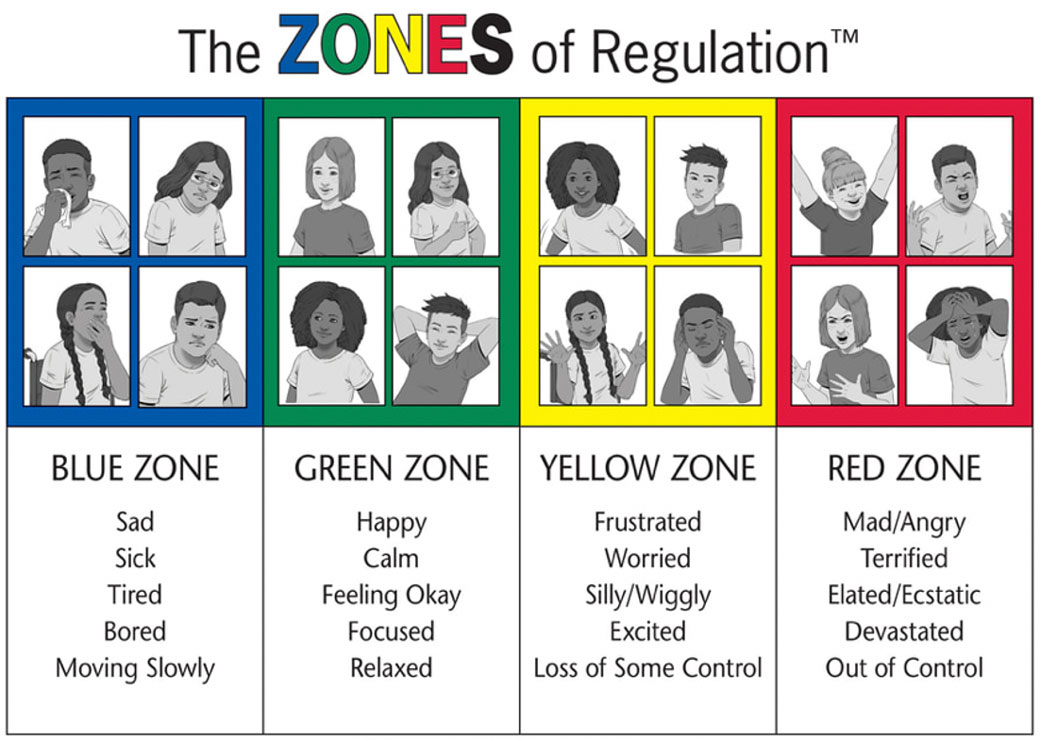
 Parent Guide To The Zones of Regulation
Parent Guide To The Zones of Regulation
The 5 Social Emotional Learning Core Competencies
We provide regular learning opportunities for pupils to develop their social and emotional learning within their form groups across KS3 & KS4. As a school, we value these 5 areas as being an integral element as part of a holistic education provision.
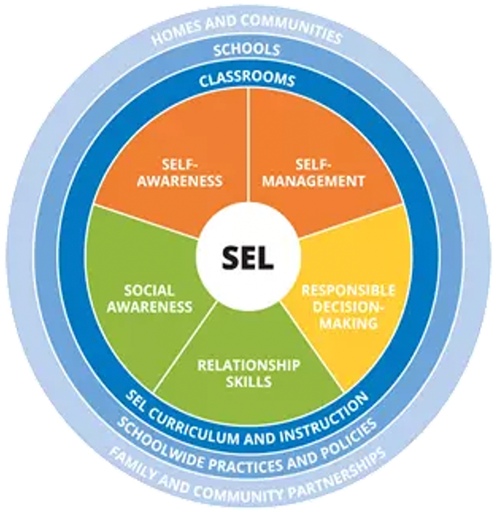
Assessing Mental Health & Wellbeing

We have taken a proactive approach and collaborated with ‘Govox’, an online platform which monitors pupils' mental health. Students’ complete check-ins on a termly basis which provides the school with a wellbeing score. This flags up any concerns and highlights at-risk individuals, particularly those who find it difficult to ask for help. This way we can make sure those struggling with their mental health are given the opportunity to be heard and offered further support.
Mental Health & Wellbeing Ambassadors
Links & Resources
Mental Health and Wellbeing
Kooth - www.kooth.com
– Free, safe, and anonymous online support and counselling for young people.
ThinkNinja - Available for Android and Apple IOS on the app store
– ThinkNinja is a mental health app designed for 10- to 18-year-olds. Using a variety of content and tools, it allows young people to learn about mental health and emotional wellbeing and develop skills they can use to build resilience and stay well..
Anna Freud / On My Mind - www.annafreud.org/on-my-mind
– On My Mind aims to empower young people to make informed choices about their mental health and wellbeing. Includes a youth wellbeing directory of local support services.
Young minds - youngminds.org.uk
– Advice, help and support for young people suffering from mental ill health and their parents. Includes Young Minds Crisis Messenger for those in mental health crisis and a parent’s helpline. Young people aged 10-17 and parents can discuss anxieties (including health, and school) by calling Herts Mind Network’s Young People’s Helpline on 01923 256391.
Royal College of Psychiatrists - www.rcpsych.ac.uk/mental-health/parents-and-young-people
– Information for young people, parents, and carers about young people’s mental health. Their aim is to provide information which enables people to make informed decisions about their health. Covers a wide range of areas of mental health difficulties.
Childline - www.childline.org.uk
– Information, advice, and support on a variety of topics from bullying, abuse and feelings to relationships, friendships, and sex - 0800 1111
Hertfordshire Wellbeing Service and Single point of contact for child and adolescent mental health (CAMHS) - www.hpftcamhs.nhs.uk
– Hertfordshire wellbeing service offer free, confidential talking therapy and practical support for people aged 16 and over and registered with a Hertfordshire GP service 0300 777 0707
Bereavement
Hope Again - www.hopeagain.org.uk
– A website offering support, advice and information for young people who have been bereaved.
Sudden Bereavement - sudden.org
– A website and helpline offering support for those who have been bereaved suddenly, or when someone has died too soon in their life.
The National Bereavement Partnership - www.nationalbereavementpartnership.org
– The National Bereavement Partnership provides a support helpline, counselling referral and befriending service for all those suffering from anxiety, grief, or mental health issues as a direct or indirect result of the COVID-19 pandemic - 0800 448 0800 (7am -10pm, seven days a week)
Self-Harming and Suicide
Shout - Text SHOUT to 85258
– Free, confidential 24/7 mental health text support.
Alumina - www.selfharm.co.uk
– Alumina is a free, online 7-week course for young people aged 11-19 struggling with self-harm.
NHS Mental Health support at any time of the day or night - Freephone: 0800 6444 101
– We are available 24/7 for Hertfordshire residents who are experiencing a mental health crisis and need some mental health support.
Live chat at: www.hpft.nhs.uk/contact-us, 7am-7pm Monday- Friday. In the case of serious illness or injury, dial 999 for emergency services.
Harmless - harmless.org.uk/
– Harmless provides support and information to people who self-harm, their friends, family and professionals.
Samaritans - 08457 909090
YoungMinds Crisis Messenger - giveusashout.org
– YoungMinds Crisis Messenger provides free, 24/7 crisis support across the UK for young people experiencing a mental health crisis. Text YM to 85258 for urgent help.
Papyrus - www.papyrus-uk.org
– PAPYRUS provide confidential support and advice to young people struggling with thoughts of suicide, and anyone worried about a young person through their website and helpline, HOPELINEUK: 0800 068 4141 10am-10pm weekdays, 2-10pm weekends
Local Food Banks
St Albans & District Foodbank - stalbansdistrict.foodbank.org.uk
– Email .(JavaScript must be enabled to view this email address), telephone: 01727 613019
Watford Foodbank - www.watfordfoodbank.co.uk
– Open Monday – Saturday, 10am – 1pm. Call 01923 804 435 or email .(JavaScript must be enabled to view this email address) for more information.
Eating disorders
Beat - www.beateatingdisorders.org.uk
– Beat offer support, advice, and information on eating disorders.
Drugs and Alcohol
Frank - www.talktofrank.com
– Honest information about drugs.
Alcohol Education Trust - alcoholeducationtrust.org/parent-area
– Parental advice for teaching young people about alcohol and the law. Includes topics such as parties, festivals, and holidays away with friends.
Domestic & Sexual Abuse
Rape Crisis - rapecrisis.org.uk
– Rape Crisis Centres provide frontline specialist, independent and confidential services for women and girls of all ages who’ve experienced any form of sexual violence, at any time in their lives. This includes counselling and support.
NHS Help After Rape and Sexual Assault - www.nhs.uk/live-well/sexual-health/help-after-rape-and-sexual-assault
– Advice on options and support available after an assault or rape.
Herts Sunflower - www.hertssunflower.org
– Free and confidential support, advice, and information for anyone affected by domestic abuse - 08088 088 088
Herts Sarc - /www.hertssarc.org
– Free support and practical help to anyone in Hertfordshire who has experienced sexual violence and/or sexual abuse.
LGBTQ
Switchboard - www.switchboard.org.uk
– A charity for LGBTQ people looking for community, support, or information - 0300 300 0630
Stonewall - Stonewall.org.uk
– National LGBTQ+ rights charity
Parental Alcohol Misuse & Guidance
You are not on your own is a booklet aimed at 10–14-year-olds affected by a parent or carer who drinks too much. It is designed to help children and young people have frank discussions with professionals or trusted adults about a parent’s drinking and is intended to address ways to keep them safe from harm.
 You are not on your own booklet
You are not on your own booklet
Sleep
The National Sleep Helpline - teensleephub.org.uk
– Who do I talk to if I can’t sleep? The National Sleep Helpline can help with your sleep problems - 7pm and 9pm, Sunday to Thursday on 03303 530 541.
Home Learning
Home-learning for both key Stage 3 and Key Stage 4
As part of our drive on the three A’s (Attitude, Aspiration and Ambition), we set home-learning activities for all students in years 7-9 (Key Stage 3) and years 10-11 (Key Stage 4).
The home-learning will be posted on our blog sites which are shown below. Simply type in the relevant address into your ‘Explorer’ and you will be taken to that site. The home-learning will be self-explanatory. As parent/carer, you will also be able to see what home - learning activities have been set. House points will be awarded for completed of home-learning activities.
The address for any home-learning in years 7-9 is:
The address for any home-learning in Years 10-11 are:
School Lunch Menus
Here is the menu for school lunches for this half term:
 School Menu: 1st half term 1 2024/25
School Menu: 1st half term 1 2024/25
Curriculum Philosophy
Our curriculum is at the heart of everything we do.
Ofsted has a working definition of a curriculum which is:
- The curriculum is a framework for setting out the aims of a programme of education, including the knowledge and understanding to be gained at each stage (intent)
- For translating that framework over time into a structure and narrative, within an institutional context (implementation)and,
- For evaluating what knowledge and skills students have gained against expectations (impact/achievement)
The aim of the curriculum at Batchwood School is to create:
- Successful learners who enjoy learning; make good progress and achieve excellence.
- Confident individuals who are able to live safe, healthy and fulfilling lives.
- Responsible citizens who can make a positive contribution to society.
It is essential that the curriculum is organised in such a way that it provides students with the opportunity to learn expected behaviours and be successful in their learning so that we can deliver our mission and aims.
Curriculum Intent: Fostering life-long learning behaviours at school through independence, choice, collaboration and personal discovery.
At Batchwood School, we aim to provide a curriculum which:
- Is as rich, inspiring and broad as possible to allow students to widen their horizons in each subject
- Takes into account individual needs and styles
- Provides the depth that enables students to master the key knowledge and skills essential for each subject
- Is well designed, inclusive and carefully sequenced to provide all students with a rigorous foundation for future progression
- Engenders high expectations and challenge in order to develop students’ perseverance and self-belief
- Provides students with opportunities to take their curriculum beyond the classroom to develop their love of learning, independence and creative thinking
- Offers students a wide range of opportunities to own and personalise their curriculum in order to develop existing talents and interests and discover new ones
- Enables students to maximise their potential, achieving the highest levels of academic success leading to the widest range of pathways
- Raises students’ aspirations and equips them with the knowledge and skills to flourish in their future careers
- Will support all students to become confident and articulate and are able to lead, persuade and challenge others
- Fosters the development of students’ character, personal development, health and wellbeing preparing them to make a valuable contribution to society
- Allows everyone to experience success
- Develops the students own emotional and mental health
Curriculum Principles
- Clear progress from the time of starting at Batchwood including academic outcomes
- There should be depth before breadth. Maximise learning time in all subjects
- Additional time is given to English and Mathematics to ensure that students have the essential skills needed for life and to access the full curriculum
- Targeted support and additional challenge to ensure all students make at least national rates of progress
- Deep Learning Weeks to address SMSC and aspirations
- To support induction into secondary school for all Year 7 students and ‘In-Year’ admissions
Curriculum Implementation
So, how are we going to deliver this?
We have a very broad KS3 Curriculum covering 11 subjects meeting all the national curriculum requirements. This is taught in 25 hours of contact time each week. Each lesson is 40 minutes in length.
Years 7 – 9 (Key Stage 3)
The curriculum includes:
- English – including Reading for pleasure
- Mathematics
- Science
- Art and Design
- Cooking & Nutrition
- Design Technology
- Music
- Physical Education
- Forest School
- Preparation for Adult Life – Covers RSCHE and Emotional Resilience
We often find with the nature of our students that their reading, writing and spelling ages are behind their chronological reading age. We therefore offer additional 1:1 support in raising these levels so that the students are able to access the curriculum more easily.
Years 10-11 (Key Stage 4)
In Year 9 students begin the process of choosing the curriculum that is right for them, that suits their needs and prepares them for ‘life after Batchwood’.
All students must study the following:
- English – Literature and Language
- Mathematics
- Science – Core and Additional Science or Triple Science - Biology, Physics and Chemistry
- PE
- Preparation for Adult Life – Covers RSCHE and Study Skills – No external examination
Students can choose from a range of subjects on offer such as:
- Triple Science
- History
- Sport (BTEC)
- Art and Design (GCSE)
- Design Technology (NCFE Level 2)
- Food Technology (NCFE Level 2/GCSE)
- Music (NCFE Level 2)
- Animal Care (BTEC Level 1 at Oaklands College)
- Hairdressing (Level 1 & 2)
- Horticulture (BTEC Level 1)
- Construction (BTEC Level 1)
- Motor vehicle Maintenance (City & Guilds Level 1)
Enrichment
An additional after-school enrichment programme for both keystage 3 and keystage 4 includes a range of activities such as:
- Keep fit
- Sports
- Art
- Reading
- Games (to develop social skills)
Deep Learning Days (Years 7-11)
Deep Learning Days are set days in the year where the normal lesson timetable is suspended and where our students can learn in different ways such as:
- Off-site
- With external providers
- Mixed year classes
- Through discussion and debate
We explore a range of topics and issues across the school such as:
- Staying Safe
- British Values
- Other cultures
- Study Skills
- Careers
- Community work
- Social experiences
Curriculum Impact
What difference is this curriculum making to our students?
It is intended that the rich, broad and diverse curriculum on offer to our students at Batchwood School will begin to produce young people who must and can, think for themselves, be resilient and face challenges with strategies to overcome and progress. It is through the careful planning of our curriculum and ensuring we put in place the correct ‘building blocks’, we anticipate achieving our aim.
Finally, we want to equip our students with the knowledge and cultural capital they need to succeed in life. This is the essential knowledge that our students need to be educated citizens, introducing them to the best that has been thought and said and helping to engender an appreciation of human creativity and achievement. This is about human inspiration. It is about growing and developing the highest aspirations for all our students. We want our students not to survive after Batchwood, but THRIVE after Batchwood.
Above all else, none of this can be achieved without the excellent relationships we enjoy with our students and continue to grow, nurture and develop.
Attendance
If your child is absent or going to be late for any reason please inform the school before 9.00am, if at all possible, so form tutors know of the reason for absence before the registration period. The attendance line number is: 01727 868021 and can be found at the bottom of the school website.
By law, only the Headteacher can authorise your child’s absence. It is important to keep the school informed if your child is going to be absent as soon as possible at the start of the day.
If your child is frequently absent due to illness the school may request permission to contact your GP for confirmation that they are too ill to attend school.
If it becomes clear that your child will be away from school for longer than expected, phone the school to explain this as soon as possible.
If your child attends school and feels unwell during the school day the school will contact you to arrange collection.
Our First Day Response Procedures
Dear Parents/Carers,
Good attendance is vital to your child’s success at school. I would, therefore, like to remind you of your legal responsibilities as parents and the requirements involved to ensure success for your child. On-going poor attendance is a factor often linked to low levels of academic success and could also affect future applications for jobs or college places. Many pupils have difficulty maintaining friendships if they have long or numerous periods of absence.
The school’s minimum target for attendance is 93% and, to put this into perspective, 90% attendance in a school year is equivalent to missing 19 days of school or 114 lessons.
It is a parent’s legal responsibility to ensure their child is in school. Ongoing unauthorised absence of 15 sessions or more could lead to a Penalty Notice being issued, which is a fine of £60 if paid within the first 21 days and £120 if paid within 28 days. If the fine is not paid within 28 days parents could be prosecuted for their child’s poor attendance.
If your child is too ill to attend school, please contact us on the first day of absence (and on each subsequent day of absence) that your child is unwell.
You can call us on 01727 868021 or email us at .(JavaScript must be enabled to view this email address).
On return to school, your child should bring a letter explaining the illness.
If you would like to discuss your child’s attendance please contact Sally Smiles on 01727 868021 and she will be happy to talk with you and if required arrange a meeting.
For your convenience we have enclosed a leaflet which covers all essential points. Please keep this in a safe place to refer to when needed.
Thank you for your cooperation.
Yours sincerely,

Jonathan Kemp
Headteacher
 Leaflet: Attendance at Batchwood School (updated Nov 2023)
Leaflet: Attendance at Batchwood School (updated Nov 2023)
The Batchwood School First Day Call Procedure
Registers taken promptly
- Attendance team listen to absence calls, read absence emails and check school comms messages
- Registers collated, lates, absence calls - produce the list of children absent with no explanation (these will be N marks on SIMS)
- Any discrepancies will be chased up in school
- Send school comms (texts and emails), if no response start first day calling for children absent without explanation, call everyone on the contact list until you get an answer. Leave messages if there is a voicemail option
- If an overseas ring tone a check is made with DoL’s and the Head teacher to see if there has been any contact for holiday authorisation
- If no replies at all consider whether any children have additional agency support, such as a social worker, contact them.
- Speak to any family members in school to ask about the child’s whereabouts
- Call the contact list at least twice and send out another set of school comms at PM registration if we have not had any communication
- Make a prompt home visit if we have concerns
- If you cannot get an answer from the home visit refer to children's services / MASH / Police and request a welfare call
What is Acceptable Attendance?
The School expects all students to aim for 100% attendance.
95% attendance is regarded as very good and can be achieved with some illness.
Any attendance level that creates a cause for concern would initiate intervention by the school. This could be as simple as a ‘chat’ with the form teacher or may, in more severe circumstances, lead to the involvement of our attendance team or agencies outside of the school.
How does the school record absence?
The school uses an electronic system of attendance registration that is updated within each lesson by the form teacher or subject teacher.
The system records whether the child is present or absent.
Absence is categorised as being authorised (agreed and accepted by the school as being appropriate) or unauthorised.
Examples of authorised absence would be genuine illness, medical appointments etc.
Examples of unauthorised absence would be truancy, parentally condoned absence without appropriate reason, and unauthorised holidays in term time.
The codes used are standard codes as issued by the government.
What should I do if my child is ill?
If your child unwell and is too ill to attend, please ring the school on the first day (and on each subsequent day) on: 01727 868021 or email .(JavaScript must be enabled to view this email address)
On return to school, your child should bring a letter explaining the illness.
If my child is absent from school, what can I expect to happen?
On the first day of your child’s absence you will receive a phone call from the school to ask you to explain your child’s absence, if you have not already contacted the school.
If your child’s absences are more frequent, you should expect to receive a letter informing you of your child’s attendance level.
If your child’s absence is unacceptable or at a significantly low level you could be asked to attend a meeting in school to discuss support appropriate to your child.
Can a student take a holiday in term time?
Due to the legal change in the Department for Education (DfE) legislation, at Batchwood School we will only grant leave of absence in exceptional circumstances that are not related to holidays.
Term time holidays/extended leave are not allowed and parents/carers are discouraged from arranging them in term time.
If parents/carers choose to take their child out on holiday in term time the absence will be recorded as an unauthorised absence. This could lead to a Fixed Penalty Notice being issued.
Parents/carers must send in a letter addressed to the Headteacher requesting permission to take their child out of school during term time due to an exceptional circumstance.
If my child has an unacceptable level of unauthorised absence, what can I expect to happen?
You will be contacted by the school, either by telephone, letter and/or visit to your home in order that the level of, and reasons for, your child’s absence can be discussed with you.
A plan of action will be compiled that is aimed at helping you improve your child’s school attendance.
A failure to comply with any such plan without a valid reason will, if your child’s school attendance does not improve, result in a referral being made to the local authority who will aim to support you in ensuring your child attends school regularly.
Further poor school attendance by your child may result in legal action being taken against you by the local authority.
You may initially be issued with a Fixed Penalty Notice (fine) after first being given a written warning.
See the information provided below with regard to the Fixed Penalty Notice.
What is an education penalty notice
A Fixed Penalty Notice is a fine issued to parents or carers and can be either £60 per parent or carer (if the payment is made within 21 days of receipt) or £120 per parent or carer (if paid after this, but within 28 days). Fixed Penalty Notices are issued by post to your home and will explain how and where to send your payment. You must pay the whole of the amount owing in one payment. You cannot pay in instalments or part of the amount.
How will I know when I am going to receive a fixed penalty notice?
Before Fixed Penalty Notices are issued, you will receive a written warning which will explain the extent of your child’s non-attendance and the possibility of your receiving a Penalty Notice if their attendance does not improve in 15 sessions. During this period, your child must not have any further unauthorised absences from school. There is no limit to the number of times a formal warning of a possible Fixed Penalty Notice issue may be made in any particular case.
What kind of unauthorised absences result in the issuing of a fixed penalty notice?
Where students are openly truanting (this includes students found during truancy sweeps by the police.
Absences from school which parents or carers are aware of, but that are not authorised by the school.
Holidays that have been taken in term time which the Headteacher has not authorised.
An unacceptably delayed return from an extended holiday if the parents or carers have not received permission beforehand from the school.
Regular late arrival at school (after the register has closed).
How can I help my child?
- Let your child know that you think school is important.
- Make sure your child goes to school regularly and on time.
- Take an interest in your child's school work.
- Provide regular times and a quiet, clean area for doing home learning.
- Set a regular bedtime schedule. Age should not be a factor.
- Provide your child with plenty of time to get ready for school.
- If your child starts to miss school, speak to the school and let your child know they must attend.
- Have regular communication with the school.
- If your child is ill, contact the school and explain the reason for the absence.
- Don't expect your older children to stay home and act as babysitters for younger children.
- Set good examples and enforce rules.
- Include regular exercise and a balanced diet in your child's daily activities.
- Post the school calendar and notes on the refrigerator, or another prominent location.
- Balance time with extracurricular activities.
- Keep open communication lines with your child.
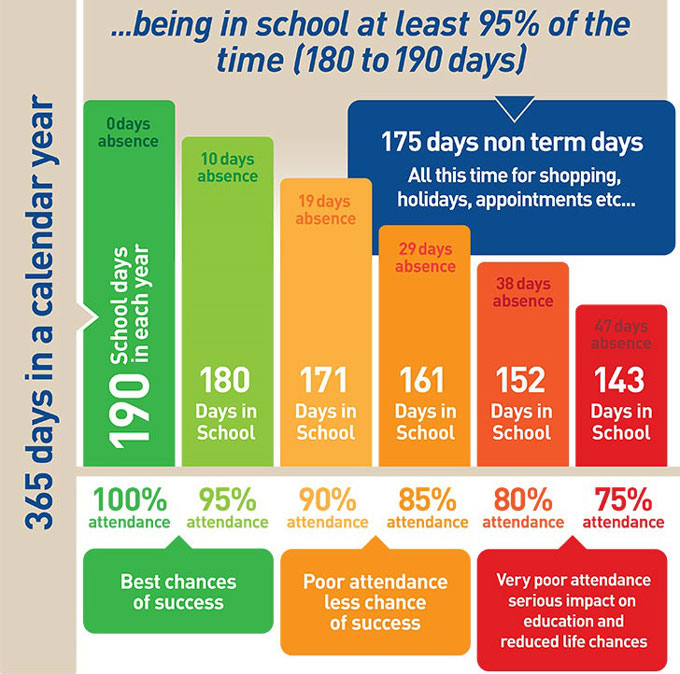
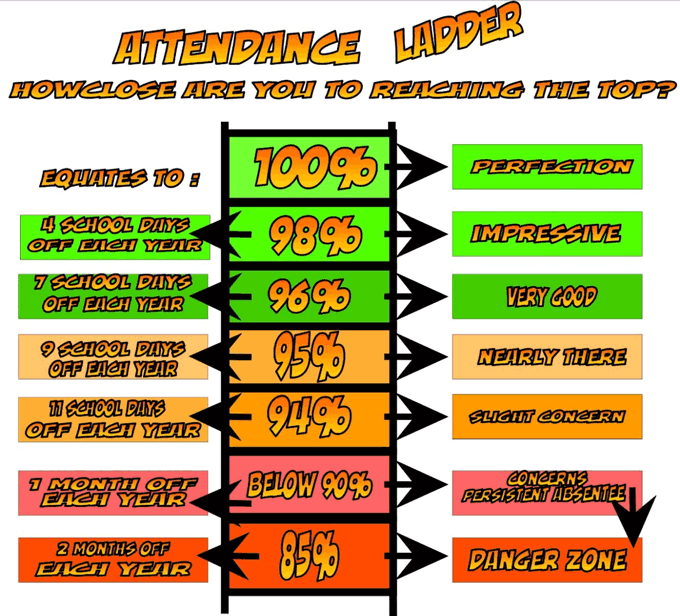
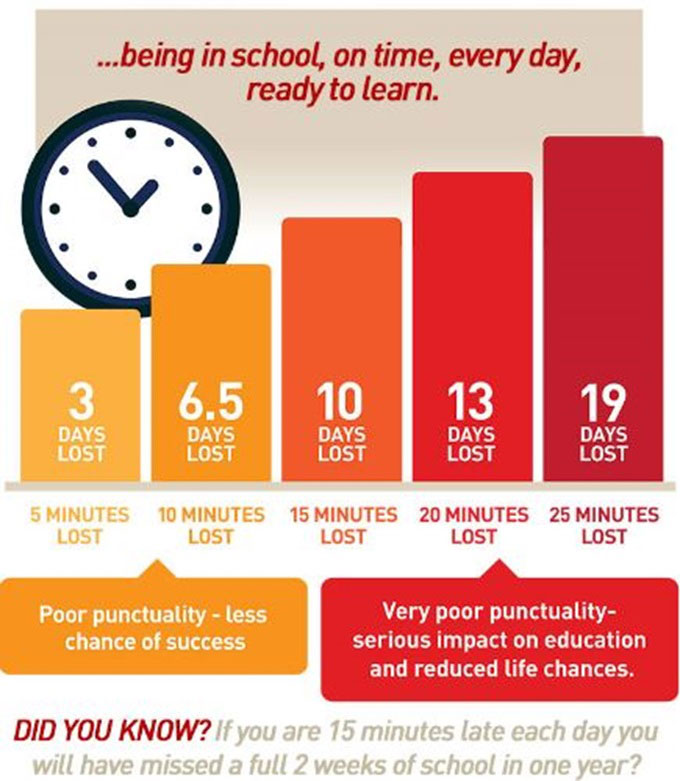
Illness
Occasionally students are too unwell to attend school. We will monitor and engage with parents as soon as a pattern of absence becomes apparent. When deciding whether or not your child is too ill to attend school. Ask yourself:
- Is your child well enough to carry out the activities of the school day? If not, keep your child at home and consult your GP as appropriate
- Does your child have a contagious condition that could be passed on to other children or staff? If so, keep your child at home
- Would you take a day off work if you had this condition? If so, keep your child at home
Common conditions
Most illnesses can be classified as one of a few minor health conditions.
Whether or not you send your child to school will depend on how severe you judge the illness to be. This guidance can help you to make that judgement. If you’re concerned about your child’s health, consult a health professional.
Cough and cold
A child with a minor cough or cold may attend school. If the cold is accompanied by raised temperature, shivers or drowsiness, the child should stay off school, visit the GP and return to school 24 hours after they’re feeling better. If your child has a more severe and long-lasting cough, consult your GP, who can provide guidance on whether the child should stay off school.
Raised temperature
If your child has a raised temperature, they shouldn’t attend school. They can return 24 hours after they’re feeling better.
Rash
Rashes can be the first sign of many infectious illnesses such as chickenpox and measles. Children with these conditions shouldn’t attend school. If your child has a rash, check with your GP or practice nurse before sending them to school.
Headache
A child with a minor headache doesn’t usually need to be kept off school. If the headache is more severe or is accompanied by other symptoms such as raised temperature or drowsiness, then keep the child off school and consult your GP.
Vomiting and diarrhoea
Children with these conditions should be kept off school. They can return 48 hours after their symptoms disappear. Most cases of vomiting or diarrhoea get better without treatment, but if symptoms persist, consult your GP.
Sore throat
A sore throat alone doesn’t have to keep a child from school. If it’s accompanied by a raised temperature seek medical advice.
Calendar
School Year (2024/25)
Start of term: 2 September 2024 (Inset1)
Half term holiday: 21 October 2024 - 1 November 2024
Christmas holiday: 23 December 2024 - 3 January 2025
Half term holiday: 17 February 2025 - 21 February 2025
Easter holiday: 7 April 2025 - 21 April 2025
Half term holiday: 26 May 2025 – 30 May 2025
Summer holiday: 24 July 2025
Exams
2019/20 Performance
Batchwood School - Latest Performance Tables (on GOV.UK)
2018 Exams Analysis
Results 2018
Batchwood School is exempt from the national floor standard for measuring Performance 8, however our Performance Score is still published and this data is statutory:
- Our published Progress 8 score for all students was -1.93 which is a similar figure to last year. However, the upper confidence interval which is a truer indicative measure for small cohorts is -1.29.
- Our Attainment 8 Average is 7.22 which is again a similar figure to last year.
- 0% of students achieved a good or strong grade in English and Maths (a good grade in 2018 is defined as a level 4 and a strong grade is a level 5).
- 0% of students achieved the English Baccalaureate (this means pupils who got a GCSE grade C or above in English, Maths, 2 sciences, a language and History or Geography).
Destinations
| Student | Post-16 provision |
|---|---|
| Student 1 | Springboard |
| Student 1 | Level 1 Sports |
| Student 2 | Springboard |
| Student 3 | Springboard |
| Student 4 | Level 1 Land Based Studies |
| Student 5 | Level 1 Animal Studies |
| Student 6 | Level 1 Carpentry & Joinery |
| Student 7 | Level 1 Sports |
| Student 8 | Level 1 Welding |
| Student 9 | Level 1 Electrical Installation |
| Student 10 | Level 1 Art & Design |
| Student 11 | Level 2 Art & Design |
| Student 12 | Springboard |
| Student 13 | Landmark |
| Student 14 | Springboard |
Context
It is also important to remember that our Students starting points at Key Stage 2 are well below the national average. This years cohort of Year 11 students have a Key Stage 2 APS of 21.00 (Roughly a national Curriculum level of a 3C) compared to a national average of 27.6 (national curriculum level of a 4B). This means that our students come to our school with a Key Stage 2 score which is 4 sub levels lower than the national average.
Results for Vulnerable Groups – Closing the Gaps
At Batchwood School we are focused on closing gaps in Attainment/Achievement for our disadvantaged pupils. We had 11 disadvantaged students at the End of Key Stage 4 (73%). Our focus on closing gaps has proved to be effective as the data below demonstrates:
- Pupil Premium (disadvantaged) students had a P8 score of -1.60 which is lower than the overall cohort, again the 95% upper confidence interval shows a P8 score for these students of -0.85.
- Disadvantaged students achieved an attainment 8 average score of 9.68 which is above the score of the average student (7.22).
How Disadvantaged Students succeed at Batchwood School
| Disadvantaged | All | Difference | |
| Progress 8 | -1.60 | -1.93 | 0.33 |
| Attainment 8 | 9.68 | 7.22 | 2.46 |
| Progress 8 English Element | -1.82 | -2.20 | 0.38 |
| Progress 8 Maths Element | -1.60 | -1.85 | 0.25 |
| Progress 8 E-bacc Element | -1.61 | -1.86 | 0.25 |
| Progress 8 Open Element | -1.45 | -1.86 | 0.41 |
| English Element Score | 2.36 | 1.73 | 0.63 |
| Maths Element Score | 1.09 | 0.80 | 0.29 |
| E Bacc Element Score | 1.91 | 1.40 | 0.51 |
| Open Element Score | 4.32 | 3.28 | 1.04 |
| Average EBACC APS Score | 0.61 | 0.44 | 0.17 |
So, we can see that there are only positive gaps in achievement for our disadvantaged students. We can see that in the Open Element Score, the disadvantaged students have one whole level higher than the general cohort.
Results for Low Prior Attainers
We have already seen in the context that we have a lot of students who come to Batchwood School with low prior attainment at Key Stage 2. 60% of our Year 11 cohort were defined as being low prior attainers at KS2. Nationally, this demograph of student has lower attainment/achievement than their middle/high attaining counterparts. It is testimony to the standards of teaching at Batchwood school, that this groups of students are not disadvtantaged by their low prior attainment. The table below demonstrates this:
How Low Attaining Students succeed at Batchwood School
| Low Attainers | Middle Attainers | Difference | |
| Progress 8 | -1.23 | -2.97 | 1.74 |
| Progress 8 Upper Confident Level | -0.40 | -1.96 | 1.56 |
| Average Attainment 8 Score | 8.06 | 5.96 | 2.1 |
| Average EBACC Score | 0.50 | 0.36 | 0.14 |
- The difference is progress 8 score for low to middle attainers is nearly 2 levels higher.
- The upper confidence level score for lower attainers is -0.40. Nationally the upper confidence level P8 score for SEMH students is -1.14. This is a significant difference.
Notes:
- Please note that the definition for low prior attainment at Key Stage 2 is students who are below the expected level of 4B.
- An upper confidence level is a measurement applied to small/untypical cohorts which is what we have at Batchwood school. The 95% confidence level is applied to this data by the DFE. Setting 95% confidence limits means that if you took repeated random samples from a population and calculated the mean and confidence limits for each sample, the confidence interval for 95% of your samples would include the parametric mean.
What you say about us
Every year we conduct a survey with all stakeholders on how well Batchwood School meets the needs of all learners and the issues you want us to be aware of.
The raw data is published as a pdf for both parent/carers and students. To highlight the real improvements made at Batchwood School we have compared responses from the November 2022 questionnaire to responses from the July 2021 questionnaire.
What parents/carers said about Batchwood School in November 2022 compared to what they said in July 2021.
 Parent Questionnaire (November 2022)
Parent Questionnaire (November 2022)
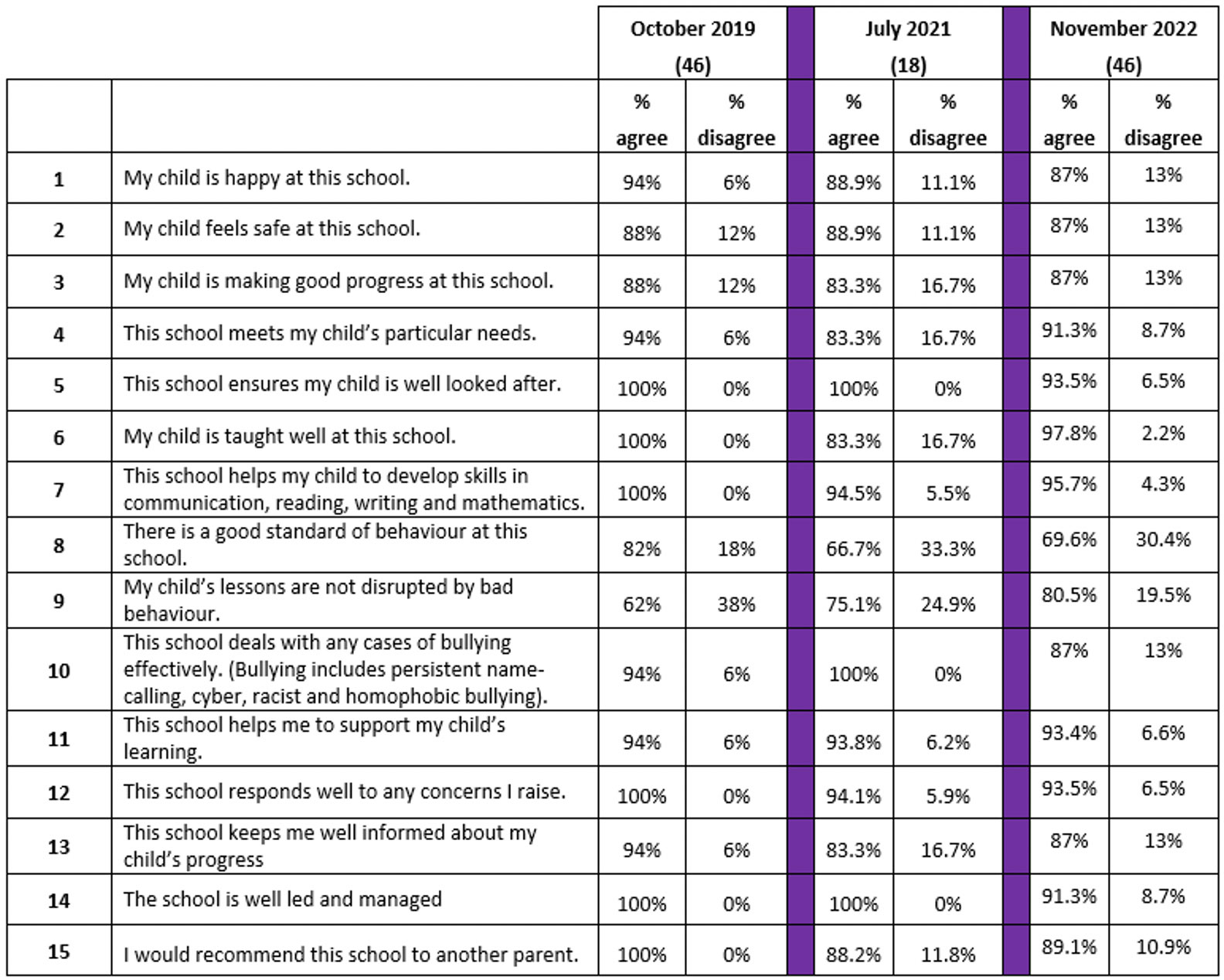
What students said about Batchwood School in November 2022 compared to what they said in July 2021.
 Student Questionnaire (November 2022)
Student Questionnaire (November 2022)
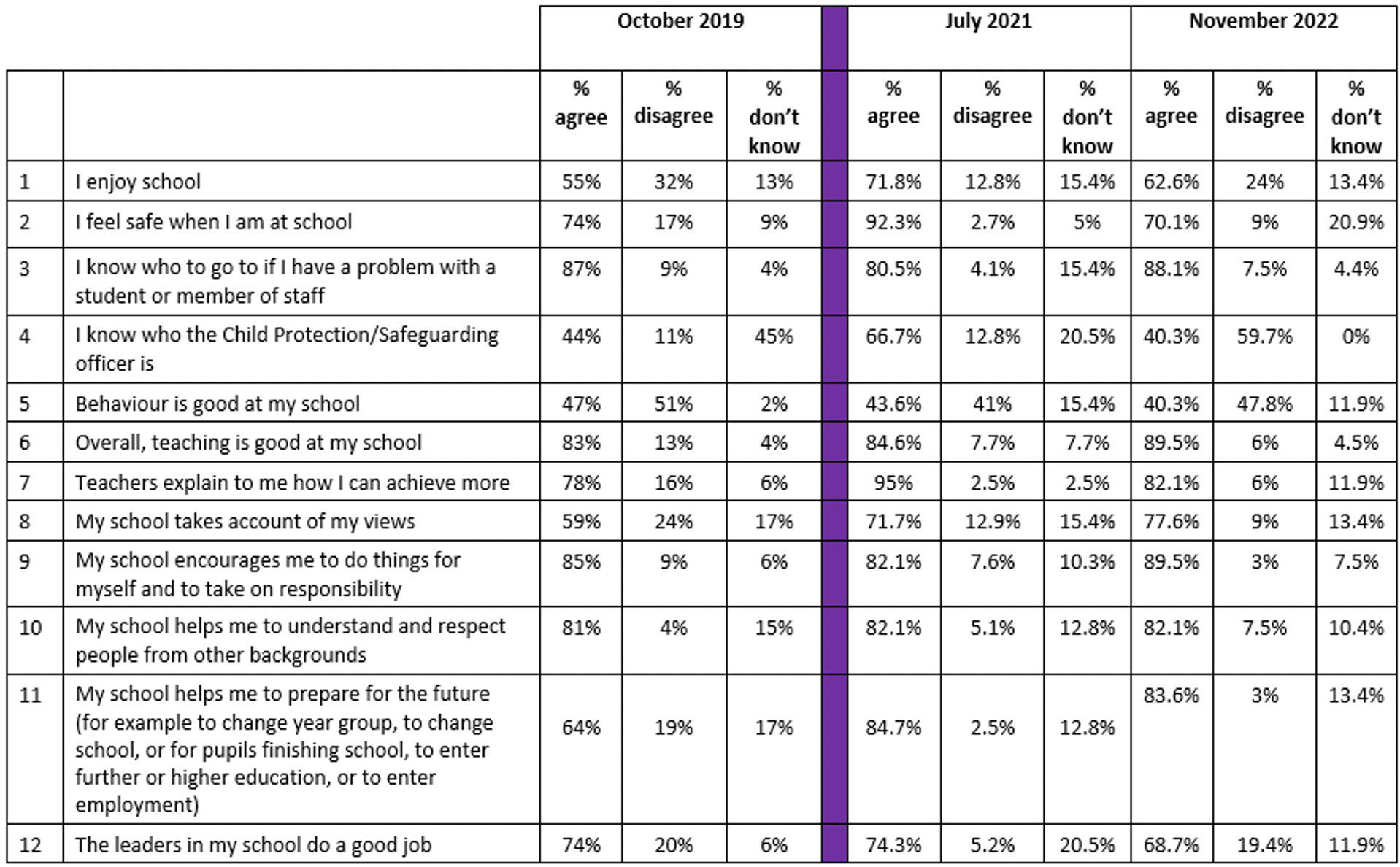
How are we going to make improvements?
Students report they feel lessons are taught better and that their learning in class is not disrupted in class. They feel that explanation of work in class is good and that they are prepared better for life after Batchwood.
Parents feel very positive in all but one of the questions of the questionnaire.
What we need to do to improve further
As a school, it is clear that there are times when a small minority of students display attitudes that contravene everything that Batchwood School stands for, namely it is: professional, purposeful, child-centered and kind. We have now put measures in place to ensure that all stakeholders are made aware of how we will tackle these issues from December 2022 onwards and fully expect to see a radical transformation in terms of these behaviours not occurring anymore at Batchwood School. Please see parent letter below.
Admission Arrangements
Batchwood School is one of four secondary SEMH schools in Hertfordshire. All students at Batchwood School have a Statement of Educational Needs or an Educational, Health and Care Plan (EHCP).
When a young person is being considered for admission to an SEMH school their case is heard at a Provisions panel which decides the type of school that would best meet the needs of that individual student. Following this a Placement panel meets to allocate an actual provision. This is normally the closest provision available, but alternatives can be suggested if the closest provision is at or over its capacity, or a parent/carer agrees to provide transport to their preferred choice.
Once a place has been allocated at Batchwood School, we arrange a visit for the student with parents/carers and quickly follow that up with a home visit. As soon as transport is organised a start date will be agreed between Batchwood School and the parents/carers.
Batchwood School primarily educates students from the Dacorum and Central Hertfordshire areas, with a few pupils from slightly further away and a few from neighbouring local authorities. This is different for girls, as Batchwood is the only provision within Hertfordshire that caters for girls.
Senior Leadership Team

Ross Whitaker Headteacher
Responsible for:
- School Performance
- Leadership and Management
- Strategic Direction
- School Ethos
- Student Outcomes

Jordan Williams Deputy Headteacher
Responsible for:
- Quality of Education
- Behaviour & Attitudes
- Attendance
- STEPs

Joanne Murphy Assistant Headteacher, SENDCo & Safeguarding Lead
Responsible for:
- Inclusion
- Safeguarding
- EHC Plans
- Transition
- CLA students
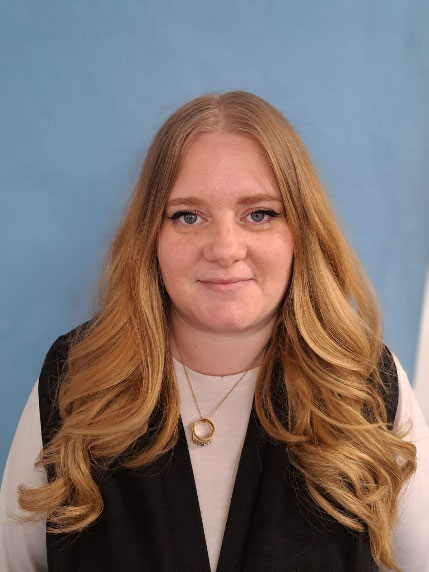
Katy Noble Assistant Headteacher
Responsible for:
- Personal Development
- RHSE
- Cultural Capital
- British Values
- Character Skills

Paul Billingham Assistant Headteacher
Responsible for:
- Staff training
- ITT
- Alternative Learning
- Community projects
Teaching and Support Staff
Core Subjects:
English Department
- Ms E McCabe (Head of English)
- Mrs K Noble (Assistant Headteacher & Assistant SENDCo, Head of Personal Development/RHSE & Head of Year 9)
- Mr M Noble (English & Business Studies teacher)
- Ms J Murphy (Assistant Headteacher, SENDCo & English teacher)
- Miss E Canning (Head of Interventions)
- Ms A Hakim (English TA)
- Mrs S Vekaria (1:1 Core Teacher)
Maths Department
- Ms N Malik (Head of Maths)
- Ms C Adam (Maths & English teacher)
- Ms E Corless (Maths TA)
Science Department
- Mrs K Gopaul (Exams Officer)
- Mr M Hurley (Science & Head of Year 8)
- Mrs D Parsonage (Science Technician & TA)
- Mrs N Horn (Science TA)
Nurture Department
- Mrs C Tedford (Nurture Teacher)
- Mrs E Patel (Nurture TA & Interventions)
- Mrs J Nash (Nurture TA)
- Mrs L Ambler (Nurture TA)
Foundation Subjects:
Creative Arts
- Ms C Maxen (Head of Art & Head of Year 11)
- Mrs K Morgan (Art TA)
- Mrs P Ead (Art TA)
- Mr M Pearson (Head of Music & Head of Careers)
- Ms B Hedges (Music TA)
- Mr P Billingham (Assistant Headteacher & Head of DT)
- Mrs S Cragg (Head of DT)
- Mrs L Marchant (DT TA)
- Ms C Wilson (Head of Food Tech)
- Ms E Sheldrake (Head of Hair & Beauty)
- Mr A Nolan (Foundation TA)
Sport & Leisure
- Mr A Kemp (Head of Boys PE)
- Mr R Whitaker (Headteacher, PE Teacher)
- Mr W Adam (Head of Sports and Fitness)
- Ms R McShane (Head of Girls PE)
- Mr G Couling (Head of Forest School)
- Mrs A Lowth (Forest School TA)
Cover Supervisors
- Mrs N Waters
Catering Staff
- Mr C Dawes (Head Chef)
- Mrs M Smith (Catering Assistant)
- Mrs J Kwok (Catering Assistant)
Pastoral & Wellbeing Staff
- Mr J Bell (Head of Behaviour)
- Mrs M Robin (Deputy DSL & SENDCo Assistant)
- Mrs S Smiles (Attendance Officer)
- Ms A Hussain (Student Wellbeing)
- Mrs J Bell (Student Wellbeing)
- Ms K Pauling (Student Support & Mentor)
Administration Team
- Mrs M Spokes (Office Manager & HR)
- Ms J Harrison (Finance Manager)
- Mrs K Harrison (Data Manager & GDPR)
- Ms B McKeever (Admin Assistant)
- Ms D Hawkes (Finance Assistant)
- Mrs M Pardey (Admin Assistant)
Site Staff
- Mr C DeBruin (Site Manager)
- Mr G Marchant (Assistant Caretaker)
Head Student
The position of Head Student at Batchwood School is a very special and important one. The Head Student represents his/her peers across the entire school both as figureheads and in a practical way working to improve their school.
The posts are open to any Year 11s who wish to put themselves forward to be Head Student. Those applying have to write to the Headteacher setting out why they would make a strong Head Student, and what they will do to help improve their school during their year in post.
For 2023-2024 our Head students are Anthony Cuddy and Cordelia Noonan.

“I would love to be a head student because I love the school and can make it a better place and help all years, especially the year 7’s feel safe. I also attend all my lessons. Students and staff like me and would also agree that I would be an excellent head student.” Anthony Cuddy
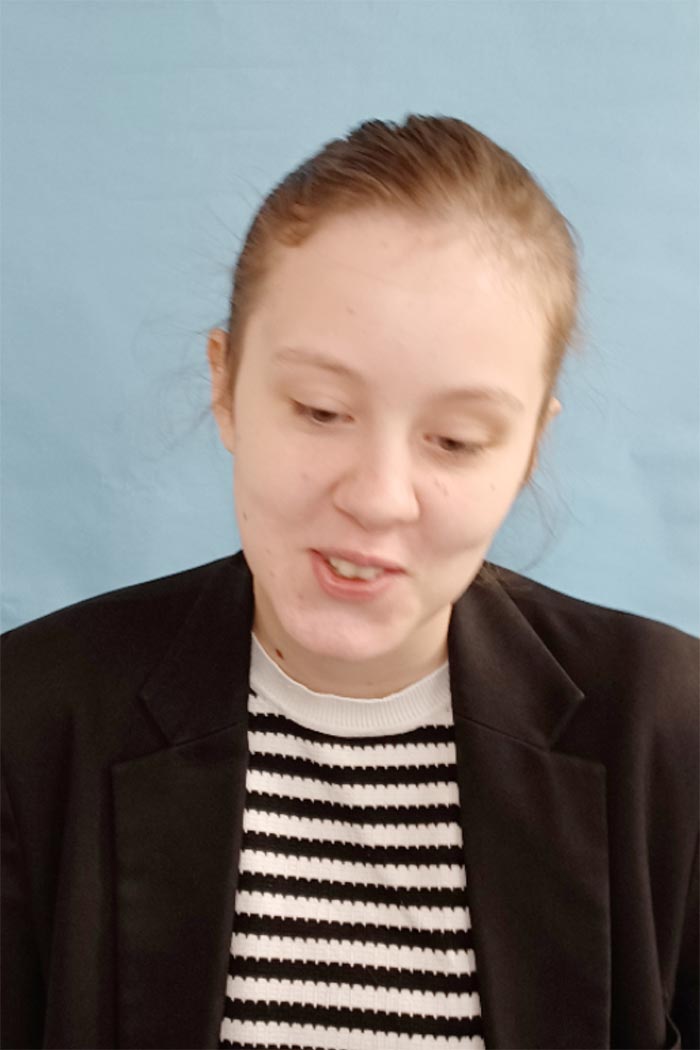
“My attendance is excellent and I work really hard to go to all my lessons. I get on well with staff and some of the students and I want to do a good job for the other students. Whilst I find social situations difficult, I believe this role will help challenge me and hopefully give me some confidence for the future.” Cordelia Noonan
Governors

Dawn Laverick-Brown: Chair of Governors
Welcome to the Governors’ section of the Batchwood School website which I hope you will find interesting and informative. This section gives a broad outline of the role of the Governors, how we go about fulfilling our responsibilities and who we are.
Role of the Governing Body
The Department for Education states that Governing Bodies -
“….are the strategic leaders of our schools and have a vital role to play in making sure every child gets the best possible education. For maintained schools this is reflected in the law, which states that the purpose of maintained school governing bodies is to ‘conduct the school with a view to promoting high standards of educational achievement at the school’.
In all types of schools, governing bodies should have a strong focus on three core strategic functions:
a. Ensuring clarity of vision, ethos and strategic direction;
b. Holding the Headteacher to account for the educational performance of the school and its students; and
c. Overseeing the financial performance of the school and making sure its money is well spent.
These functions are reflected in regulations for maintained schools that came into force in September 2013.”
We have a strategic role in the development of the school but are not involved in the day-to-day management - that is the role of the Headteacher. We are accountable to the wider community for the conduct of the school and in turn hold the school leadership group to account for raising standards and ensuring every child fulfills their potential. We are a diverse group of people with a wide variety of skills and experience which, coupled with our knowledge of the school, we use to challenge and support the leadership group in their work.
The Governing Body
The Local Governing Body consists of 12 Governors:
- 1 Staff Governor elected from the Batchwood staff
- 2 Parent Governors elected from the community of parents, or individuals exercising parental responsibility, at Batchwood School
- 7 Co-opted Local Governors appointed from within the local community,
- 1 Local Authority Governor who is a representative of the Local Authority. They are not a delegate of the Local Authority and, as such, cannot be mandated to take any particular course of action or vote in a specific way at meetings.
- The Headteacher is also an ex officio Governor
The Full Governing Body meets 6 times a year. At each meeting we receive a report from the Headteacher and minutes from the various committees. Other items are discussed or approved at specific times of the year for example exam results, plan for school improvement and budget.
The Local Governing Body is supported by three main committees which also meet once each term:
- The Resources Committee is concerned with budget and finance, premises and health and safety as well as staffing, appraisal and training.
- The Curriculum, Achievement and Well-being committee (CAW) deals with standards, curriculum, pastoral care and student well-being, SEND and Pupil Premium.
All Governors are members of at least one of the committee. We also attend public events such as secondary transfer evening, music concerts, the annual Awards Evening, prize-giving assemblies and PTCs. Please come and talk with Governors while you are at these events.
In addition, each Governor is linked to a curriculum or specific area of school such as Child Protection, Safeguarding, Core provision, Reading areas. In this role Governors regularly come into school to meet with staff and students.
Governing Body membership list (2023-2024)
| Name | Governor Type | Term |
|---|---|---|
| Dawn Laverick-Brown (COG) | Co-opted | 17/11/23 |
| Richard Hattrell (VCOG) | Co-opted | 31/05/23 |
| Ross Whitaker (Headteacher) | Ex Officio | 31/12/21 |
| Dougal Hutchison | Local Authority | 31/01/25 |
| Karen Smith | Associated governor | 31/01/23 |
| Caroline Bradley | Parent governor | 31/09/25 |
| Richard Gold | Parent governor | 12/12/27 |
| Laura Ansell | Co-opted | 12/12/27 |
| Sally Griffiths Plunkett | Co-opted | 12/12/27 |
| Sarah Abbott | Co-opted | 12/12/27 |
| Mark Hurley | Staff governor | 31/05/25 |
Clerk to the Governors: Mr R Blythe
Ofsted
The school has continued to improve. We have worked very hard on refining the Quality of Education for all our students and making sure that they leave Batchwood School having achieved everything and more, than they would have achieved elsewhere, and are able to access the course of their choice at post-16.
We are determined in our drive to make a difference and ensuring all students have the best outcomes to thrive outside of Batchwood School.
Ofsted have told us that our students enjoy learning in a wide range of subjects. The importance of keeping safe, maintaining healthy lifestyles and having respectful relationships are regularly enforced in different situations. As a school, we are equally ambitious for students’ academic achievement as we are for their social, emotional and mental health development. Behaviour is good and bullying is certainly not tolerated. Safeguarding arrangements are effective and the leaders of the school have acted decisively to continue to improve the school since 2018.
So what is next for Batchwood School?
- Continue to review what is taught, why it is taught and when it is taught so that the curriculum is clear, cohesive and robust
- Work closely with students and families to improve attendance so that more time is spent in school and that we continue to support all students to achieve their very best by the time they leave at the end of Year 11
Policies
If you require a paper copy of any of our policies, please contact the school office.
Learning
Ethos & Attitudes
 EA1 - Student Code of Conduct
EA1 - Student Code of Conduct EA2 - Batchwood Behaviour Management
EA2 - Batchwood Behaviour Management EA3 - Reducing The Need For Restrictive Interventions
EA3 - Reducing The Need For Restrictive Interventions EA4 - Exclusion Policy
EA4 - Exclusion Policy EA5 - Covid 19 Addendum Behaviour Management (coming soon)
EA5 - Covid 19 Addendum Behaviour Management (coming soon) EA6 - Attendance
EA6 - Attendance EA7 - Countering Bullying
EA7 - Countering Bullying EA8 - Safeguarding Child Protection Policy
EA8 - Safeguarding Child Protection Policy EA8a - CLA
EA8a - CLA EA9 - Home School Partnership
EA9 - Home School Partnership EA10 - Relationships, Sex and Health Education Policy
EA10 - Relationships, Sex and Health Education Policy EA11 - Drug Education
EA11 - Drug Education EA12 - SMSC Policy
EA12 - SMSC Policy EA13 - Low Level Concerns Policy (to be read in conjunction with Safeguarding Policy EA8)
EA13 - Low Level Concerns Policy (to be read in conjunction with Safeguarding Policy EA8)
Leadership & Management
 LM1 - Staff Pay Policy
LM1 - Staff Pay Policy LM2 - Staff Appraisal Policy
LM2 - Staff Appraisal Policy LM3 - Directed Time Policy
LM3 - Directed Time Policy LM4 - School Trips Visits
LM4 - School Trips Visits LM5 - Schedule of Financial Delegation
LM5 - Schedule of Financial Delegation LM6 - Online Safety and IT Users
LM6 - Online Safety and IT Users LM7 - Inequality Action Plan
LM7 - Inequality Action Plan LM8 - Single Equality
LM8 - Single Equality LM9 - Health and Safety Policy
LM9 - Health and Safety Policy LM10 - Charging Remission
LM10 - Charging Remission LM11 - Critical Incident Recovery
LM11 - Critical Incident Recovery LM12 - Data Protection (including Privacy) Policy
LM12 - Data Protection (including Privacy) Policy LM13 - Insurance
LM13 - Insurance LM14 - Lettings
LM14 - Lettings LM15 - School Based Complaints
LM15 - School Based Complaints LM16 - Health, Attendance and Leave
LM16 - Health, Attendance and Leave
HR Policies
 HR1 - Capability
HR1 - Capability HR2 - Code of Conduct for Employees
HR2 - Code of Conduct for Employees HR3 - Grievance
HR3 - Grievance HR4 - Harassment and Bullying
HR4 - Harassment and Bullying HR5 - Safer Recruitment
HR5 - Safer Recruitment HR6 - Whistleblowing
HR6 - Whistleblowing HR7 - Disciplinary (inc grievance)
HR7 - Disciplinary (inc grievance) HR8 - Probationary Procedure for Support Staff
HR8 - Probationary Procedure for Support Staff HR9 - Alcohol and Drugs at Work
HR9 - Alcohol and Drugs at Work HR10 - Maternity Leave
HR10 - Maternity Leave HR11 - Shared Parental Leave (Birth) Policy
HR11 - Shared Parental Leave (Birth) Policy HR12 - Shared Parental Leave (Adoption) Policy
HR12 - Shared Parental Leave (Adoption) Policy HR13 - Paternity Policy
HR13 - Paternity Policy HR14 - Flexible working
HR14 - Flexible working
School Procedures
 SP1 - Anti-Bribery Policy
SP1 - Anti-Bribery Policy SP2 - Business Continuity Plan
SP2 - Business Continuity Plan SP3 - Working Practices for all Staff
SP3 - Working Practices for all Staff
Exams
 EX1 - Exams Procedure
EX1 - Exams Procedure EX2 - Exam Appeals Procedure
EX2 - Exam Appeals Procedure EX3 - Exam Contingency Plan
EX3 - Exam Contingency Plan EX4 - Exams Malpractice
EX4 - Exams Malpractice EX5 - Cyber Attach Policy (Exams)
EX5 - Cyber Attach Policy (Exams) EX6 - Recognition of Prior Learning Policy
EX6 - Recognition of Prior Learning Policy
Other Policies
 OP2 - Food Safety Policy – School Kitchen
OP2 - Food Safety Policy – School Kitchen OP3 - First Aid Policy
OP3 - First Aid Policy OP4 - Damages – this is incorporated in the C&R Policy (LM10)
OP4 - Damages – this is incorporated in the C&R Policy (LM10) OP5 - Students with Medical Conditions
OP5 - Students with Medical Conditions OP6 - Students unable to access school with medical conditions
OP6 - Students unable to access school with medical conditions OP7 - Laptop Loan Policy (coming soon)
OP7 - Laptop Loan Policy (coming soon) OP8 - Careers Policy
OP8 - Careers Policy OP9 - Provider Access Policy (To be read in conjunction with Careers Policy No OP8)
OP9 - Provider Access Policy (To be read in conjunction with Careers Policy No OP8) OP10 - Intimate Care Policy
OP10 - Intimate Care Policy OP10a - Appendix to Intimate Care Policy (Parental Agreement)
OP10a - Appendix to Intimate Care Policy (Parental Agreement) OP11 - Wellbeing Policy
OP11 - Wellbeing Policy
 Accessibility Action Plan
Accessibility Action Plan Emergency Response Plan (no contact numbers)
Emergency Response Plan (no contact numbers) CCTV Policy (coming soon)
CCTV Policy (coming soon) Instrument of Governance
(coming soon)
Instrument of Governance
(coming soon)
Privacy
Pupil Premium
Purpose: The government provides academies and schools with additional funding to help reduce the inequalities and gaps in attainment between those students who are on free school meals (or have been in in the last 6 years) and their peers. This funding is called the Pupil Premium.
Every academy and school can select how they choose to use their Pupil Premium allocation, as they are best placed to assess what additional provision should be made for students. Pupil premium funding was first introduced in April 2011. It is allocated to pupils who are currently known to be eligible for free school meal or have received free school meals in the last six years.
Use of the Pupil Premium at Batchwood School
At Batchwood School we are dedicated to improving outcomes for all young people regardless of socio-economic background or level of need. Our aim is for every young person to have equal opportunities and access to outstanding Teaching and Learning. The young person is at the heart of what we offer and a priority is the emotional and social well-being of all our young people.
Since April 2011, central government has allocated funding to schools called ‘Pupil Premium Grant’ (PPG). The funding has been introduced to help close the gap in attainment and improve the quality of teaching and learning for vulnerable groups of children.
The groups identified by the Government for PPG are:
- Children of parents in the services
- Those accessing Free School Meals now and, those who have in the past 6 years.
- A higher amount called ‘Pupil Premium Grant Plus’ is awarded to ‘Looked After Pupils’ (referred to as pupils in receipt of Child Arrangement Orders or CAO), although the Local Authority in which the pupil resides maintains this fund and allocate according to their own arrangements.
For Hertfordshire Schools the Pupil Premium Grant Plus (PPG Plus) money awarded to the school to boost the provision for:
- Children Looked After
- Post-Looked After Children (adopted children)
PE & Sports Grant
Schools receive PE and sport premium funding based on the number of pupils in years 1 to 6. In cases where schools don’t follow year groups (for example, in some special schools), pupils aged 5 to 10 attract the funding. In most cases the government determines how many pupils in the school attract the funding using data from the January census.
The documents below detail how this money was spent and its impact as well as plans for spending this academic years allocation of funds.
All these figures are subject to slight variation, admissions change, family circumstances change and pupils become eligible for pupil premium during the academic year.
Measuring the impact
Batchwood School measures the impact of the spend through the careful and constant analysis of data including attendance, examination outcomes, personal social and emotional development and successful onward transition. The school will review the PP spend in February of that year following scrutiny of the December mock examination results in order to provide timely, bespoke interventions.
Our vision goes well beyond simply narrowing the gap between those who are economically advantaged and those who are not. We are determined to ensure that all students, irrelevant of background or prior attainment, have the qualifications, emotional resilience and attributes necessary to be successful and to thrive in society beyond school age.
Rationale for using the PP grant based on research
Behind every decision we make as a school, there has to be an intelligent rationale. What does the best research tell us and how can we use this research, and its findings, to identify the right strategies to best support all our students for maximum impact for medium cost.
The Sutton Trust is an educational charity in the United Kingdom which aims to improve social mobility and address educational disadvantage.[1] The charity was set up by educational philanthropist Sir Peter Lampl in 1997 and since then has undertaken over 150 research studies[2] and funded a wide range of practical programmes to support young people in early years, primary and secondary school, and in accessing higher education and the professions.
[1] https://www.suttontrust.com/
[2] https://www.suttontrust.com/our-research
The Sutton Trust have researched the most effective strategies used throughout all schools in raising attainment for disadvantaged students. Below is a summary of their findings:
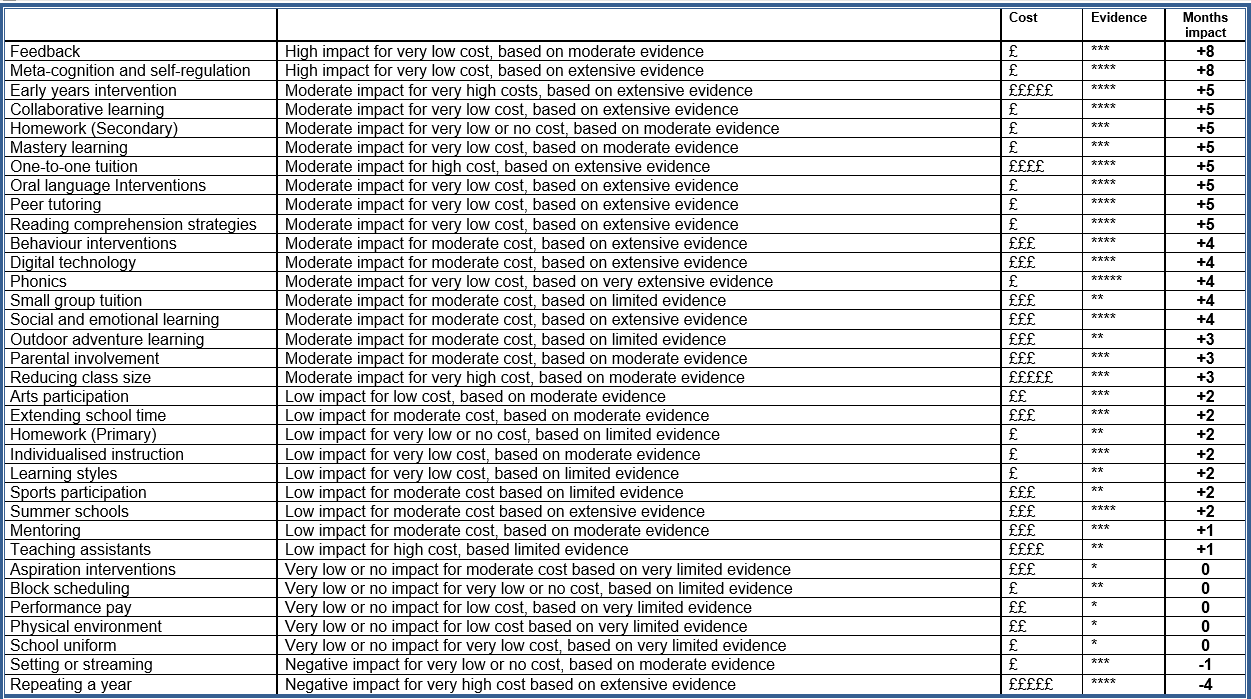
The School Day
Monday – Thursday
| Activity | Time |
|---|---|
| Registration | 08:50 | Lesson 1 | 09:20 |
| Lesson 2 | 10:00 |
| Break | 10:40 |
| Lesson 3 | 11:00 |
| Lesson 4 | 11:40 |
| Lunch | 12:20 |
| Lesson 5 | 13:00 |
| Lesson 6 | 13:40 |
| Form Time | 14:20 |
| Home | 14:40 |
Friday
| Activity | Time | Registration | 08:50 |
|---|---|
| ‘House Assemblies’ | 09:10 |
| Lesson 1 | 09:20 |
| Lesson 2 | 10:00 |
| Break | 10:40 |
| Lesson 3 | 11:00 |
| Lesson 4 | 11:40 |
| Lunch | 12:20 |
| Enrichment | 13:00 |
| Home | 14:00 |
Safeguarding
In England, the law states that people who work with children have a duty to keep them safe. It is my role as the Designated Safeguarding Lead, and that of our team of Deputy DSPs, to ensure this is happening by all staff in Batchwood School.
This safeguarding legislation is set out in The Children Act (1989) and (2004). It also features in the United Nations Convention on the Rights of the Child (to which the UK is a signatory) and sets out the rights of children to be free from abuse. The Government also provides guidance in its documents Working Together to Safeguard Children (2018) and Keeping Children Safe in Education (2019).
At Batchwood School, safeguarding means:
- Providing trustworthy staff members that students can come to with any concerns
- Protecting students from maltreatment
- Preventing impairment of students’ health or development
- Ensuring that students are growing up in circumstances consistent with the provision of safe and effective care
- Taking clear actions to enable all students to have the best outcome
At Batchwood, we take Safeguarding seriously because we know it can have a huge impact on learning. With this in mind, we have policies in place for safeguarding and child protection in order to:
- Protect students from harm and abuse
- Enable staff and volunteers to know what to do if they are worried
We believe that everybody is responsible for safeguarding and we take great pride in this work.
In the school’s Pastoral Hub, we work together to provide a safe space for students to come to with any concerns or worries they may have. We always record these accurately and act on them when needed in a prompt manner. In The Hub you can find myself (Assistant Headteacher and SENCo), Sally Smiles (Deputy DSL and Attendance), Robin Hunter (Assistant Psychologist) and Marg Robin (Assistant to SENCo). All staff in The Hub, along with Ross Whitaker (Headteacher) are fully trained DSPs and we endeavour to deal with all issues in a confident and discreet manner.
Preparation for Learning
Regular and consistent home learning fully supports Batchwood Schools ethos of “Make Everyday Count” because we believe it:
- provides opportunities for all students to achieve their potential
- promotes a positive ethos and culture in which learning and achievement can flourish, excel and be rewarded
- prepares students for life so that they can confidently take their place in a rapidly changing society as motivated citizens with creative and enquiring minds
Purpose of home learning
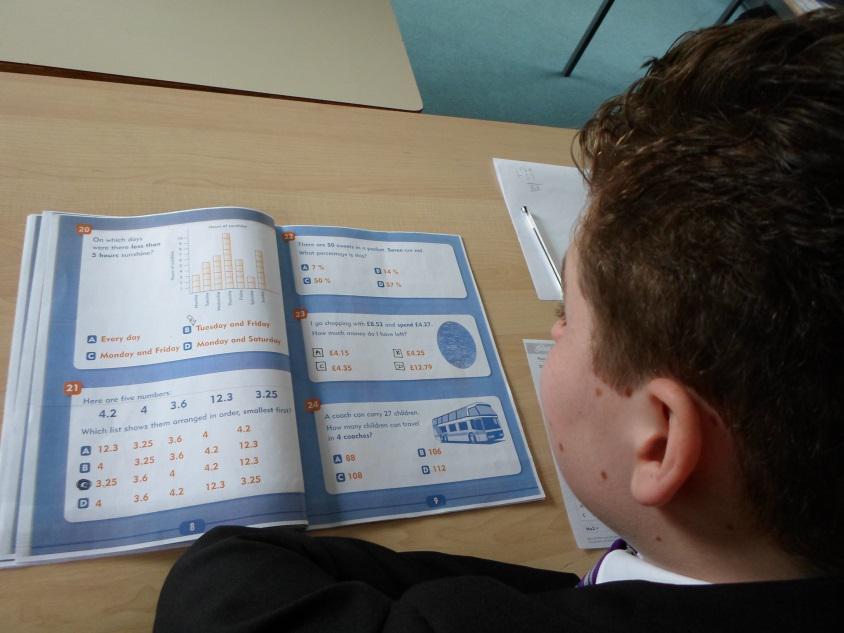
Home learning will be regularly set and marked in order to:
- provide an opportunity for students to deepen their learning and develop their interest and enthusiasm for the subject
- consolidate and reinforce students‘ skills, knowledge and understanding
- help students to develop the habits, motivation, confidence and skills required to become independent and lifelong learners
- help students to meet particular demands, such as the completion of GCSE coursework
- helps parents to become involved in their child‘s learning and work and help keep them informed about their child‘s progress
Expectations of home learning
We expect students to:
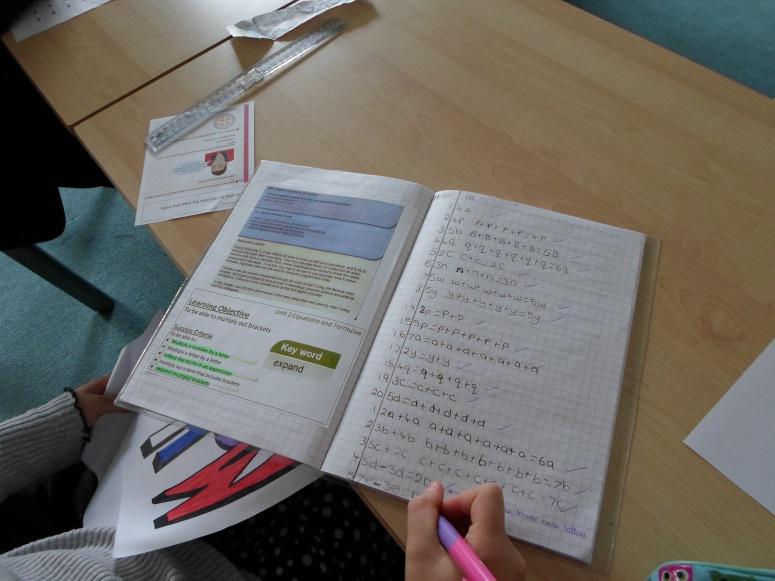
- settle down quickly at tutor time at the end of every day
- spend the appropriate time to complete their home learning to the best of their ability
- be prepared to work collaboratively with others to embed the learning
- hand in their home learning in class on the day it is due, or to the teacher as soon after as possible if they are absent on the day
We expect teaching staff to:
- set home learning frequently and regularly, mark it promptly with comments and targets that will help students progress if acted upon.
- Provide the home learning task to the relevant tutor with clear guidance
- set meaningful home learning activities that will help students build connections between what they have learned in individual lessons.
- set activities that are differentiated, inclusive, appropriate, challenging, and which vary in type and style.
- sanction students who fail to complete home based learning adequately or who fail to hand it in on time
We expect tutors to:
- check that students have appropriate home learning in the relevant subject for each night
- check home learning is completed and provide guidance to students who need it
We expect parents to:
- talk through home learning completed each night and ask relevant questions
- at KS4, provide their child with a suitable learning environment in which to complete their home based research activities, without distractions
- demonstrate a real interest in the learning of the day
Careers Advice and Guidance
At Batchwood School, we offer careers guidance that seeks to engage and challenge each learner to think about their skills, interests and abilities. We aim to provide all students with valuable careers knowledge, and to help each student establish their own future career path. It is extremely important to us that the students feel that the guidance on offer is relevant and useful to them, so that they can be confident and successful now, and for many years to come. Having the Quality in Careers Award will help students to know that we value their interests and also their future.
CSW Investors in Careers – The Quality in Careers Award 2022
The Quality in Careers Standard Award by CSW Investors in Careers has been achieved through completing a detailed assessment of the careers programme and careers guidance at Batchwood School. This can only be awarded if all criteria has been attained by the education provider. The Quality in Careers Standard is a nationally recognised careers award. Having this award ensures that the quality of the Careers programme delivered, is to a high standard and that students are receiving appropriate careers information & guidance.
View our certificate that shows we are fully meeting all the accreditation criteria incorporating the Gatsby Benchmarks.
Feedback from CSW Investors in Careers:
- Strong Senior Management and Governor support and a whole school approach to CEIAG
- A dedicated Careers Leader who works well with other staff and external partners to deliver an effective careers programme
- Good use of the Gatsby Benchmarks to review the careers programme and a philosophy of continuous improvement
- A detailed and well-written Careers Policy
- An excellent staff training programme for careers work with effective feedback and follow-up

We firmly believe that it is our role to ensure students are informed, have opportunities to reflect, have access to a wide range of careers opportunities and are thus able to make informed choices about each step of their career. In this regard we are building on a history of successfully meeting the needs of all our students.
On a practical level we work closely with Hertfordshire Services for Young People (formerly YC Hertfordshire) to ensure we ‘tap into’ students’ interests to find the right work experience placement, college course and environment for success. We liaise with professionals, parents and, most importantly, our students to determine the next step.
Most of our students have experienced much change in their lives and as a result they struggle to cope with any change. To address this, we try to source every available opportunity to prepare them for this change. This includes multiple taster days and supported visits during which we share all the relevant information on every student’s strengths and weaknesses with our professional colleagues. We try to involve our parents in this as much as possible, so they can support the management of impending significant change.
For all students, we provide access to a dedicated careers area, situated within the school, access to personal guidance from an independent YC Hertfordshire Careers Advisor and provide students with a range of careers information and advice through the whole-school curriculum.
In addition, aiming to widen their career horizons and support their careers journey, we provide opportunities from Year 9 onwards as students make decisions about what Key Stage 4 options to take, thereby starting the process of firming up on their areas of interest and possible future education, training and career paths.
Learning Pathway
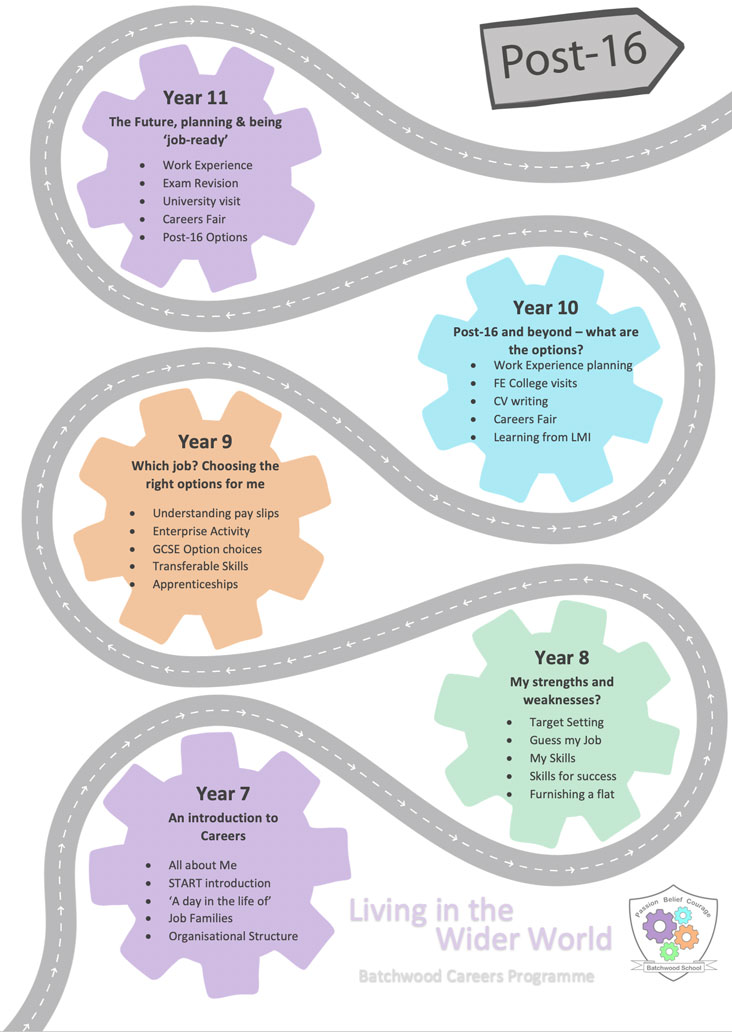
 Living in the Wider World - A Guide for Parents and Carers
Living in the Wider World - A Guide for Parents and Carers
Work Experience
All students in Year 11 engage in work experience for a week during the Spring Term. Students have scope to seek out their own placements or select those provided by our partners, Services for Young People. The process of finding a placement begins in the Summer Term of Year 10 when all students have a personal interview with the school Services for Young People Advisor, building on the discussions that they have had with their Form Tutor. The form Tutor helps the student to complete all the necessary paperwork for this venture and will visit the student on their placement. This is an excellent opportunity for students to engage in work, build their skills and consider their personal career pathway.
If you have any queries, would like to assist with a careers event or to share your own career journey with our students, please contact us by emailing our
Careers Lead: Mark Pearson via .(JavaScript must be enabled to view this email address)
Upcoming events to watch out for:
- Year 7 – 11 motivational Speakers
- Year 9 – Options evening
- Year 10 – work experience choices
- Year 11 – Curriculum Vitae writing
- Year 11 – Work Experience week
- Year 11 – Further Educational College visits
- Motivational speakers to inspire our students throughout the year
- ABC Careers newsletter
Careers Policies
Please visit our policies page to view our Careers Policy (59) and Provider Access Policy (59a).
Education or Training Providers
Our provider access statement sets out the school’s arrangements for managing the access of education or training providers to pupils at the school for the purpose of giving them information about what the provider offers.
School Council
The School Council comprises of six students, two from each house as well as the head student(s). The council is responsible for overseeing particular projects and providing extended leadership to the school.
Elections for the School Council team are held at the beginning of the Autumn term. The team meet on a monthly basis and works to an agenda drawn up by themselves and the member of staff responsible for facilitating the School Council. If you would like to become involved in having yours and your peers voice heard, please speak to your House representative or Mr Hurley. We would love to hear from you!
Achieving success
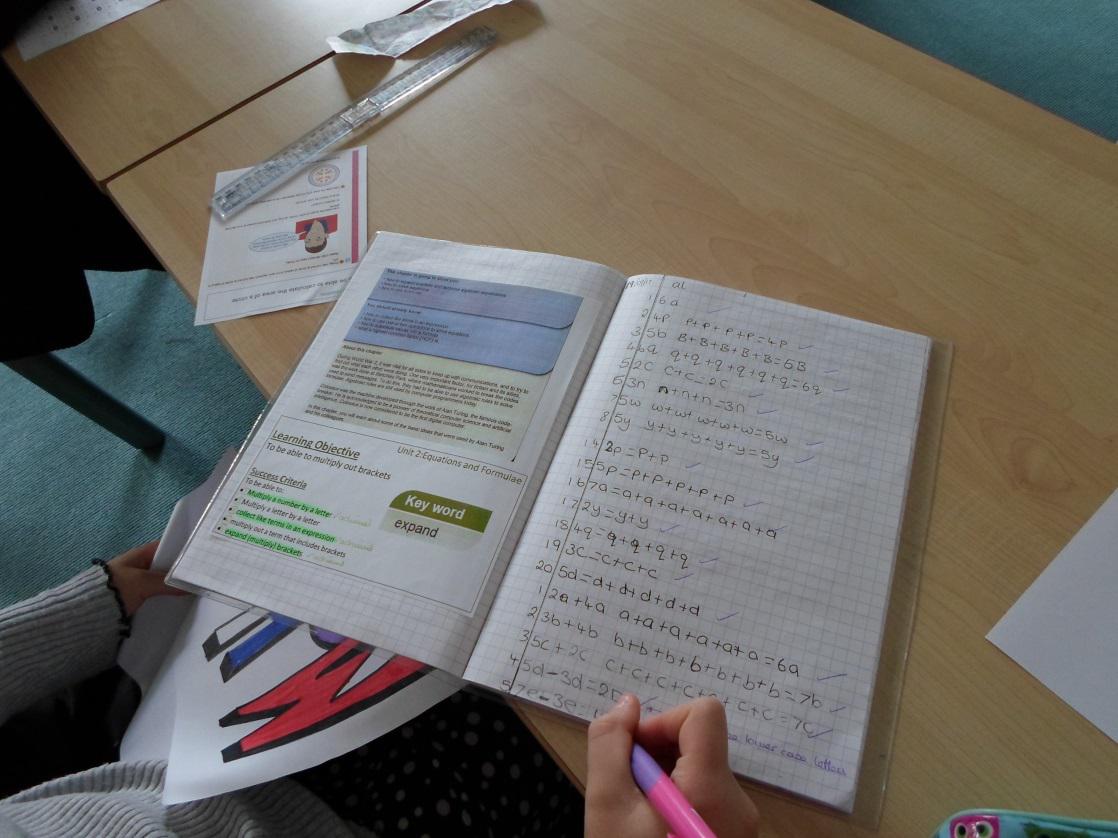 Recognising and rewarding achievement is central to our philosophy of success and supports our core value of consideration for learning.
Recognising and rewarding achievement is central to our philosophy of success and supports our core value of consideration for learning.
We have a very strong reward system which celebrates all levels of success and encourages students to do their very best. A mentor is allocated to each student which further supports their learning and monitors their progress.
We provide a half termly report to parents/carers on student progress and exceptional effort is rewarded with a special letter of congratulations from the Headteacher.
Throughout the year, students receive credits and merits for excellent work and behaviour which contribute to reward trips and other prizes at the end of each term. We also monitor attendance closely and, each term, special prizes are given to students for exceptional attendance and for the best attending form. At the end of the year a special celebration day is held where we say farewell to year 11 as well as celebrating subject awards, and pastoral awards. This is where we publically recognise student achievement through a variety of awards and trophies.
To further promote and celebrate success, staff nominate students on a termly basis for a Roll of Honour board in each subject area of the school. Students also receive congratulatory letters for their achievement.
Our rewards take many forms; it is important that effort and achievement of all kinds are treated as noteworthy. Staff send postcards home when a student has achieved 10 merits and if a student exceeds their target grade, or make exceptional progress, a letter from the Headteacher is sent home. We encourage students to take real pride in their own achievements and to respect the achievement of others.
More Able Students
Able, Gifted and Talented Students
At Batchwood School we believe that all children should be challenged and inspired to achieve the best they can.
We understand the importance of creating a curriculum tailored to the individual needs of our pupils to motivate them to fulfil their potential. Gifted and Talented pupils are those who have been identified as showing an exceptional ability in one area or across different subjects. It might be that they are talented cartoonists, demon drummers or skilled chefs. Whatever their unique ability they have been identified by teachers who will stretch and stimulate them so they can gain the highest possible level.
This year we have seen the implementation of an Able, Gifted and Talented Programme, run by Mrs K Vincent offering a variety of activities designed to expand and inspire these students to be the very best. This programme includes visiting theatres, joining up with students from Falconer School to watch Macbeth at the Watford Vue cinema. .
There is not one single definition of what an Able, Gifted and Talented child is, however, at Batchwood we believe that we must strive to provide these pupils with the opportunities to develop and demonstrate their abilities both within and outside of the curriculum.
Our SEND offer at Batchwood School
Welcome to our SEND pages, providing information on the support we provide for students who have Special Educational Needs or Disabilities. We hope you will enjoy reading about the variety of ways in which Batchwood School is able to support students with additional needs to reach their full potential.
At Batchwood School we believe that every child matters and during their journey with us we will ensure that they are happy, safe and enjoy their learning. If at any time problems arise, they will be dealt with promptly and in partnership with students and their parents/carers.
We are committed to ensuring that all students make good progress. This may involve providing additional small group support before and after school plus additional help within the School day, individually or in a small group, focusing on individual needs.
We offer a warm, nurturing learning environment to all our students and our team of staff is dedicated to supporting vulnerable students. We actively encourage parents/carers to get involved in their child’s learning and in School life generally. In order to ensure effective person-centred support, all our SEND students have an identified key person who is the main link for their family at the School. We are proactive in ensuring that all students attend school and that any barriers to attendance are effectively overcome.
At Batchwood School we work with students with a range of SEND and endeavour to ensure that teaching and learning, the curriculum, and achievement meets the needs of all students and prepares them for life beyond Batchwood School.
FAQ
What support does Batchwood School offer students with SEN and their parents?
At Batchwood School we recognise and value the importance of working in partnership with parents. We listen to parents/carers and work together with them to ensure their child gets the best out of their time here. All parents/carers are able to contact key staff at the School by email, phone or in person and are welcomed to attend a number of events, including target setting and review days, parents’ evenings and information evenings during the school year.
During the School day, parents/carers are encouraged to contact their child’s form tutor or mentor if they have an urgent query. Mentors will meet with students at least once every half term to review their progress and agree targets and strategies to ensure good progress is continued.
Parents/Carers are also invited to attend the Head teachers Coffee mornings/evenings throughout the year to give feedback and share ideas on the SEN support provided by the School. Refreshments will be provided.
Who are the SEN support team at Batchwood School?
All of our students have a Statement of Special Educational Need, which are now in the process of being transferred to the new Education Health and Care Plans (EHCP).
At Batchwood School, we understand the importance of providing a supportive learning environment.
Key Contacts:
- SENCO – Ms Jo Murphy
- DSP – Mr R Whitaker (Deputy Headteacher)
Dedicated Support Centre /Study Area: This is a provision where students are taught in small groups or one to one. Its use is prioritised for students in Key Stage 4 and focuses on providing support for students who are in receipt of alternative support to maintain their engagement and progress towards future pathways or for those students who are falling behind due to lack of appropriate engagement in the classroom setting. Students that are in receipt of alternative provision also work closely with the Vocational Learning Co-ordinator who provides individualised support to secure successful liaison between home/School /alternative provider.
Key Contact:
- Deputy Head Teacher: Mr Ross Whitaker
How do I access SEN support for my child at Batchwood School?
Your child already has a statement/EHCP in place, and this outlines very clearly the appropriate strategies that the school has to have in place to ensure it meets the learning and emotional needs of your child. When your child starts Batchwood School, whether in year 7, or later, there will be a transition programme to ensure that their needs are met as soon as they start. Your child will be assessed during their first half term at Batchwood School via CATs tests, and together with their SATs results, and other relevant FFT data, we will put these assessments together with information from their previous school and any available teacher assessments and observations to ensure:
• The most appropriate support for your child • The most appropriate groupings for your child • Participation in appropriate small group support.
Batchwood School works closely in partnership with all its feeder schools. Information is shared between the School and the feeder school with regard to SEN where this is agreed with the parents and students involved. As part of the transition process, students and parents/carers will have the opportunity to meet with Ms Murphy (SENCO) and the SEN support team and to visit. There is usually opportunity for students to take part in induction activities as part of the whole School transition programme
Students with EHC plans will have undergone their review in sufficient time prior to their move to the School to enable appropriate and planned interventions and support to be put in place. The deadline for completion of this review is February 15th in the year of transfer.
How can I let the staff at Batchwood School know that I have a question or am concerned about my Child’s progress?
There is a strong focus on working in partnership with parents/carers at Batchwood School, which means that we do not wait for a concern to arise but are proactive in seeking input from parents/carers. If you have comments, questions or concerns as a parent, we will listen and respond to them.
Ways to contact us are:
• Email: .(JavaScript must be enabled to view this email address)
• By phone: 01727 868021 • In person: In order to ensure that you meet with the relevant person, it is best to call and make an appointment.
Information about the School will also be shared with you by:
• Text message – parent mail • The School website • Letters sent home with students.
Who can I contact at the School?
• Your child’s form tutor or mentor • Wellbeing – Mr Tom Tansey • SENCO – Ms Jo Murphy • SEN Governor Ms Dawn Leverick-Brown
In the very unlikely event that you feel a query/concern has not been addressed, there is a School complaints policy which is found in the policies section of the website.
How is extra support allocated to students?
Use of Data in Identification: Batchwood School recognises the benefit of early identification and making effective provision improves the long-term outcomes for the child or young person. Students will be assessed on entry for reading, spelling, writing and numeracy; account will be taken of any KS2 data available from Primary Feeder Schools. Students that are identified as being below age related national expectations will receive additional support to close the gap. Progress will be closely monitored. Where students are unable to close the gap within the natural cycle of the support programme, or are exceptionally low on entry to the School, they will be assessed by the SENCO and his team. In year 9, all students participate in the Access arrangements assessment process in order to provide them with appropriate support in their public exams in Key Stage 4.
Role of Subject Teachers in Identification: Subject teachers are expected to formally assess student progress at least once per half term. Subject teachers will work with their SENCO to identify students making less than expected progress given their age. Teachers will be expected to provide intervention in the first instance for any student that is falling behind. This is adapting their teaching to provide high quality teaching tailored to the gaps in the student’s learning with clearly differentiated work meeting the needs of the student(s) in question. This may involve use of additional time such as enrichment time. Where progress continues to be less than expected, the class teacher should discuss interventions with the SENCO. This usually involves compulsory, supported enrichment sessions outside the class teaching or short-term supported withdrawal within the School day focusing on a specific skill area. Throughout the intervention processes, the SENCO/subject teacher should communicate their plans for intervention.
Throughout this process, every effort should be made to communicate with the student and their family what support is available and why it is being provided. This should be over and above the progress reports sent to parents every half term.
Involving Parents/carers: If a concern persists regarding a student’s lack of progress, a meeting will be held with parents/carers to discuss the concerns and decide together what actions would be most appropriate to support the student. Actions might include personalisation within lessons, support from a Teaching Assistant in some lessons, or asking advice from specialists and acting on it. At Batchwood School, we appreciate that parents/carers are experts on their own children and so we always listen carefully to their views and plan together. Students themselves are also asked about any difficulties they are having and what sort of support they feel would benefit them, and their views are also listened to and taken into account.
How are the staff at Batchwood School helped to work with SEND students and what training do they have?
At Batchwood School, we have a set training programme for all staff which focuses on supporting outstanding teaching and learning. Included in this programme are a range of workshops on topics such as differentiation (personalising the curriculum to meet every student’s needs) and different special educational needs (Literacy, Numeracy, ASD, Speech and Language). Our teaching assistants attend training that is relevant and specific to the needs of the students who they support.
Our training focuses on: • High quality teaching and learning- leading to improved progress for all students (assessment and target setting). • Structured conversations with parents/carers – to improve parents’/carers’ engagement with school and their involvement in their child’s learning and achievement. • Wider outcomes – to support the participation, enjoyment and achievement of children in all elements of school life.
In addition to the above, all staff are encouraged to share good practice and attend external training which enables them to build on their strengths and develop skills in other areas that will help them to provide effective support to our SEN students.
How will teaching be adapted to meet my child’s learning needs?
We personalise our teaching as necessary to ensure that the learning needs of all students are met. This may take the form of: • Working in small groups or pairs • Using a variety of materials in the classroom • Using a range of strategies as advised by our SENCO • Support from a Teaching Assistant • Using technology such as a laptop, IWB
Curriculum: All Batchwood School students have access to a broad and balanced curriculum. The curriculum offer is highly personalised to the individual student in order for them to be successful both in terms of their learning, progress, outcomes, character development and their progression to their future pathways.
Differentiation enabling Curriculum Access: Our teachers will set high expectations for every student, whatever their prior attainment. Assessment targets (based on prior attainment) will be set centrally by the School according to the School’s Assessment Policy. Teachers will set individual student next steps towards their targets based on their assessment of student’s individual work and their developmental needs which are deliberately ambitious for the individual and are in line with this policy. In addition, teachers will provide specific, subject based, written, formative feedback in the form of marking to enable students to work towards their next milestone in the subject. Lessons will be planned to address any potential areas of difficulty and to remove barriers to student achievement. In the majority of cases, this will mean that students with SEN and disabilities will be able to study the full curriculum.
Nurture Group: Some students in Key Stage 3 may be part of a nurture group. This comprises of a small group of students that have been identified by the SENCO and colleagues in our Primary Feeders. They receive their subject specific teaching as a group of students, supported by a Learning Support Assistant, rather than in sets by ability. Their curriculum diet is focused particularly on literacy, numeracy and social skills development, although they have access to a broad range of subjects, including arts, PE and science through which these skills are supported. Their curriculum is overseen and monitored by the SENCO. The nurture group has a curriculum base for the majority of their teaching although they do move around the School to access some specialist teaching areas. Teaching staff for the nurture group meet regularly with the SENCO to discuss students’ progress and the strategies that maximise progress of students within this group. The nurture group programme runs over the course of one year and students may remain in the group for all the year or be moved out to the mainstream curriculum. Students are supported to make the transition from the nurture group to the mainstream curriculum and this may take the form of a staggered approach. Nurture group students are fully integrated into the Learning Village pastoral system and attend tutor time with other students.
Alternative Provision: Batchwood School may commission alternative provision for students who face barriers to participation in mainstream education. Alternative Provision will be used only when other mainstream options have been exhausted. Parents and students need to be in agreement and parents will need to sign paperwork. Providers are quality assured by the Vocational Learning Co-ordinator who works closely with all chosen providers. Batchwood School only works with providers who meet our high expectations of our students in terms of education, support, safeguarding and aspirations. Parents are kept closely informed of their child’s progress by the Vocational Learning Co-ordinator. With parental/carers agreement, information is shared with the provider regarding the child’s SEND. Batchwood School will, in the main through the Vocational Learning Co-ordinator, ensure that there is a clear progression plan and keep the arrangements under review, adapting to the needs of the student. Should an alternative provider have concerns about a child who may have SEN that are not being met, they should raise their concerns with the Vocational Learning Co-ordinator who will liaise with the Director of Access (SENCO).
Online Learning: Online learning is a form of alternative provision. It can provide real-time teaching support and may provide a broader curriculum and offer opportunities for students to interact with each other. Batchwood School can make decisions to make use of online learning for students with SEN, although it will take into account the views of parents, students or professionals when making this decision. Where feasible, online learning will be accompanied by opportunities for face-to-face contact with peers. Any decision to use online learning from a student’s home will include an assessment of their suitability for independent learning and their home circumstances.
Character: At Batchwood School we believe that developing a student’s character is an essential part of their preparation for successful adult life. We have identified the characteristics of zest, grit, self-control, optimism, gratitude, social intelligence and curiosity as highly predictive strengths in successful adults based on the research of the University of Pennsylvania and Michigan. We recognise that all our students, including our SEN students will have different starting points in all of these characteristics. We are weaving character development through our teaching and wider learning experiences and believe that by developing a common language for these characteristics of success, we are helping to prepare our students for their future in the widest possible sense. Character development forms an important part of delivery for all years but year 7 in particular. It is a central component to the planning of the curriculum for our nurture groups.
Enrichment: All students, including SEN are encouraged to attend at least one enrichment session per week. Students have many wider enrichment opportunities within their curriculum, including trips and visits. Individual student’s needs will be taken into account when planning for these. A student with SEND should not be prevented from participating fully in enrichment because of their SEND needs.
How will Batchwood School measure the progress of my child? How will I know about this?
At Batchwood School your child’s progress is continually monitored by subject teachers and the Senior Leadership Team. In addition:
• Progress is reviewed formally at the end of every half term. • Students’ profiles are posted to parents each half term, showing their child’s targets, current working grades and attitude to learning grades for each subject studied. • There are also opportunities to gain information about progress expectations and to discuss your child’s progress at meetings for all parents, which include Key Information Meetings in September, Target Setting and Review Day and Parents’ Evenings later in the year. • If your child has complex SEN needs, you will be invited in once every term to attend a review meeting, where we can discuss your child’s progress with you and your child and together develop a plan for the next term. • In addition, the progress of students with a Statement of SEN or EHC Plan is formally reviewed once a year at an Annual Review with you, your child and all adults involved with her education. • Our SENCO will also check that your child is making good progress within any individual work, and in any group, that they take part in.
How does Batchwood School support students when they are moving between key stages or teaching groups or moving to a new school/college?
Transition from Primary: Batchwood School works closely in partnership with all its feeder schools. Information is shared between the School and the feeder school with regard to SEN where this is agreed with the parents and students involved. As part of the transition process, students and parents will have the opportunity to meet with the SENCO and pastoral staff /DSP and the SEN support team and to visit Access where SEN and well-being support takes place. There is usually opportunity for students to take part in induction activities as part of the whole School transition programme for example ‘New Beginnings’, induction days and/or Summer School.
Key Stage 3 to Key Stage 4 Transition: Students in year 9 are fully supported to make their curriculum choices for Key Stage 4. Within the ECHP, students will discuss appropriate subject choices that meet their needs and aspirations for the future, including post-16 education.
Careers Education: Batchwood School will ensure that all students between years 8 to 11 are provided with independent careers guidance (see Careers Policy). Batchwood School will ensure that it works to raise the career aspirations of all our students and broaden their employment horizons via opportunities such as taster days; work experience; mentoring; enterprise experiences; role models and inspiring speakers.
Support to Prepare for Adulthood: Batchwood School will work to understand the interests, strengths and motivations of our students and use this as a basis to plan support around them. We will provide support to ensure that students are included in social groups and encouraged to make friendships. This may be through full participation in the tutor programme; social skills workshops; pastoral work; nurture group membership or one to one support in the form of counselling or other well-being support. In addition, all students are be encouraged to take part in enrichment activities both within and beyond the School day, this includes the extended day; trips and visits
Preparation for Adulthood: For students in year 9 onwards, Batchwood School will seek to work in partnership with other agencies such as employment services; West Herts College; post-16 providers and 6th forms; alternative education partners; housing agencies; disability organisations and other relevant agencies as required to ensure that students understand what support and opportunity is available for them as they get older. Where possible, Batchwood School will seek opportunities for students to meet disabled adults who are successful in their work or who have made a significant contribution to their community. For teenage students, the focus on achievement and post-16 options is essential; this will include preparation for higher education and/or employment. Training options such as supported internships, apprenticeships and traineeships or support for setting up your own business will be discussed as required. For all our students transition planning will result in clear outcomes being agreed that are ambitious and stretching in preparing the student for adulthood.
Young People making their Own Decisions: As our students develop, Batchwood School will ensure they are more and more closely involved in the decisions about their own future. We recognise that after compulsory school age the right to make requests and decisions under the Children and Families Act 2014 applies to them directly, rather than to their parents. In the vast majority of cases, parents will be involved in supporting our students to make decisions. Batchwood School will continue to involve parents/carers wherever possible and appropriate, but the final decision rests with the young person. Batchwood School will continue to involve parents where there are concerns around attendance, behaviour or welfare. In addition, Batchwood School will continue to be involved in discussions around the young person’s studies and progress whatever post-16 destination, to ensure they remain and complete their studies. This is our commitment to our students.
Planning Transition into Post-16 Education and Training: In year 9, Batchwood School will enable students to explore the various post-16 options and the help that can be provided to get the student to this point. In year 10, more specific courses and providers will be explored, to include taster days or visits as relevant. In year 11, students and families will be supported to decide on a firm destination post-16 and to familiarise them with the expected new setting. This will include contingency planning. Information about previous SEN provision will be shared with any post-16 provider before the young person takes their place, preferably in the Spring Term prior to their start to enable the provider to develop a suitable support plan. Batchwood School will share this information sensitively and with the best interests of the student at the centre. Students must agree the information to be shared.
What support is currently on offer to disabled students at Batchwood School?
We consider all users, including staff, governors, visitors and others who use the School, and remove barriers that might deny anyone access to our School/services. The layout of our school building is simple, spacious, attractive, accessible and clearly signposted. Students with a physical disability have the option of a personalised rooming timetable that ensures no stairs are used or needed. Our programme of extra-curricular activities is accessible for all students. Most equipment used in classrooms is accessible to all students regardless of their needs, and we provide adaptive technology or other equipment for those who need it to access the curriculum. If a disabled student wishes to attend Batchwood School we will always do our utmost to make the adjustments to the building, curriculum and resources needed
If my child has medical needs, how will they be supported?
All students with a medical condition will be properly supported to ensure that they have full access to the School curriculum, including enrichments, School trips and physical education. We treat each student with a medical need, as an individual and in some cases we may offer a personalised timetable or slow reintegration back into school after longer periods of absence. Some students may need a Health Care Plan, which will be drawn up in partnership with parents/carers, healthcare professionals and our SENCO. Information such as triggers, signs, symptoms and treatments and strategies for managing an emergency will be shared with staff.
What training do staff have to support students with medical needs?
Depending on the medical needs of a student, staff may be required to have additional training about a specific medical condition or specific training in administering a particular type of medicine or dealing with emergencies.
Who has responsibility for students with medical needs?
Our trained member of staff Ms D Hawkes is responsible for students with medical needs.
Who are the other people providing services to students with SEN at Batchwood School?
Involving Specialists: Where a student continues to make less than expected progress, despite evidenced based support and interventions that are matched to the student’s area of need, the School will consider involving specialists or outside agencies for example: educational psychologists, Child and Adolescent Mental Health Services (CAMH), specialist teachers such as those for Visually Impaired, Hearing Impaired or Multi-Sensory Impaired, therapists such as speech and language therapists. This may involve working with the local authority on joint commissioning. The involvement of specialists and what was discussed or agreed should always be recorded and shared with parents/carers and teaching staff involved in supporting the student. The SENCO and tutor along with the Specialist, involving the parents, should consider a range of evidence-based supports for the student. They should agree outcomes to be achieved through the support, including a review date. Batchwood School works closely with the School Nurse who sees students through appointments or drop-ins.
Where can I find information about wider SEN provision in Batchwood?
Further information about SEN provision at Batchwood can be found:
- in our SEND policy (About Us) on our website
- direct contact with Ms Jo Murphy (SENCO)
- direct contact with the school office
Parental contact
We have a comprehensive academic support system involving parent teacher consultation evenings, learning review days, an integrated reporting cycle and many other information evenings concerning support for examinations and how to learn most effectively.
Progress reports
At Batchwood we report to parents four times a year on their child’s progress. The purpose of this assessment, recording and reporting system is to provide regular information throughout the year to both students and parents on how students are progressing in relation to their academic ability and potential, based on prior data. More importantly, in line with our teaching and learning policy, it will offer advice on how students can improve.
Each progress report contains the following information:
Target Grades for each individual subject (based on 'prior data', especially performance in their most recent NCT tests);
Current level of attainment in each individual subject;
Current progress (indicated by the difference between the student‘s current level of attainment and their Target Grade);
Attitude to learning (A2L), acknowledged by a number of indicators including:
- Attendance and punctuality
- Effort
- Number of reward marks gained
In addition to this, each individual subject teacher and the Headteacher provide comments and advice to help guide each student‘s progress.
Learning Review day
Learning review day provides an opportunity for parents to discuss with their sons progress across all subjects during a 15 minute session with their mentor. Students should also attend these interviews. Parents are provided, in advance, with current information on their child‘s academic progress. At the interview targets for improvement are negotiated which are then monitored by the child and the mentor.
Parent teacher consultations
Parent teacher consultation evenings are held once a year for each key stage and provide an opportunity for parents and students to meet with their subject teachers to discuss progress in individual subjects.
Curriculum evenings
In addition parents are invited to special Curriculum Evenings: TCI, working with ASD, Year 9 into 10 and ‘Beyond year 11’. Parents are welcome to contact the school at any time to discuss their child‘s welfare and progress. Such enquiries should be directed in the first instance to the child‘s Director of Learning. Appointments can also be made with other members of the Leadership Group, including the Headteacher. Parents receive comprehensive termly reports highlighting academic progress and identifying areas for future development.
Ad hoc consultation
Parents are welcome to contact the school at any time to discuss their son‘s welfare and progress. Such enquiries should be directed, in the first instance, to the Home Liaison Team. Appointments can also be made with other members of the Leadership Group, including the Headteacher.
The House System
Batchwood operates a house system, with students organised into four houses. This helps to generate a sense of house identity within the school community.
During the year, the houses compete in a series of events to win points for their house. These include
- House Spelling
- House numeracy
- House ‘Performing Arts’ competition
- Top of the Form
- House Day
- Sports Day
- Fun Run
- Football tournament
Students can also add to their house totals through earning house points for excellent work and effort and a range of other smaller activities organised throughout the year.
Earning house points
There are many activities running through the school year for students to contribute to their House. Each house point awarded to students automatically adds to the house total and these are recorded by the students and given to Heads of House to be entered in the system. For the large events, such as Sports Day, House Arts and the Fun Run points are awarded based on finishing positions. Students can also gain House Points for taking part in extra-curricular activities, for representing the school and for participating in many enrichment activities.
The house competition is about participation and working together with students from all year groups. It provides students with opportunities to be a leader either by being House Captain or being elected as House Leader or even taking responsibility to help lead a specific activity or event. The houses also work hard to raise funds for charities that are selected by each house on an annual basis.
The House Captains from each House form the student Council. This is a vital voice of the school community.
Students can spend their House points on various prizes throughout each Term. When a students earns 60 house Points they can buy a bronze prize. When a student Earns 180 house Points they can buy a silver prize and when they earn 400 house points they can buy a gold prize such as vouchers, watches or jewellery.
Extended Day
This had begun to develop over the years and provides a rich and diverse sporting offer to all of Batchwood students.
We have built up an extended day program, on a Monday and Tuesday after school.
- Art Club
- Sports club
- Warhammer Club
Warhammer club is an activity that mixes creative and practical skills through building, painting and using models within the game setting. Students learn patience through careful application of the paint on the models and can take home the finished models.
Art club is an activity that is open to key stage 4 students who want to develop their skills in GCSE Art and to achieve even better outcomes. Students enjoy the less formal approach to learning and set their own targets and goals and develop the skills necessary for independent learning in readiness for life after Batchwood School.
Sports club is an activity where students across all year groups can enjoy playing sports together learning how to work in a team, resolve conflicts and simpl;y enjoy getting on with each other. It does develop particular skills, depending on the sport focus, but equally as important. It develops the soft skills that prepare students for life after Batchwood School.
Revision clubs are available to year 11 students on a needs basis to prepare them for their public exams in the summer term.
Rewards Trips
Trips at Batchwood school are a celebration that acknowledge the achievements of each individual student. They run at the end of each term and are accessed by all students who have earned the appropriate amount of A2L points
The Student Council has a big voice in deciding the type of Rewards trips made available to the school and they decide on the appropriate Gold, Silver and Bronze trips.
Individually, students are able to choose the appropriate trip for themselves depending on whether they achieved Gold, Silver or Bronze status.
The trip choices are displayed in the weekly House assemblies so that each student is fully aware of the expectations from them concerning behaviour and attitude to learning (A2L).
Trips so far have included; Paintballing, Ice skating, Megajump, Cinema, Thorpe Park and Hemel Ski Slopes.
Spiritual, Moral, Social and Cultural (SMSC) Development & Embedding British Values
Batchwood School promotes the fundamental British values of democracy, the rule of law, individual liberty, and mutual respect and tolerance of those with different faiths and beliefs. Actively promoting these values means challenging opinions or behaviours at Batchwood School that are contrary to fundamental British values.
The Teachers’ Standards expect teachers to uphold public trust in the profession and maintain high standards of ethics and behaviour, within and outside school. This includes not undermining fundamental British values.
Through the provision of SMSC development at Batchwood Schools we:
- enable students to develop their self-knowledge, self-esteem and self-confidence;
- enable students to distinguish right from wrong and to respect the civil and criminal law of England;
- encourage students to accept responsibility for their behaviour, show initiative, and to understand how they can contribute positively to the lives of those living and working in the locality of the school and to society more widely;
- enable students to acquire a broad general knowledge of and respect for public institutions and services in England;
- promote tolerance and harmony between different cultural traditions by enabling students to acquire an appreciation of and respect for their own and other cultures;
- encourage respect for other people; and
- encourage respect for democracy and support for participation in the democratic processes, including respect for the basis on which the law is made and applied in England.
- The list below describes the understanding and knowledge expected of pupils as a result of Batchwood School promoting fundamental British values.
- an understanding of how citizens can influence decision-making through the democratic process;
- an appreciation that living under the rule of law protects individual citizens and is essential for their wellbeing and safety;
- an understanding that there is a separation of power between the executive and the judiciary, and that while some public bodies such as the police and the army can be held to account through Parliament, others such as the courts maintain independence;
- an understanding that the freedom to choose and hold other faiths and beliefs is protected in law;
- an acceptance that other people having different faiths or beliefs to oneself (or having none) should be accepted and tolerated, and should not be the cause of prejudicial or discriminatory behaviour; and
- an understanding of the importance of identifying and combatting discrimination.
How will we achieve this?
Democracy:
Democracy is richly embedded within the school. Students have the opportunity to have their voices heard through our Student Council, student questionnaires, meeting with the Headteacher and through being a Head Boy, or Peer Mentor. Our school behaviour and values policies involve rewards and sanctions; this is shared through all aspects of school life and also shared with parents, carers and students.
The Rule of Law:
The importance of Laws, whether they be those that govern the class, the school, or the country, are consistently reinforced throughout regular school days, as well as when dealing with behaviour and through school assemblies and OAA activities. Students are taught the value and reasons behind laws, that they govern and protect us, the responsibilities that this involves and the consequences when laws are broken. Visits from authorities such as the Police and Fire Service are welcomed to help reinforce this message.
Individual Liberty:
Within school, students are actively encouraged to make choices, knowing that they are in a safe and supportive environment. As a school we educate and provide boundaries for all students to make choices safely, through provision of a safe environment and an empowering approach through the education. Students are encouraged to know, understand and exercise their rights and personal freedoms and are advised how to exercise these safely, for example through our Forest School lessons. Students are further empowered through being part of the Student Council and being able to take part in student forums which link directly to the senior leadership team or governors. Students are given the freedom to make a wide range of choices from attending extra-curricular clubs to supporting fund raising events.
Mutual Respect:
As a school which holds values at the core of its ethos, our school values and behaviour policies have evolved around core values such as ‘respect’. Every student has the right to ‘Make Every day Count’, and students have been part of discussions and assemblies related to what this means and how it is shown. Respect is one of our values taught explicitly within lessons, assemblies and the school council. It is shared with home through newsletters and website information. Adults throughout the school model, demonstrate and promote respect for others.
Tolerance of those of Different Faiths and Beliefs:
At Batchwood School we are a culturally rich and diverse school where students have unique opportunities to learn from each other by sharing and celebrating their different faiths and cultures. Assemblies and discussions involving prejudices and prejudice-based bullying have been followed up and supported by learning in across the school. Members of different faiths or religions are encouraged to share their knowledge to enhance learning within classes and the school.
Radicalisation & Extremism
How we prevent radicalisation & extremism – extracts from our school policies:
Batchwood School is fully committed to safeguarding and promoting the welfare of all our students. We recognise that safeguarding against radicalisation is no different to safeguarding against any other vulnerability. All staff at Batchwood upholds and promotes fundamental British Values and must report any concerns.
Our SMSC provision is embedded across the curriculum (see school website) and directs our assemblies and underpins our school ethos. It is recognised that children with low aspirations are more vulnerable to radicalisation and therefore we strive to equip our students with confidence, self-belief, respect and tolerance, as well as setting high standards and expectations for themselves
Students are regularly taught how to stay safe when using the internet and are encouraged to recognise people who aren’t always who they say they are online. They are always taught to seek adult help if they are upset or concerned about anything they read or see on the internet
Within our Behaviour policy, staff have a learning focus, build relationships and encourage students to take responsibility. Restorative approaches are encouraged and supported by teachers calmly when explaining where student’s behaviour has failed to meet community expectations as well as considering the appropriate community response.
Further reading:
Links can be found in Batchwood School’s Safeguarding policy.
e-Safety
Did you know …Over two thirds of children in the UK, aged between the ages of 8 to 15 years access the internet via smartphone, computer or tablet? And with a host of chat enabled websites and apps available, it is a daunting prospect of how vulnerable children and teens can be
Read our  eSafety Newsletter Spring 2022
eSafety Newsletter Spring 2022
Safe guarding our students is paramount to all Staff and Governors of Batchwood School. This extends to our policy on e-safety, where we educate and inform our students of the safe use of the internet, whilst in and outside of the school environment.
At Batchwood School we actively use the internet to research curriculum based activities and it is vital our students are aware of how to stay safe on-line.
Our acceptable use e-safety policy is shared annually with all Staffs, Governors and students and they are asked to sign a declaration to adhere to safe use guidelines.
All parents and carers are invited to read the full e-Safety policy which is located under our Policies on this website.
For further information on how you can support your child, ‘Herts for Learning’ produce a termly e-Safety newsletter. It is an excellent publication to share with your child and provides helpful information on items such as ‘how make social networking sites safer’ and setting privacy settings.
Music
Music is an important and valued subject within our school. The department engages students in music education in a way that suits their needs and interests through the use of modern technology and musical instruments. The department has a contemporary approach to musical studies and remains a place where students are encouraged to find their own musical expression.
Music: Intent, Implementation and Impact
Key Stage 3
Aims
The aim for key stage 3 is to introduce students to a range of musical experiences and equip them with practical skills and knowledge of the contemporary and traditional styles and their composers. Our music department has cultivated an environment in which students are excited to engage in music education. Alongside the national curriculum, we aim to provide students with a strong foundation of musical knowledge and experience so that they are prepared for music at KS4.
KS3 schemes of work
The elements of music, rhythm and notation, music and media, the blues, songwriting, podcasting, reggae, African drumming, composition, piano, soundscapes, musical history.
Key Stage 4
Aims
Our aim at KS4 is that students gain a wealth of knowledge and experience, in both music production and in performance.
The two streams of study mean that our students can choose to focus on either of the following qualifications:
Music Performance – NCFE Level 1 Performance Skills Using Music
This qualification is based on developing musical ability and will lead students to reflect on their own progress and set themselves targets. They keep video logs to document their own progress as well as a practice diary. They will work closely with a one to one instrumental tutor to ensure they are being challenged on their own instrumental ability.
Music Technology – NCFE Level 1&2 Music Technology
Music technology students will complete units that focus on the use of digital audio workstation and software such as Logic Pro. They will learn how to record live sound, mix and master tracks, multi-track record, work with sound synthesis, sampling, drum machines and sequencers. They will learn about professional roles and career opportunities within the music industry as well as cover units on music in media.
Musical tuition
Working alongside Herts Music Service, one to one instrumental tuition is offered to all year groups and we are currently providing lessons in guitar, piano, singing, bass, and drums. We also offer grading exams through Rock School.
Extra-Curricular
We offer students the opportunity to attend after school clubs and the department is open to years 9 - 11 in break times and lunch times so that they can practice and make use of our facilities.
Students are encouraged to take part in musical performance such as the Christmas concert, talent show, and school festival.
Outdoor Learning: Mountaineering
After 3 years of taking students on an annual mountain trip we now have Mountaineering on the school timetable. This feels like a big step forward for us. The vision is to support our particular client group in their learning and personal development. We are seeking to integrate and align this initiative with current research and development in the area of resilience and how we might help our learners aim higher in their achievements in school and beyond.
For our students this type of trip is all the more challenging due to the specific difficulties they have within themselves and in dealing with difficult situations that they would usually feel fearful of. Confidence, motivation, a positive outlook on life, the trust of adults and a respect for peers are too often absent.
We believe that in taking them into awesome environments such as the mountains, we maximise opportunities to teach missing skills. From basics such as being more organised and taking some responsibility for kit to things like finding a new perspective and setting new goals, our hope is that over time these mountain trips might help our kids make progress in their lives.
One outdoor experience is not going to change our students into reformed characters overnight or solve all of their complex needs. We take the long view. Our expectation is that these new experiences will give our students a point of axis (a waypoint in their lives) that they can look back on as something positive and aspirational. It helps our students to feel part of something where they would otherwise remain outsiders. These are not trips and weekly activities to reward good behaviour, but to provide opportunities to broaden our student’s world view and build attachments on a social and emotional level. This is what we hope will then lead to an improved engagement with their learning in school.
6 Week Mountaineering Programme
We run a 6 week mountaineering programme prior to each two day residential trip to Snowdonia. The group is picked based on our knowledge of each student and how we feel they will knit together as a group. Group dynamics are a vital to ensure individuals are given the best chance to grow and flourish. At the same time we also seek to pair students whose relationship is difficult in the normal school environment. Over the course of the programme we see each group build as a team as they each work together towards a shared goal.
Each session has an assessment focus where key skills are developed:
Group Ethos
- Stay together as a core group
- Encourage others
- Staying on the paths unless otherwise directed
- Following team leader instructions
- Being safe (Personal)
- Being safe (Group)
- Respect for the public and the environment
Kit
- Packing own kit correctly
- Taking responsibility for own kit
- Organising dirty and clean kit
- Carry own kit at all times
- Knowing where individual items of kit are at all times
Navigation Skills
- Taking a bearing
- Waking on a bearing
- Matching map contours to the landscape
Leadership Skills
- Took turn in leading the group
- Listening to others in the group
- Followed instructions from others
Difficult Terrain
- Finding hand/footholds
- Good route choice
- Spotting each other/support
- Safe positioning on rocks
- Climbing confidence
Outdoor Learning: Bushcraft & Nature Studies
Our programme of Bushcraft & Nature Studies through years 7 8 and 9 provides the essential long term integral element of outdoor adventure learning that evidence shows is essential in order to maximise the benefits in terms of students personal social and emotional development.
Long term programmes such as ours have been shown to impact positively on young people's: attitudes, beliefs and self-perceptions increasing independence, confidence, self-esteem, locus of control, self-efficacy, personal effectiveness and coping strategies. The programme also enhances students awareness and understanding of the natural environment, and their connection with nature.
What is Bushcraft?
Bushcraft is in essence, how to live in the world without being reliant on modern technology. It incorporates the study and practise of how to provide for essential human needs such as fire water and shelter as the first steps, but also encompasses much more. Learning is focused on using natural materials gathered in a responsible and sustainable way with minimal reliance on modern technology and equipment and an emphasis on working in harmony with, and with an understanding of nature. This may be as simple as how to light a fire or bake camp fire bread, but also includes other activities such as coppicing Hazel and making traditional woven hurdle walls for our roundhouse, making natural cordage, flint knapping, learning about plants and trees, and how they can be used, wildlife and how it effects the wider ecosystem, animal track interpretation, green woodworking, natural history and conservation.
Why do we teach Bushcraft?
Conventional Forest School programmes are a great first step on a child’s outdoor learning pathway, but are intended for early development, as children grow so the challenges provided by their outdoor learning also need to grow. This is necessary to maintain interest, introduce new skills, develop more complex ideas about the natural world and build confidence, self-reliance and self-belief, which is the essence of Bushcraft.
Studies in recent years in both Europe and the USA show a range of benefits to kids of outdoor learning and time in wild environments, both for child development generally, and particularly in managing stress and behaviour, and the Governments own White Paper from November 2015 identified a minimum of an hour a day of time spent engaged outdoors as essential to as child’s healthy development.
An increased understanding of the natural world and belief in their own ability to survive within it, increases children’s connection to, and appreciation of nature, builds confidence and enables them to conquer ever more new challenges and take pride in doing so.
How do we teach Bushcraft?
We have our own covered outdoor classroom complete with fire pit, and an Iron Age Roundhouse built with students where lessons are held covering a range of Bushcraft topics.
We teach the children a range of activities depending on age and ability, including: Fire lighting, camp cooking, shelter building, water sourcing and purification, green woodworking, plant and tree Id and use, animal tracking, stone age technology and much more. These lessons are delivered in the outdoors in our own woodland, and in a local 45 acre ancient forest, and are supported by field trips to learn about specific natural environments and wildlife.
We have been running an ever evolving Bushcraft & Nature Studies programme for 3 years now. We have developed a thin strip of woodland on the edge of our site which we use every week as an outdoor learning area with KS3 groups. Last year we finished building an Iron Age roundhouse on the site with help from the students. It is being used as an outdoor/indoor learning space for Bushcraft and Nature Studies and we are developing curriculum links for specific activities such as storytelling. We are partnered with a local woodland conservation group called FAB (Friends at Batchwood). We have participated in workshops and sourced coppiced hazel, oak shingles and clay as materials to build our roundhouse and students were involved from digging the footings to the final finishing of the building. This provided both historical learning and a fantastic all weather facility for outdoor learning lessons
John Muir Award.
In year 7 our students begin their outdoor learning with off site visits to a local Ancient Woodland which is particularly rich in wildlife and flora, where they take part in the John Muir Award.
The John Muir Award scheme is a conservation award run through the John Muir trust, an organization inspired by the Scottish conservationist whos travels and writing in America led to the inception of the world`s first National Parks. The scheme is inclusive for people of all backgrounds and abilities and requires participants to discover wild places, learn about them, take steps to conserve them and share their experiences with others. www.johnmuirtrust.org/john-muir-award
John Muir Award Slide Show Part 1
John Muir Award Slide Show Part 2
John Muir Award Slide Show Part 3
Outdoor Learning: Horticulture
With some investment last year we have set up a large 11mtr polly tunnel on our grounds. It is kitted out with potting tables and a seating area and it is used as an outdoor classroom for Horticulture. The vision going forward is to encourage enterprise through selling produce locally. The output from this area will also support the development of landscaping our grounds as a therapeutic space/play space/ learning space. We are partnered with the Walled Garden Project at Luton Hoo and the head gardener there. We send students to work at Luton Hoo once a week and the head gardener is working with the school to help develop horticulture at Batchwood.
KS3 Curriculum – Yr 7
Horticulture is currently offered to Yr 7. They are following an introductory curriculum that gives them the opportunity to sow seeds, pot seedings on, dig and weed and take part in the on-going maintainance of the Batchwood Outdoor Project.
Seasonal Programme of Study
(Term Time Productivity) Link to planning docs
Assessment and Progression
Assessment and progression is measured through Skills Tasks that cover the following areas:
- Garden Maintenance
- Sowing/ Propagation
- Planting
- Watering
- Clearing up
Each skill is assessed under the following generic criteria:
Level 1
With help from staff member, attempted to demonstrate skill but to an unsatisfactory standard
Level 2b
Independently attempted to demonstrate skill but to an unsatisfactory standard
Level 2a
With help from staff member, demonstrated skill to a satisfactory standard
Level 3
Independently demonstrated skill to a satisfactory standard
Level 4
Independently demonstrated skill to a satisfactory standard three times
Tuesday Afternoon Mixed Groups
We take a mixed group for a double session on a Tuesday afternoon. This is an option group where students are offered the opportunity to experience Horticulture. They follow the same planting programme as the KS3 group.
Girls’ Football Tournament – Friday 10th June, 2016
article posted:
On Friday 10th June, 2016, Batchwood Girls’ football team, went along to Heathlands School, to take part in the annual girls’ tournament.
It was a great experience - some of the girls had taken part in previous tournaments but it was the first time for Sasha from year 7 and Mekyla in year 10. We played against three other schools and although we don’t play regularly as a team, the girls all demonstrated great team work, positive attitudes and a real desire to win. The team were very well organised and good at giving each other instructions on where they should be on the pitch. Maxine, Courtney and Shannah took it in turns to be in goal and all did a fantastic job. Monique, Sasha and Becky worked equally as hard, marking their opponents and passing the ball. Becky and Maxine were our joint players of the match, due to their high work rate and excellent attitude.
Batchwood were quite evenly matched against Pinewoods School but Heathlands proved to be very good opponents and the tournament was won overall by Heathlands.
Athletics Meeting – Thursday 30th June, 2016
article posted:
On Thursday 30th June, Batchwood School took part in the annual athletics meeting at Wodson Park. Seven schools competed in the activities, which included: high jump, discus, shot put, javelin, long jump, 100m, 300m, 400m, 800m and relay. Sixteen students from Batchwood went along to represent the school. Students participated in the activity/activities of their choice and we had a representative from Batchwood in most events. It was a very enjoyable day and it was noticeable how much the students encouraged each other, with lots of positive comments and encouragement. The day also meant that Batchwood students got the chance to meet pupils from other schools and discuss what was going on and how they were all doing during the day. We stopped for packed lunch, which Nev kindly provided for us and after completing the last few activities we finally went into the sports hall, as it started to rain very heavily, to hear the results.
We felt extremely proud as a school when we heard that two of our pupils had broken two current records. Ez broke the current discus record, he threw 27.26m – a new record and Josh jumped 1m40cm in the high jump – another new record! These records will stand until someone can better them. Everyone who participated has received a certificate.
Everyone enjoyed the day and tried their very best. We took along three girls – Maxine, Becky Jordan and Willow. The girls worked so hard on the day and Becky even volunteered to run an extra leg in the relay, which enabled us to compete.
All the students were very tired on the mini bus during the return journey to school but all said how much they had enjoyed the experience.
Nev Myring Wins Catering Manager of the Year 2016!
article posted:
You may think of school meals as a captive audience but with pride we can state that this is not how Nev Myring, our catering manager at Batchwood School, perceives it, in fact far from it. She has won Catering Manager of the Year 2016 (category - Special Education School)!
Working within an SEMH school, the students have many diverse and complex social and emotional needs. Many have little or no understanding of the need for nutritional food and, in some cases, can have a poor relationship with eating. At Batchwood a significantly high proportion of students qualify for free school meals, and sadly, for several this is the only meal they will eat that day. Nev has great empathy with the students and by building rapport she has gained much trust, which has enabled her to cater for the many individual needs of the students. In doing so Nev has ensured that those who would normally choose not to eat are now having a daily balanced meal.
Nev’s passion to deliver amazing food stems from her early childhood where she would delight in watching her father cook. He was an inspiration to her, as an accomplished chef at the Dorchester, before going on to run the family restaurant. Seeing the pleasure and the social occasion side of the dining experience has remained with Nev and underpins her approach to the provision of school meals.
Nev knows her customers. She listens to students preferences and provides delicious creative twists to HCL menus, incorporating a diverse range of food from across the globe; embracing and celebrating the cuisine of many cultures. Her signature dish is her roast dinners which are legendary, worthy of this claim, as those on packed lunches can’t resist joining the weekly roast dinner sitting; some students have even been known to pay with their own pocket money!
As her father did with her, Nev provides a much needed role model encouraging students to try new flavours and foods to broaden their horizons; an opportunity many of them would not have at home. She is a creative cook and over and above of daily duties, has demonstrated to students how to turn natural food sources; using school grown vegetables, into delicious soups and salads in the hope they can replicate this at home.
Nev is an integral member of Batchwood School, she takes personal accountability for providing a balanced meal in turn contributing to the overall well-being of our students and their ability to concentrate and learn. Nev’s personality is as colourful as her food. She has a flexible approach and nothing is too much trouble. She is a much loved and respected member of the Batchwood team by staff and students alike and she deserves to be recognised for the role she plays in creating the right foundations as we prepare our children for their next steps on their journey in life.
Testimonials:
‘Nev is an inspiration, kind, warm hearted and empathetic. She is the hub and rock of the school as ensures everyone is cared for. Without Nev the school would not function nearly as well We al love her and she truly deserves this award.
Anne Spencer, Headteacher
‘’Nev is an amazingly inventive cook. I am amazed at how she adds a twist to all her meals to make them interesting and tasty, and have picked up some great tips.
When the new year 7’s started some parents were saying their children didn’t like school dinners, however, once they saw the standard of meals and how everyone enjoyed them, they all changed to school meals!
Nothing fazes her. She is always cheerful and has a special rapport with all the students. She knows their individual likes and dislikes, including those of the staff, and strives to accommodate where she can their preferences, especially as many of hem have issues with food and eating with others.
Visitors are always commenting on how nice lunch was and comment that they love coming to visit us.
Nev is very flexible and accommodating. The nature of our school means that students often come in late but she always manages to cater for the unpredictability of their attendance and cater for them without any fuss.’’
Sharon Vella , Receptionist
‘Nev always brings a smile to everyone’s face and she is my mum away from home!’
Tom Tansey, Behavioural co-ordinator
‘With reference to school dinners could I express how friendly and supportive that Nev is, I would like to commend her on how tasty and delicious the food that she prepares for school dinners.’
Steve Johnson, TA Design & Technology
‘Always willing to go the extra mile – I have never had such good lunches in all the other schools I have visited.’
Debbie Hawkes, Lead TA
‘Nev is always willing to accommodate last minute requests and change of dinner numbers, She takes everything in her stride with a smile.’
Amanda Clewlow, Health & Safety Manager
Quiz Night
English
“The more that you read, the more things you will know. The more that you learn, the more places you’ll go.” - Dr Suess
English: Intent, Implementation and Impact
In our English Department, we believe that developing a student’s love of the subject should be at the heart of their learning experience. We pride ourselves on delivering engaging lessons that are tailored to the individual needs of our students.
We understand that many students may not have had a positive experience of studying English in the past and we make it our mission to provide an engaging and focused learning environment that enables students to rediscover their love of English language and literature to achieve their potential. Students who are successful learners in English can enjoy increased achievement across other areas of the curriculum.
At Key Stage 3 we focus on developing Reading, Writing and Speaking & Listening skills, exploring both fiction and non-fiction texts, including both pre-1914 ad contemporary literature, poetry and drama. Throughout each module, teachers focus on the development of a particular skill set and, using a range of teaching resources, allow for differentiation across a spectrum of abilities. Working in small groups enables us to adapt to the students’ needs whilst ensuring they are appropriately challenged to reach their potential.
Students will also study spelling, punctuation and grammar (SPaG) to reinforce and build on their learning. Students may also study Phonics where it is appropriate to their needs.
Students are assessed when they first join the school to determine their reading age and spelling ability in order to ensure they are working in the appropriate learning group. Further assessments will be made at the end of each module and on an annual basis to monitor their academic progress.
At Key Stage 4, students will work towards a recognised qualification that will prepare them for life beyond Batchwood School. These qualifications include AQA GCSEs in English Language and Literature, AQA Entry Level Certificate in English and AQA English Functional Skills. These qualifications can allow students the opportunity to continue their education at college, apply for apprenticeship or successfully enter the workplace.
Entry Level Certificate
Step up to English helps students to build basic and relevant literacy skills vital for life after school.
Batchwood offers both Silver Step (Entry Level 1 and 2) and Gold Step (Entry Level 3). This qualification is achieved purely in-class through a choice of themed papers assessing skills in reading, writing and speaking and listening.
Functional Skills
Functional Skills is offered to many of our students and can be entered at both Levels 1 and 2. It gives students practical skills for life, learning and work and is equivalent to GCSE grades D - G at Level 1 and GCSE grades A – C at level 2.
It aims to ensure students have good communication skills in reading, writing as well as speaking and listening. Level 2 allows students the opportunity to create a presentation on their chosen topic, building confidence in public speaking – a great asset in today’s climate.
AQA GCSE English Language
Students studying this course will develop skills to read, understand and analyse a wide range of different texts and to develop their own writing clearly.
Assessment consists of two equally weighted exams, assessing reading and writing skills as well as a separate spoken language assessment, which does not form part of their GCSE.
AQA GCSE English Literature
Our English Literature course aims to inspire, challenge and motivate students in their love of literature. Students will study a range of texts including a Shakespeare play, a 19th Century novel, a modern text as well as a range of poetry.
Assessment is made through two closed-book exams where students can show their knowledge, skills and understanding through extended responses.
Mathematics
The Maths department aims to equip all students with transferable numeracy skills; skills that will be used both within and beyond school. The department believes strongly in fostering an ethos and appreciation for a lifelong use of Maths as well as for meeting the demands of the curriculum.
As a National Curriculum core subject, Maths is given a large share of the school's timetable. It is a subject which students see a great deal of from the day they enter until the day they leave. This presents challenges for department staff to teach topics which sustain the interest and promote the enthusiasm of all pupils, whatever their strengths.
Maths at Key Stage 3
In Key Stage 3 the Mathematics Department follows differentiated schemes of learning aimed to meet the needs of all students. To help teach the curriculum we use a variety of tools including Mathslinks, Ten ticks and Mymaths in addition to resources aimed at various levels of ability. Students are formally assessed on a termly basis. This enables staff, students and parents to gauge progression and help ensure that students are provided with the maximum opportunity to make achievement in line with prior attainment data.
Key Stage 4 Qualifications
GCSE
Mathematics in Years 10 & 11 follows the OCR GCSE 9-1 Mathematics (for the more able students this course starts in Year 9). This is offered at two tiers of entry; Higher Tier covers grades 4 to 9 and Foundation Tier is grades 1 to 5. A final decision on which tier of entry each student will be entered for will not be taken until after the end of the autumn term of Year 11.
The assessment at GCSE consists of three papers. One paper does not allow the use of a calculator; the others allow a calculator to be used. There is no coursework element to this examination.
Awards
The assessment for the Edexcel Award consists of a single paper. Students have the opportunity to cover two Award qualifications, one in Number and Measures and a second in Statistical processes. The papers allow a calculator to be used. There is no coursework element to this examination.
Entry Level Certificate
Mathematics in Years 10 & 1, for some students, follows the AQA Entry Level Certificate in Mathematics. This is coursework based and consists of eight modules. There is no exam for this course.
Functional Skills
In Year 11, all students attain a Functional Skills qualification in Maths. Each student will be entered at an appropriate level for them. We cover Levels 1 and 2 as well as Entry Level 1, 2 and 3 Functional Skills.
A Functional Skills qualification in Maths is often a requirement for an Apprenticeship.
Science
“Think like a proton and stay positive.”
Science: Intent, Implementation and Impact
Key Stage 3
Aim of the course
We offer a range of opportunities here at Batchwood at KS3 . Our aim is to equip students with the skills to apply their knowledge to situations and also prepare them for success at GCSE.
Course Description
Students will carry out various scientific practicals, as a result of which they will soon realise how much of a science-dependent society we live in.
KS3 Science is taught over 2 years. The study of science fires students’ curiosity about phenomena in the world around them and offers opportunities to find explanations. It engages learners at different levels, linking direct practical experience with scientific ideas. Experimentation and modeling are used to develop and evaluate explanations, encouraging critical and creative thought.
Curriculum information
Year 7
- Structure and function of living organisms. Cells and their organisation
- Experimental skills & investigations. Measurement
- Forces
- Reproduction
- The Particulate nature of matter
- Energy
- Relationships in an ecosystem
- Chemical reactions
- Electricity
- Inheritance
- The environment, Earth and Universe
Year 8
- Nutrition and digestion
- Chemical reactions
- Metals
- Gravity and space
- Atoms, elements & compounds
- Materials
- Light
- Motion and forces
- Waves
- Variation
- The skeletal and muscular systems
- Microbes
- Rocks
Assessment
Mini-assessments will be embedded into lessons throughout the academic year to monitor progress. In addition, students will regularly complete ‘Assessment for Learning’ tasks that will enable them to ascertain where they currently are and what they need to do to achieve at least the secure threshold.
Science Club
We also offer our ‘Science Club’ to KS3 students. This runs weekly and provides fun hands-on opportunities for students to get enthused and excited about Science.
Homework/Revision Club
The homework/revision club helps Key Stage 4 students to consolidate their learning and to prepare for exams.
Key Stage 4
Aims
This course encourages students to:
- develop their interest and enthusiasm in Science
- develop a critical approach to scientific evidence and methods
- acquire and apply skills, knowledge and understanding of how science works
- acquire scientific skills, knowledge and understanding necessary for progression for further learning
Most students in Year 9 and Year 10 are taught the new AQA GCSE Combined Science: Trilogy. This qualification is similar to the current core and Additional Science GCSE’s and is equivalent to two GCSEs.
The Science department also offers vocational qualifications such as ASDAN
Year 11 is taught in two groups
Students follow the AQA Additional Science route after completing the GCSE Science A in year 10.
Qualifications available in Science
- Additional Science
- GCSE Science A
- New GSCE Combined Science:Trilogy
- ASDAN
- ELC
Educational trips are organised throughout the year. Students are rewarded for good and consistent work. Educational Science activities/trips planned
- Science Museum
- A Forensic Day at Batchwood
- Paradise Wildlife Park
- National Space Centre
Art and Design
"Art in schools is aimed at enriching, advancing and fostering the growth of children’s personalities through developing their creative powers and enabling them to express themselves creatively in whatever medium they use”
- Head Of Department - Art & Design/Photography Teacher - Charlotte Maxen
- Teaching Assistant – Kim Morgan
Art & Design: Intent, Implementation and Impact
Art & Design Aims at Batchwood School
- The Art Department seeks to provide a wide variety of experiences in Art and Design, using different media to enable students to explore imaginatively and to respond to the world around them
- The department helps them to develop and communicate their ideas and appreciate different kinds of art across cultures, times and styles
- Throughout the school you can see examples of students’ creative and imaginative response to art
- To foster the individual child's creative ability and to develop the technical skills necessary to achieve their full potential
- To develop confidence, value and pleasure in Art
- To enable the students to express their own ideas, feelings, thoughts and experiences
- To foster students confidence, self-esteem and independent learning
- To cultivate high expectations for themselves, their work and their behaviour
In the department we have two art studios equipped for a variety of equipment and processes. We have facilities for painting, drawing, printmaking, sculpture, ceramics, batik, photography and digital manipulation. We are well stocked with a variety of materials as well as a diverse variety of art books and magazines. We offer opportunities throughout the year for students to enter work into competitions and exhibit work in school. The department runs a number of trips to a variety of galleries and museums such as the Tate Modern, Kew Gardens, Ashridge forest, and Butterfly World.
KS3 Course Outline
At Key Stage 3 students use a variety of key concepts to enhance creativity, competence and cultural and critical understanding. The students also study a range of art, craft and design that investigates key processes such as exploring and creating ideas and understanding and evaluating the purpose of their own and others work. Furthermore, they are asked to explore ideas and meanings of the work of artists, craftspeople and designers, developing opinions of their own. In addition to this they are asked to explore the diverse roles and functions of art, craft and design in contemporary life and different cultures. Curriculum opportunities allow the students to work collaboratively and within a multidisciplinary practice.
KS4 Course Outline
- At KS4 the students develop ideas through investigations informed by contextual and other sources, demonstrating analytical and cultural understanding.
- Refine ideas through experimenting and selecting appropriate media, materials and techniques
- Record ideas and observations relevant to intentions and present a personal response, making connections with write, oral or other source.
- For those wishing to take their art studies further we offer a GCSE course in Art and Design, Ceramics and Photography.
We offer opportunities for students to extend their skills and learning further through a number of extra curricular activities, including an art club.
City and Guilds
The students in years 9, 10 and 11 are studying the qualification, Employability and Personal Development. This qualification helps develop key personal skills, qualities and attitudes required by employers and helps the students make progress in their learning.
The Employability and Personal Development suite consists of nearly 70 accredited qualifications with over 300 units. There's a wide choice of options to suit all learners and educational settings.
These qualifications are aimed at anyone wanting to improve their employment prospects, progress in education or live a more independent life.
Year 9
These students will undertake units in the following areas:
- Managing your time – Looking at punctuality, reliability and the need for preparation
- Introduction to sustainable development and global citizenship – Looking at environmental issues
- Developing self for learning and work - Plan for progression by being able to recognise and build on personal strengths
Year 10
These students will undertake units in the following areas:
- Introduction to health and safety awareness in the work place –
- Environmental Awareness - Take responsibility for their environment by identifying environmental issues and how they could help
- Positive attitudes and behaviours at work - Show that they can understand and can demonstrate appropriate behaviours
Year 11
These students will undertake units in the following areas:
- Making the most of Leisure Time - Introduce learners to a range of leisure activities and encourage them to express a preference for what they do in their leisure time
- Managing own Money - Introduce basic elements of managing personal finance, prepare a personal budget and to carry out transactions
- Understanding young people, law and order - Why young people become involved in crime and its consequences. Intro. Into Criminal/ Youth Justice system
Design and Technology
DT: Intent, Implementation and Impact
Key Stage 3
We follow a broad based curriculum where students are given the opportunity to explore many aspects of designing and making.
The fundamentals are:
- Responding to design tasks through analysis, research and initial design ideas.
- Development of ideas through drawing, CAD and model making.
- Learning skills, processes and techniques, (using tools and machinery, technical building processes like joints, structures and adhesives) across the areas of wood work, plastics, CAD/ CAM, textiles, product Design and electronics.
- Exploring the potential of materials and processes.
Throughout the curriculum, creavitivity is nutured and encouraged. Students have the opportunities to experience new things and this is very important. As student's progress through Yr.7 to Yr.8 and Yr.9, learning is personalised as much as possible. The most able students in Yr. 9 are following a Level 2 Btec 3D Design curriculum.
Key Stage 4
Students choose D&T as an option at the end of Yr. 9. They begin Yr. 10 by working towards a Btec Level 2 certificate in 3D Design. Students, also, have the option of pursuing the Btec to Diploma level or entering for GCSE Resistant or Textiles. Students work on personal projects within the structure and disciplines set out in the assessment criteria for each unit covered. These include:
- Working to 3D design briefs: Exploring plastics processes and techniques, wood lamination and the use of moulds, marquetry. Final projects include designing and making a piece of furniture (table or stool), a media storage unit or a table lamp
- Surface decoration for 2D design: primary and secondaryresearch on a theme, developing an imageas a designfor application on various surfaces, batik, screen printing, felt making, enamellingand iron on vinyl.
Cooking and Nutrition
Programme of Study - Key stage 3
As part of their work with food, pupils will be taught how to cook and apply the principles of nutrition and healthy eating. We aim to instil a love of cooking in pupils which will also open a door to one of the great expressions of human creativity. Learning how to cook is a crucial life skill that enables pupils to feed themselves and others affordably and well, now, and in later life.
At Key Stage 3 our students will be taught to:
- Understand and apply the principles of nutrition and health
- Cook a repertoire of predominantly savoury dishes so that they are able to feed themselves and others a healthy and varied diet
- Become competent in a range of cooking techniques for example, selecting and preparing ingredients; using kitchen utensils and electrical equipment; applying heat in different ways; using awareness of taste, texture and smell to decide how to season dishes and combine ingredients
- Adapt and use their own recipes
- Understand the source, seasonality and characteristics of a broad range of ingredients
Cooking and Nutrition lessons will give our students the opportunity to:
- Explore cultural differences in food and diet – to explore their own cultural assumptions and values.
- Participate in making and evaluating food from other countries.
- Develop individual skills, confidence, independence and creativity through practical cooking lessons.
- Engage in participation and teamwork in practical cooking lessons – encouraging pupils to work co-operatively.
- Reflect on the social issues around food such as price, income, fair trade, food miles and sustainability.
- Reflect on the moral issues concerning food production in other countries of the world.
- Acknowledge and explore government guidelines for healthy eating and dietary requirements.
Year 9
All year 9 students at Batchwood are given the opportunity to complete a BTEC Level 1 Award in Home Cooking Skills. This qualification aims to give learners the knowledge, skills and confidence to enjoy cooking meals at home. Learners will gain understanding of how to economise when planning meals to cook at home. This award will encourage learners to transfer skills learnt to other recipes to continue cooking for themselves and their families and to inspire others by passing on their knowledge. The award is based on the proposition that being able to cook is an essential life skill which empowers people to make changes that have benefits to health and wellbeing.
Unit 1: Home Cooking Skills (Level 1)
Unit reference number: F/600/8662
Level: 1
Credit value: 4
Programme of study: Key stage 4
Students who choose to continue to study Cooking & Nutrition at Key stage 4 will complete the NCFE Level 2 Certificate in Food and Cookery.
Qualification purpose
This qualification is designed for learners with an interest in food and cookery. It will provide learners with experience of using different cooking techniques and methods to enable them to use these within further education or apprenticeships. It will give them a basic understanding of the skills required for a career in food.
This qualification aims to:
- Focus on an applied study of the food and cookery occupational area.
- Offer breadth and depth of study, incorporating a significant core of knowledge and theoretical content with broad-ranging applicability
- Provide opportunities to acquire a number of practical and
- technical skills.
The objectives of this qualification are to help learners to:
- Prepare and cook using basic skills
- Understand food and its functions in the body and in recipes
- Understand balanced diets and modification of recipes for health
- Plan and produce dishes for a purpose.
Throughout the delivery of this qualification, the following core areas and transferable skills should be evident:
- Planning
- Research skills
- Communication
- Problem-solving skills
- Health and safety.
Progression opportunities
Learners who achieve this V Cert qualification could progress onto further Level 3 qualifications and A levels, such as:
- Advanced GCE in Design and Technology: Food Technology
- Advanced GCE in Home Economics (Food, Nutrition and Health)
- Diploma in Advanced Professional Cookery (Preparation and Cooking)
- Certificate in Hospitality and Catering Principles
- Professional Cookery Studies
It may also be useful to those studying qualifications in the following sectors:
- Catering
- Hospitality
- Food Technology
Qualification number (QN): 601/4533/X
- Aim reference: 6014533X
- Total Qualification Time (TQT):185
- Guided learning hours (GLH): 120 plus 2 hours external Assessment
- Level: 2
- 25% of the qualification’s content is externally assessed
Assessment requirements:
- internally assessed and externally moderated portfolio of evidence
- externally set and marked assignment
Extra-curricular
Batchwood students are given additional opportunities to attend cooking club, during Alternative Learning on Thursday afternoons and during Enrichment on Friday afternoons.
Outdoor Learning
Batchwood school is developing its curriculum to include different uses of Outdoor learning as an integral part of what we offer in school. There is a lot of evidence to show that our environment has an impact on how we learn.
In the natural environment our senses are aroused in a multitude of different ways beyond that which the boundaries of an indoor classroom could ever provide. A heightened sense of touch, taste, smell, our vision and the sounds we hear in the natural environment stimulate our brains in such a way that we are more receptive to learn. Our students are damaged, quite often as a result of attachment difficulties usually rooted in early life trauma. As significant and trusted adults in these children’s lives, we are well placed to provide support to them.
What is innovative about the Outdoor Project at Batchwood is that we are developing our own bespoke “in-house” programme for our students. This allows us to deliver outdoor experiences on a daily basis with Batchwood staff and not just a one off, expensive outdoor visit. This “service” is fully integrated into the school curriculum.
The Outdoor Learning project has been running for about 3 years now and it is beginning to mature in terms of the outdoor spaces and the curriculum development. The project comprises of three distinct areas:
Hair and Beauty
Hair and Beauty: Intent, Implementation and Impact
VTCT Level 1 Award in an introduction to the Hair and Beauty Sector (QCF)
We are now offering a VTCT Level 1 Award in an Introduction to the Hair and Beauty Sector (QCF).
This qualification has been specifically designed to develop practical skills and will provide a foundation for further learning. It will enable the student to perform their own services and assist others in a salon.
The course will cover theoretical units such as, an introduction to the hair and beauty industry, and how to present a professional image in a salon. Practical units will be embedded throughout the one year course, covering subjects such as, shampooing and conditioning hair, styling women’s hair, and styling men’s hair.
Further Level 1 Beauty Therapy courses are available covering practical elements such as manicure, make-up and skin care.
VTCT Level 2 Certificate in Hairdressing and Beauty Therapy
The VTCT Level 2 Certificate in Hairdressing and Beauty Therapy has been accredited by the qualification regulators for England, Wales and Northern Ireland, and is part of the National Qualification Framework. The qualification counts towards the education League Tables and is the equivalent of a GCSE.
This qualification has been designed for students to develop a broad and comprehensive understanding of the hair and beauty sector, a significant core knowledge which expands the entire vocational sector and related industries. It encourages students to develop academic and study skills that will support progression within the hair and beauty sector and more broadly.
Alongside the theoretical aspects of hair and beauty students will have the opportunity to complete a full practical enrichment program to include shampooing hair, hair styling, the application of make-up and facial skin care.
Physical Education
PE helps students develop personally and socially: by working as individuals, in groups or in teams, they learn the principles of fairness and social responsibility toward others. The range of opportunities in PE allows them also to take on different roles and responsibilities, such as leading, officiating or coaching. Through this range of challenging activities they understand how to become effective participants and how to get involved and remain involved in sport.
PE: Intent, Implementation and Impact
The Key Stage 3 curriculum
Through Years 7, 8 and 9 students experience a range of activities covering all aspects of the National Curriculum, developing the key concepts of Competence, Performance, Creativity and leading a Healthy Active Lifestyle. This includes a number of team and individual games, as well as swimming, gymnastics, athletics and health and fitness.
PE at Key Stage 4
In Key Stage 4 (and for some students in year 9) students are given the opportunity to select a pathway in their PE lessons that suits their skills knowledge and ability. This includes the opportunity to take one of a number of accredited courses to give them a qualification in PE
BTEC First Award in Sport
This is a vocational qualification specifically designed for those who have a strong interest in sport and are interested in a career in the rapidly expanding Sport and Leisure industry.
Extra curricular activities
The broad PE Curriculum is supplemented by the school’s extensive range of afterschool extra curricular activities. Inter House sport competitions and fixtures against other schools are also provided to give students an opportunity to experience competitive situations.
Enrichment
Batchwood provides a massive range of additional opportunities for all students to get involved in sport. Sports activities take place every Friday afternoon offering even more opportunities to learn new skills, ranging from team sports such as Uni-hock to dodge ball, horse riding, cheerleading and street dance.
Oaklands College
Students are given the opportunity to take part in the 'Practical Learning Opportunities' project where they attend Oaklands College, for one afternoon a week. The students are given the choice of participating in many different practical activities, including Animal Care, Beauty, Childcare & Early Years, Construction, Engineering, Equine Studies, Health & Social care, Horiculture, Hospitality & Catering and Motor Vehicle Maintainance.
For more details, please click on the link below. This will take you to the relevant pages on the Oaklands website.
http://www.oaklands.ac.uk/courses/our-courses/14-16-PLO-Programme.aspx
Luton Hoo
HORTICULTURE AT LUTON HOO
One morning each week at Luton Hoo Walled Garden, a group of Year 9 and 10 students are studying towards a Btec in Horticulture. The spectacular setting of the Walled Garden provides a wide range of outdoor classrooms including glass houses and conservatories, vegetable and herb gardens, herbaceous borders and wildflower meadows.
From preparing the soil to sowing seeds,pruning, potting up, plant propagation andharvesting fruits and seeds, the students learn the techniques and acquire the skills central to the production fruit, vegetable and flowersand in different conditions throughout the seasons.
Batchwood School’s own garden which is being developed is benefitting too from the enthusiasm and skills that the students are learning during these outdoor sessions. They are already beginning to design and plant out their own Butterfly Garden as part of their related studies in the Improvement and Conservation of Wildlife.
Religious Education
Students are taught RE in their tutor groups in Key Stage 3 one lesson a week. The scheme of work is based on the Hertfordshire Agreed syllabus for Religious Studies, but modified to suit the learning requirements of our pupils.
The objectives of the RE syllabus are:
- To gain knowledge and understanding of religious traditions, concepts and experiences through the teaching of Christianity and other faiths.
- To understand how faith and belief relate to the moral, cultural and behavioural aspects of life.
- To develop an awareness of the beliefs of others and to look at our own beliefs.
The scheme of work is based on the Hertfordshire Agreed syllabus for Religious Studies.
Year 7: During this year we look at Christianity, Judaism and Sikhism
- Unit 7a Who Am I?
- Unit 7b Religious Festivals: Christianity - Patron Saint
- Unit 7c Religious rituals within acts of worship
- Unit 7d The importance of food to religious practices and lifestyles
- Unit 7e Sacred places: christainity and Judaism
- Unit 7f Authority figures and people of religious significance.
Year 8: During this year we look at Christianity, Judaism and Buddhism
- Unit 8a Who am I?
- Unit 8b Beginning of Judaism
- Unit 8c Religious rituals within acts of worship: Christianity and Hinduism
- Unit 8d The importance of food to religious practices and lifestyles: Christianity and Hinduism
- Unit 8e Authority figures and people of religious significance
- Unit 8f Sacred Places: Christianity
Year 9: During this year we look at Christianity and Buddhism
- Unit 9a A life for a life? Introduction to Capital Punishment
- Unit 9b Capital Punishment: Sin or Crime
- Unit 9c Is it ever right to fight?
- Unit 9d What’s the secret of a happy life?
- Unit 9e Where does the universe come from?
- Unit 9f Do animals have rights?
RE at Key Stage 4
We introduce RE at Key Stage 4 with the question - “What do they think about the big issues”. From this we identify the ‘big’ issues and discuss with the students the agenda for the next two years. Using current topics as our starting ground, we have a variety of discussions, quizzes, talks, interviews, visits and practical work based on the issues that we have identified.
Here are some of the issues that we are going to look at
- Is Christianity Relevant? Gavin McKenna interview on Sky News
- Rules Part 1- Why do they exist?
- Rules Part 2- 10 Commandments- Why does God give us rules?
- UN Human Rights- What rights should everyone have?
- Why Christians think all people have rights
- Wealth and Poverty - Operation Christmas Child
- Wealth and Poverty- Homelessness in the UK and local agencies
- Christmas – What does it mean?
- Prejudice and Discrimination
- Sanctity of Life- Abortion
- Sanctity of Life- Euthanasia
- Christianity - Church visit
- Easter – Why do we celebrate?
- Relationships/sex and marriage
- Afterlife
- Nature of God
- Our identity- Bourne Identity Lesson
- Genetic Engineering?
- Environment
Alternative Provision
Batchwood School works closely with external educational providers to ensure that all students can achieve their full potential. In Years 7 to 11 the students are given the option to study a more vocational route
External Providers
Tec @ Tabard – BTEC Vocational Courses (Year 10 and 11 only)
Oaklands College – Courses including Animal Care, Childcare, Construction, Motor Vehicle
Sanctuary – Level 2 Music Engineering
Right Trax - Motorbike Mechanics and Safe Handling
ChallengerTroop - military-style outward bound engagement & leadership programmes.
Building1zone - training in all aspects of building.
C&G Plastering - Plastering Courses designed to teach the skills needed for a future in the plastering profession.
Each year we are looking to expand this initiative to further enhance the educational experience for all learners.
For more information about these providers please click on the green underlined text to link to their websites.
Extra Curricular Activities
Batchwood School has a wide range of extracurricular clubs ranging from Sporting activities to Art, Dance and Science clubs as well as Duke of Edinburgh (Bronze).
Extracurricular opportunities have been shown to improve academic performance. They allow students to unlock new skills, such as problem solving, and improve their self-confidence.
Extra-curricular activities also boost young people's confidence to interact socially with others; extend their social networks; and provide them with new skills and abilities. Above all, they offer an important space to have fun and relax away from the pressures of school work.
What is the value of extracurricular activities?
Extracurricular activities can keep students afloat with purpose and positive self-esteem. Children also learn important skills such as leadership, time management, discipline, teamwork, conflict resolution, and problem-solving through extracurricular activities.
Below are the Extracurricular activities we offer at Batchwood School. Transport home afterwards is a challenge, so if parents/carers can collect, this will make the administration of getting students home that much easier.
| Day | Activity | Time |
|---|---|---|
| Monday | Music | 3-4 |
| Monday | Science | 3-4 |
| Monday | Sports | 3-4 |
| Thursday | Dance | 3-4 |
| Thursday | D of E | 2-3 |
Admissions and Informal Visits
Admissions
The local authority is the admissions officer for Batchwood School and all referrals are managed by the Special Educational Needs Department. Detailed information can be found by accessing the following website www.hertsdirect.org shown below:
From the www.hertsdirect.org website click on school admissions for more information.
The following screen will open – please click on secondary and upper schools to obtain more detailed information as detailed on the next screen:
The next screen provide detailed and up to date information about applying for secondary school. Because at Batchwood we cater for pupils who have special educational needs, our places are allocated through a different process. Please click on the Children with Special Educational Needs box to obtain more details as shown below:
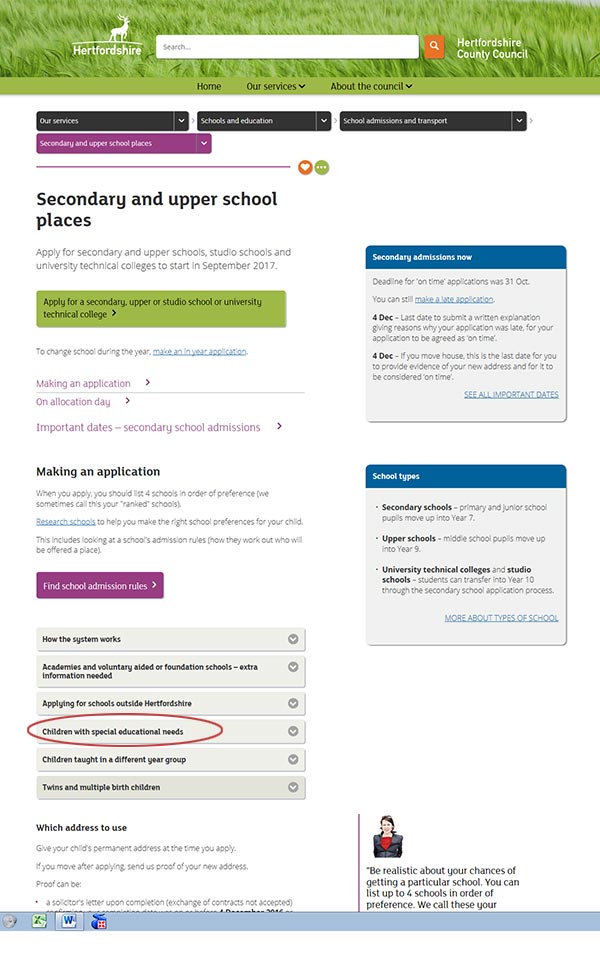
Transport to School
The [url=http://www.hertsdirect.org]http://www.hertsdirect.org[/url] website, also contains very useful information about Home to School Transport. Please click on the Transport for Pupils with Special Educational Needs, Learning Difficulties and Disabilities to access the details below. The School Transport Team can be contacted by calling 0300 123 4043 or emailing .(JavaScript must be enabled to view this email address).
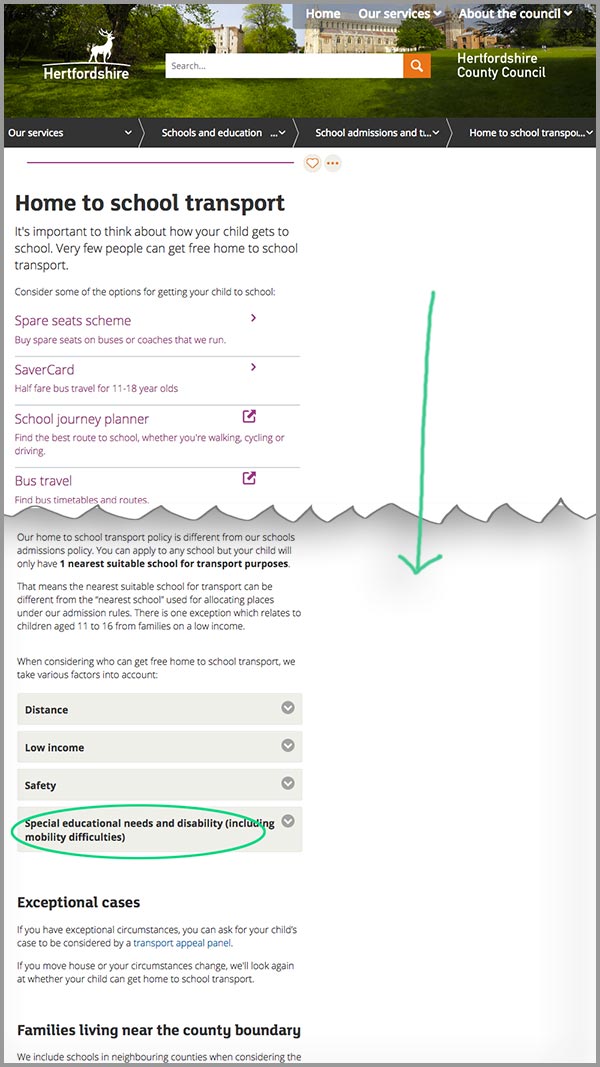
How it works
All students admitted to the school are the subject of an Educational Health Care Plan of their Special Educational Needs. Students can be admitted to Batchwood School at any stage of their secondary school career.
Students are only recommended for special schooling after a full formal assessment of their educational needs has been made by members of the educational and psychological services in close co-operation with you, as the student’s parents. No student is admitted to this school without a signed acceptance, by the parents, of the offer of a place.
If a place is offered, then parents are asked to complete a few forms for administrative purposes as this greatly helps the process of changing schools.
Please ensure these are completed as promptly as possible and returned to the school.
If you have any queries, or require additional information or assistance please contact the school by calling 01727 868021, or emailing .(JavaScript must be enabled to view this email address), and we will do our best to help.
Informal Visits
We are always delighted to show parents/carers around the school and invite them and their child to see the school as soon as possible after receiving a request to consider them for admission
This is a good opportunity to view our buildings and facilities, talk about the school and special education in general and answer any questions or queries. In many cases parents are invited to make an informal visit to the school during the initial assessment period.
Please note that an invitation to visit does not constitute an offer of a place, nor does it indicate that the final outcome of an assessment will be a recommendation that the child comes to a school like Batchwood.
All such decisions remain in the hands of the County Council's Special Educational Needs Department.
Local Partnership - Parental Information
Local Partnership
The St Albans West Local Partnership is a group of 27 local schools who have joined together to work collaboratively on projects which improve the lives of the families living in St Albans.
The available resources on offer are open to all our community and range from parenting classes to holiday activity sessions and family support covering a wide range of issues.
From transition concerns to drug and alcohol problems, we can listen and support you and find the best place for you to get the help you need. There is no problem too big or too small.
Services provided include parenting support, integrated practice for children and young people ensuring early intervention, adult and family learning platforms. We also offer enrichment programmes for children and young people to develop key skills linked to attainment, achievement and personal development and we can support local community groups to meet their specific needs and requirements.
For more information or for a more informal discussion, please call Nikki Howes, Partnership Development Officer on 07912 792215
Website usage terms and conditions
Welcome to our website. If you continue to browse and use this website, you are agreeing to comply with and be bound by the following terms and conditions of use, which together with our privacy policy govern Batchwood School’s relationship with you in relation to this website. If you disagree with any part of these terms and conditions, please do not use our website.
The term ‘Batchwood School’ or ‘us’ or ‘we’ refers to the owner of the website whose address is Townsend Drive, St Albans, Herts AL3 5RP. The term ‘you’ refers to the user or viewer of our website. The use of this website is subject to the following terms of use:
- The content of the pages of this website is for your general information and use only. It is subject to change without notice.
- Neither we nor any third parties provide any warranty or guarantee as to the accuracy, timeliness, performance, completeness or suitability of the information and materials found or offered on this website for any particular purpose. You acknowledge that such information and materials may contain inaccuracies or errors and we expressly exclude liability for any such inaccuracies or errors to the fullest extent permitted by law.Your use of any information or materials on this website is entirely at your own risk, for which we shall not be liable. It shall be your own responsibility to ensure that any products, services or information available through this website meet your specific requirements.
- This website contains material which is owned by or licensed to us. This material includes, but is not limited to, the design, layout, look, appearance and graphics. Reproduction is prohibited other than in accordance with the copyright notice, which forms part of these terms and conditions.
- All trademarks reproduced in this website, which are not the property of, or licensed to the operator, are acknowledged on the website.
- Unauthorised use of this website may give rise to a claim for damages and/or be a criminal offence.
- From time to time, this website may also include links to other websites. These links are provided for your convenience to provide further information. They do not signify that we endorse the website(s). We have no responsibility for the content of the linked website(s).
- Your use of this website and any dispute arising out of such use of the website is subject to the laws of England, Northern Ireland, Scotland and Wales.
Oaklands College Events
Oaklands College Events
- Oaklands Give It A Go Day - Saturday 21st June 11am to 4pm in White Lion Square, Hatfield Town Centre.
Location
Address: Townsend Drive, St Albans, Herts AL3 5RP
Tel: 01727 868021
Email: .(JavaScript must be enabled to view this email address)
Batchwood Newsletter
 December 2024
December 2024 Autumn 2024
Autumn 2024 March 2024
March 2024 January February 2024
January February 2024 December 2023
December 2023 November 2023
November 2023 September 2023
September 2023
Remote education provision
Information for students and parents or carers about what to expect from remote education where national or local restrictions apply. Plus details for individual students that are self-isolating.
 Remote_Education_Provision_-_information_for_parents_and_carers.pdf
Remote_Education_Provision_-_information_for_parents_and_carers.pdf
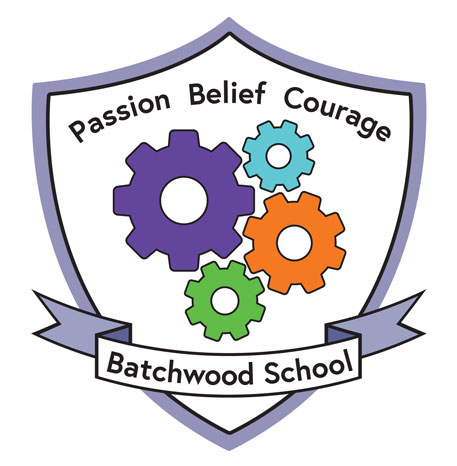

See more about all subject areas in our Curriculum pages
If your son/daughter has a statement or EHCP Plan, please contact SEND officer for St. Albans & Dacorum area SEN team
Hertfordshire County Council
Aspley 2
Brindley way
Hemel Hempstead HP3 9BF
Tel: 01442 453300
Batchwood Governing Body Attendance
 Governor Attendance (2022-23)
Governor Attendance (2022-23)
Link Governors Curriculum Areas
 Link Governors curriculum areas (2023-2024)
Link Governors curriculum areas (2023-2024)
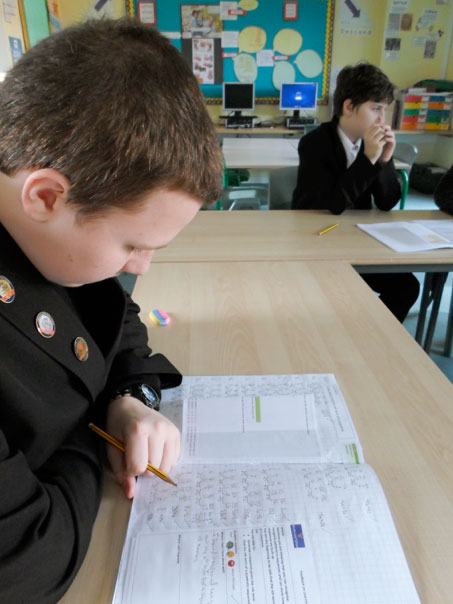
 Pupil Premium Strategy 2024-2025
Pupil Premium Strategy 2024-2025
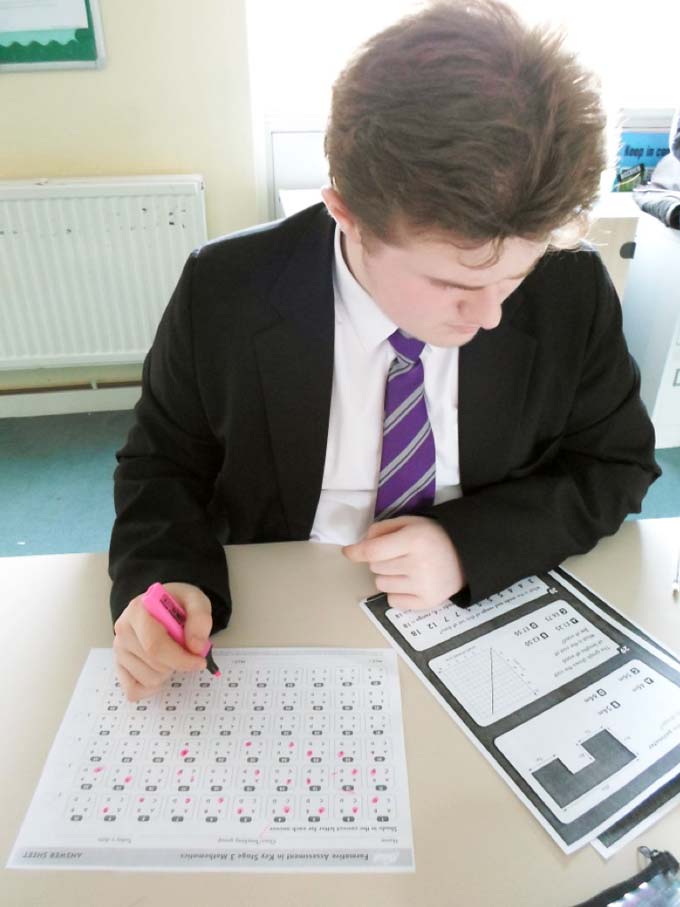
If you have any concerns about a student (or if you are a student yourself) please do not hesitate to contact us in The Pastoral Hub on 01727 868021, or email .(JavaScript must be enabled to view this email address)
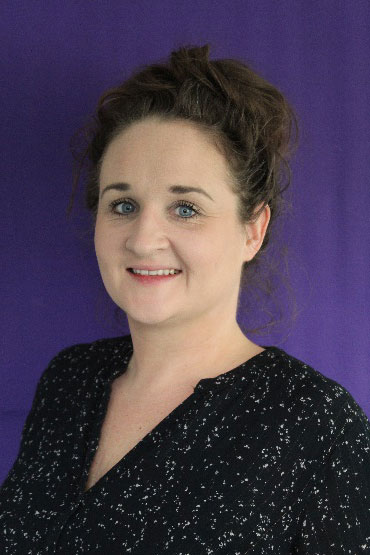 Jo Murphy
Jo Murphy
Designated Safeguarding Lead
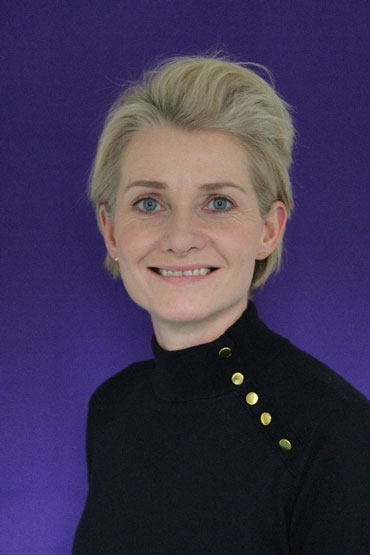 Sally Smiles
Sally Smiles
Deputy Designated Safeguarding Lead
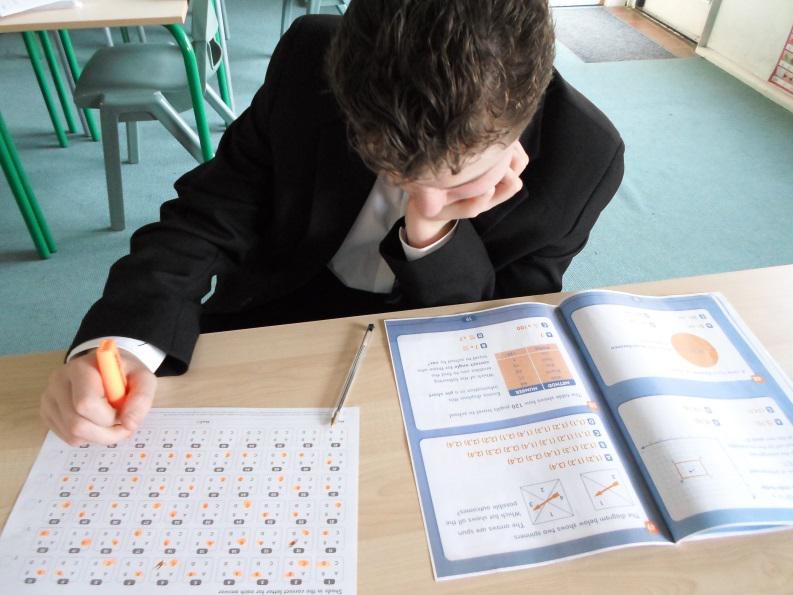
Contacts
- Careers Lead: Mark Pearson
- Careers Governor: Richard Hattrell
- Email: .(JavaScript must be enabled to view this email address)
- Tel: 01727 868021
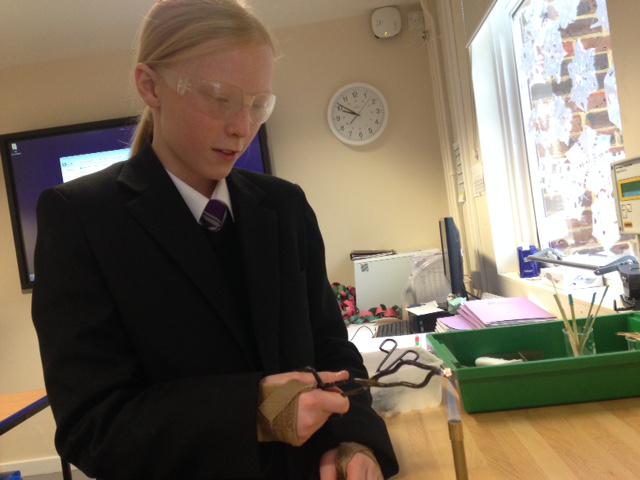
ABC Careers Newsletters
Compass Careers Benchmark Reports
 Compass Report Autumn 2024
Compass Report Autumn 2024 Compass Report Summer 2024
Compass Report Summer 2024 Compass Report Autumn 2023
Compass Report Autumn 2023 Compass Report Summer 2023
Compass Report Summer 2023 Compass Report Spring 2023
Compass Report Spring 2023 Compass Report Autumn 2022
Compass Report Autumn 2022 Compass Report July 2022
Compass Report July 2022 Compass Report September 2021
Compass Report September 2021
Alumni
If you attended Batchwood School, we would love you to contact us and tell us what you are now doing. We are in the process of forming an Alumni of past students whom we can draw upon to give our present students an insight into the life of work. Please contact the careers lead Mark Pearson at Batchwood School either by email mpearson@batchwood.herts.sch.uk or by telephone 01727 868021
Useful Websites
Apprenticeships.gov.uk
apprenticeships.gov.uk/influencers/support-for-parents-and-guardians
Apprenticeship advice and guidance for parents and carers
Apprenticeship Guide
apprenticeshipguide.co.uk
An apprenticeship, which must last for a minimum of 12 months, combines hands-on work with the opportunity to train and obtain qualifications. It’s also a paid position, so you earn while you learn. At least 20% of your time is set aside for learning, usually at a college, university or training provider. The rest of your time is spent applying your knowledge and skills in the actual workplace, doing the job that you set out to get. At the end of it, you’ll gain official certification, which will be equivalent to traditional qualifications.
Hertfordshire Services for Young People
Services for Young People
Providing youth work projects and programmes, information, advice, guidance, work related learning, outdoor education and support for young people aged 13-19 (up to age 24 for young people with learning disabilities).
Hop into Herts
www.hopinto.co.uk
HOP is the premier gateway in Hertfordshire to find out about: career path options, apprenticeships and work experience, skills development and professional qualification programmes.
Local Labour Information
www.hopinto.co.uk/questions/labour-market-information/
Labour market information is region specific and it tells you about the current work and job environment
National Careers Service
nationalcareers.service.gov.uk
This is the Government’s hub for careers advice for people of all ages where you can find help with drafting letters, CVs, exploring your skills or seeking careers advice
Parent Perspective
amazingapprenticeships.com/the-parent-perspective-podcast
The Parent Perspective is an exciting podcast series for parents and carers, helping to support their children with careers advice and guidance.
STEM
www.stem.org.uk/stem-ambassadors
STEMNET creates opportunities to inspire young people by linking people in STEM careers with teachers and schools to enable young people to gain a clear idea of the range of careers available to them.
Talking Futures
www.talkingfutures.org.uk
Talking Futures is a resource created for parents/carers to have informed and constructive conversations with their child about the different training and education pathways available to them.
T Levels
www.tlevels.gov.uk/students/parents
T Levels were established to strengthen the technical education system in England and give young people the knowledge and skills that employers look for. Combining theoretical knowledge with experience in the real world of work, T Levels give students a head start in their future, whether that's employment, a higher apprenticeship or further education.

Useful Contacts
Our Special Educational Needs Coordinator is Jo Murphy: .(JavaScript must be enabled to view this email address)
Our Governor with responsibility for SEND is Dawn Leverick-Brown.
To discuss individual issues further, or you would like to know more about what we offer at Batchwood School, please contact us on 01727 868021 or e-mail us .(JavaScript must be enabled to view this email address)
The Houses
Parks - Mr Pearson and Mr Burkhardt
Pankhurst - Mr Hunter, Mr Adams and Miss Canning
Attenborough - Mr Hurley and Miss Avery
Hawking - Mr Bell, Miss Leatham and Miss Dunkley
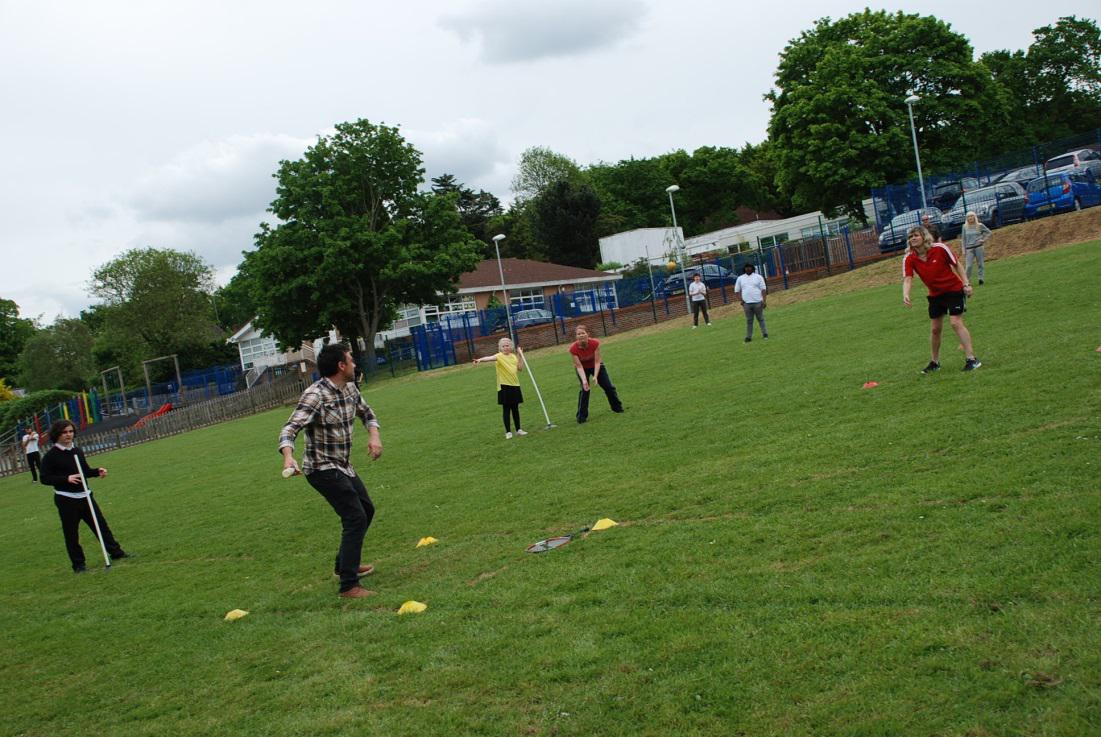
Students taking part in Monday football
View the music gallery for more photos
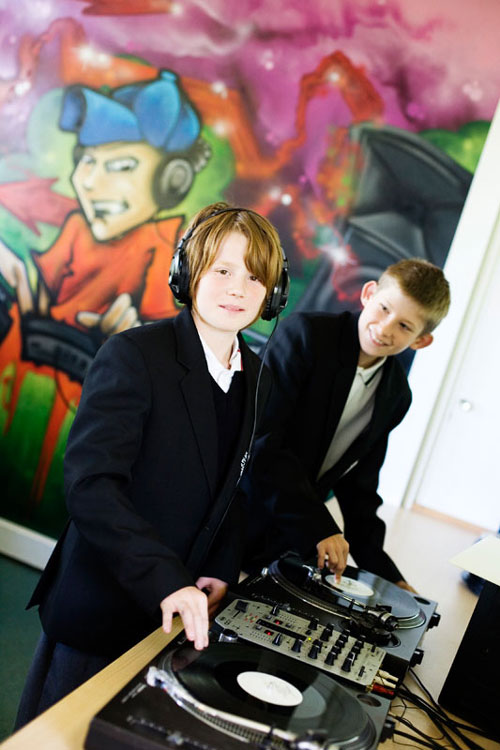
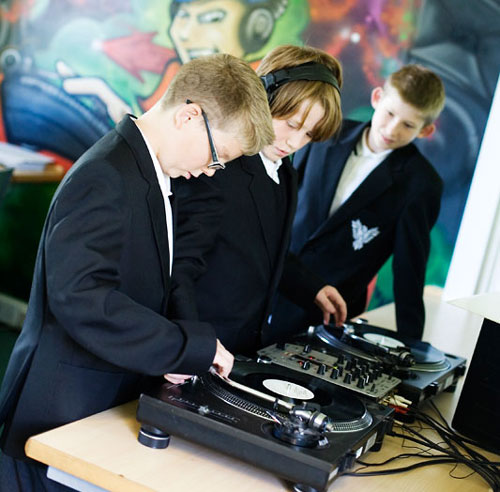
- Outdoor Learning
- Horticulture
- Bushcraft/Nature Studies
- Mountaineering
- Outdoor Learning
- Horticulture
- Bushcraft/Nature Studies
- Mountaineering
- Outdoor Learning
- Horticulture
- Bushcraft/Nature Studies
- Mountaineering
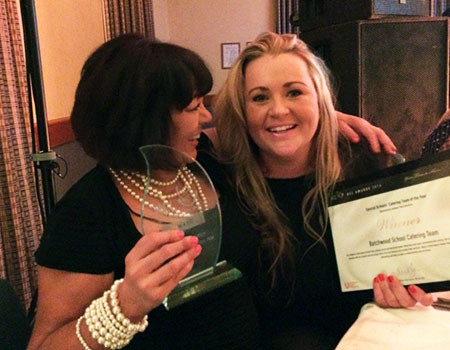
Student Testimonials/Feedback
‘I think that Nev is the most amazing person ever, she has helped everyone including me and I am very grateful. She cooks the most amazing food I have ever tasted and she treats all the staff and the students with respect and is always delighted to see us at school. She is kind and friendly and cool headed in a crisis. She tries to do what she can to help people and we can always depend on her. She has a good sense of humour and has a fun personality.
I have known Nev for 4 years and during that time she has helped me through difficult situations in my life.
She has recently supported me with losing weight and she always encourages me to make healthy choices, I have lost 4 stone in weight also my health is so much better because of what Nev and everyone else did for me. ‘
Shanah Year 11 Student
‘My favourite cook is Nev because she is the nicest person ever. Nev makes the best tasting and good looking food she can. My favourite food she makes is a wrap – it’s amazing and healthy. Nev always helps everyone out. She makes sure that everyone is happy with her and her food.
I could never ask for a better cook that Nev’.
Ez, Year 10 (Diabetic diet)
‘My favourite thing Nev cooks has to be the curry because it is so good. But it’s not just the food that’s good she has a great personality and she always tells a good joke.
Nev is never rude, she is very polite. She likes to know you are well fed. She likes to know you’re ok like whenever I see her she asks if I’m ok and if I’m upset she always cheers me up by giving me a hug or an ice cream bar.
She is just a good soul and I hope she wins because she really deserves it.’
Jamie Year 11 Student
‘Nev is really friendly and she accommodates everyone always making sure there is an extra option for everyone, always going that extra mile. The food’s always nice and healthy and she always asks if you’re okay if you look sad.’
Lewis Year 10 Student
‘I am a student who has a packed lunch, but I love Nev’s roast dinners so always have that once a week’
Lilly Year 8 Student
Their Last Breath
by Millie
Walking through the tunnel of death,
Choking up their last breath.
Hell is the game,
Who is to blame?
Mars is our god, our ruler,
He led us here, there’s nothing crueller.
Heavy weight upon our backs,
From the condiments in our sacks.
Approaching the hand of hell,
Holding our noses from the smell.
A man is hurt; he’s crying.
Looks as if he’s dying.
He grabs me, drowning in blood,
He falls back to the mud.
We watch his face go pale,
His family awaits the mail.
Waiting here in shock,
God looks down to mock.
We suffered and died in pain,
Who is to blame?
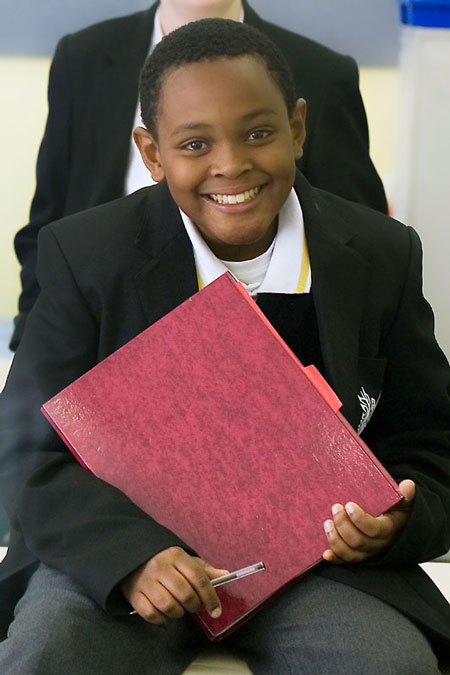
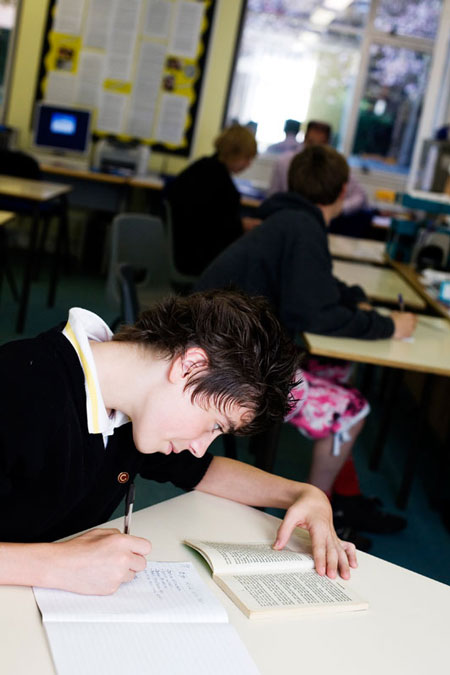
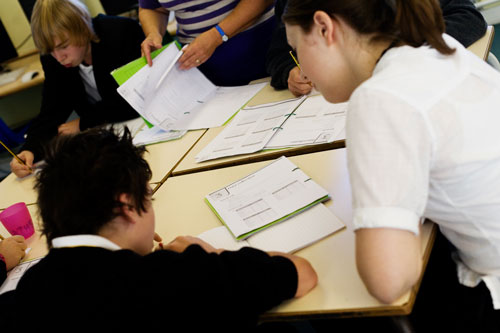

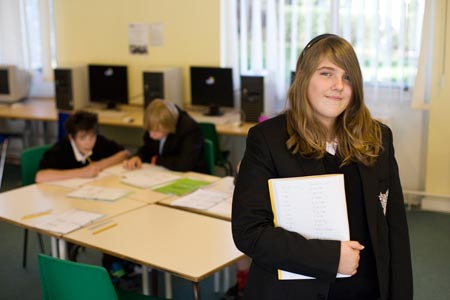
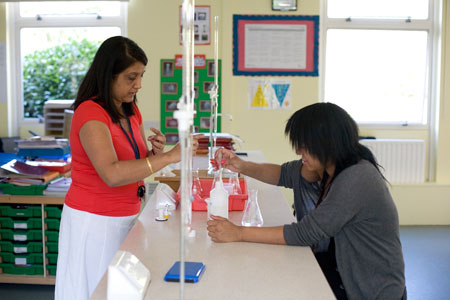
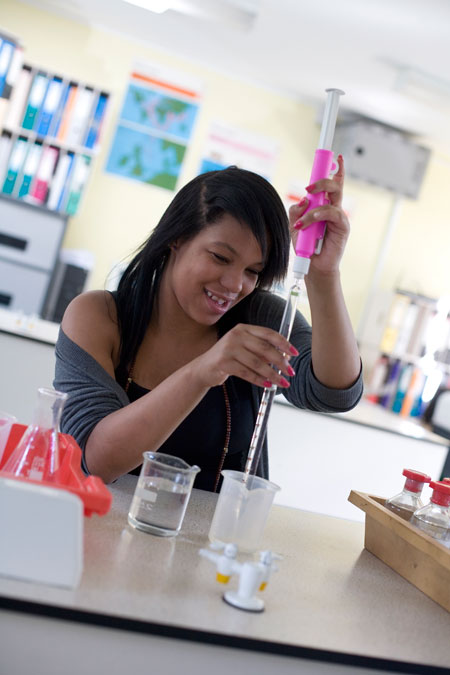
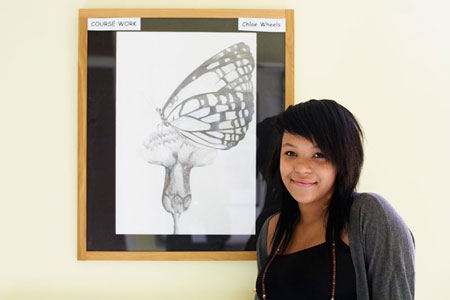
Galleries
Year 11 - Work based on theme of 'Structures'
Year 9 - South American Pueblo Pottery
Year 7 - Native American Masks

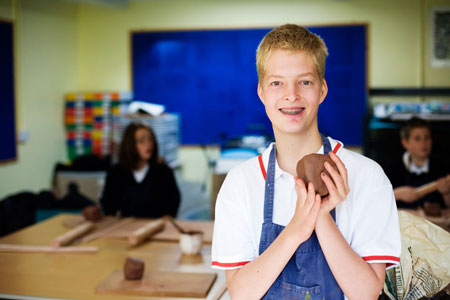
See more photos in our Gallery
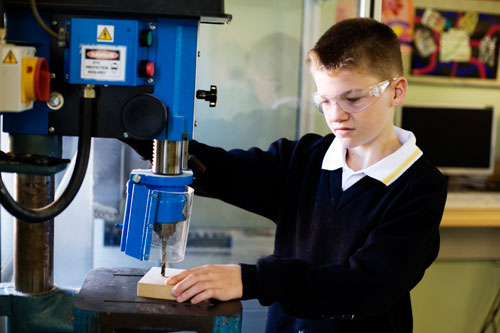
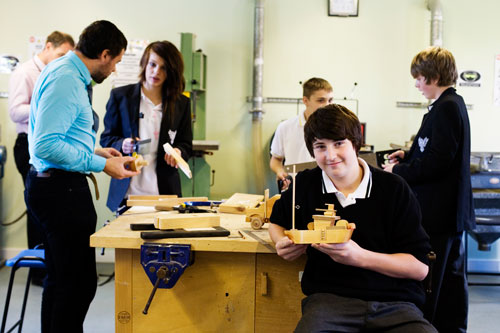
![]() Cooking, Art & Design & Horticulture
Cooking, Art & Design & Horticulture
A Gallery showing a cross curricula project between Cooking & Nutrition, Art & Design and Horticulture where we made a Thai salad using the edible flowers and chillies that were grown.

Galleries
 Snowdonia Mountaineering Trip February 2017
Snowdonia Mountaineering Trip February 2017 Snowdonia Mountaineering Trip 2016
Snowdonia Mountaineering Trip 2016 Space Seed Experiment (Art & Design / Horticulture)
Space Seed Experiment (Art & Design / Horticulture) Waitrose - Grow & Sell (Art & Design / Horticulture)
Waitrose - Grow & Sell (Art & Design / Horticulture) Horticulture Fun
Horticulture Fun Bushcraft Adventures 1
Bushcraft Adventures 1 Bushcraft Adventures 2
Bushcraft Adventures 2 Bushcraft Adventures 3
Bushcraft Adventures 3 Trip to Celtic Harmony Iron Age Heritage Centre
Trip to Celtic Harmony Iron Age Heritage Centre Trip To Great Groves: Harvesting Oak
Trip To Great Groves: Harvesting Oak Building the Stone Age Roundhouse
Building the Stone Age Roundhouse
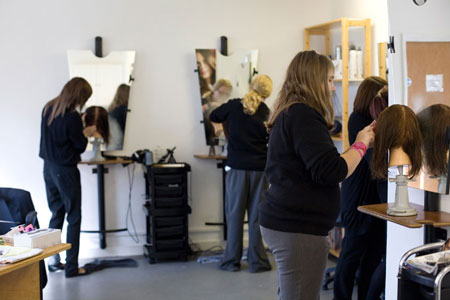
Athletics Meeting - Thursday 30th June 2016
Batchwood School took part in the annual athletics meeting at Wodson Park.
Girls Football Tournament - Friday 10th June 2016
Batchwood Girls football team went along to Heathlands School, to take part in the annual girls’ tournament.
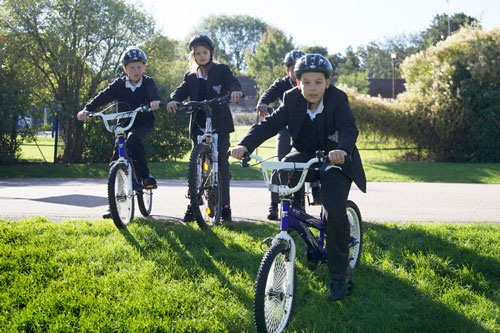
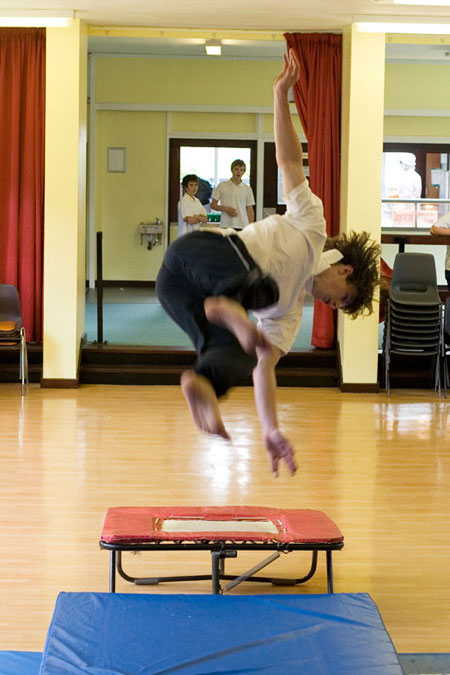
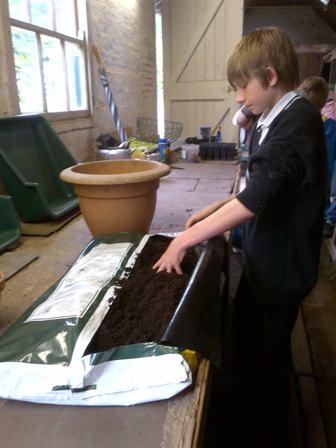
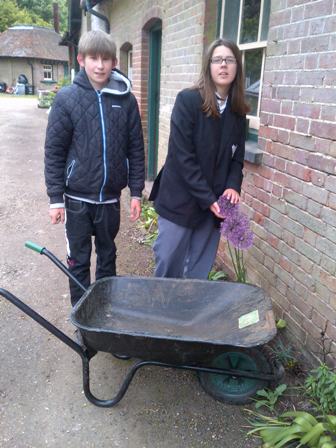
Galleries
Extra curricular activities that further enhance our own curriculum.
Important notice
Please note the information displayed here is obtained from the Hertfordshire County Council (HCC) web-site www.hertsdirect.org and may therefore be liable to change.
Whilst the school will endeavor to ensure these pages are regularly updated, we cannot be held responsible for any omissions and parents/carers are strongly recommended to check with HCC for current details.
The Council can be contacted by calling their general number, 0300 123 4040, and asking to be put through to the schools admissions department.
The School Transport Team can be contacted directly by calling 0300 123 4043.
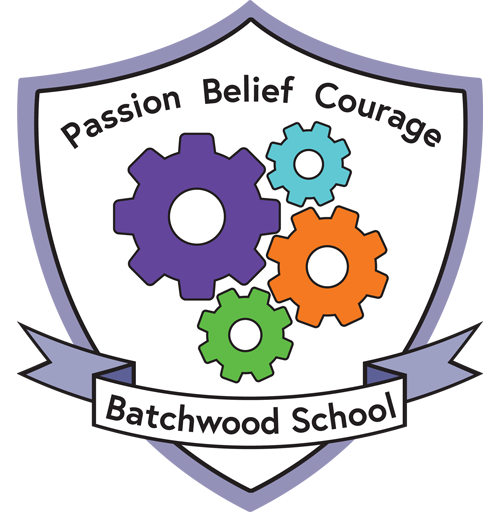


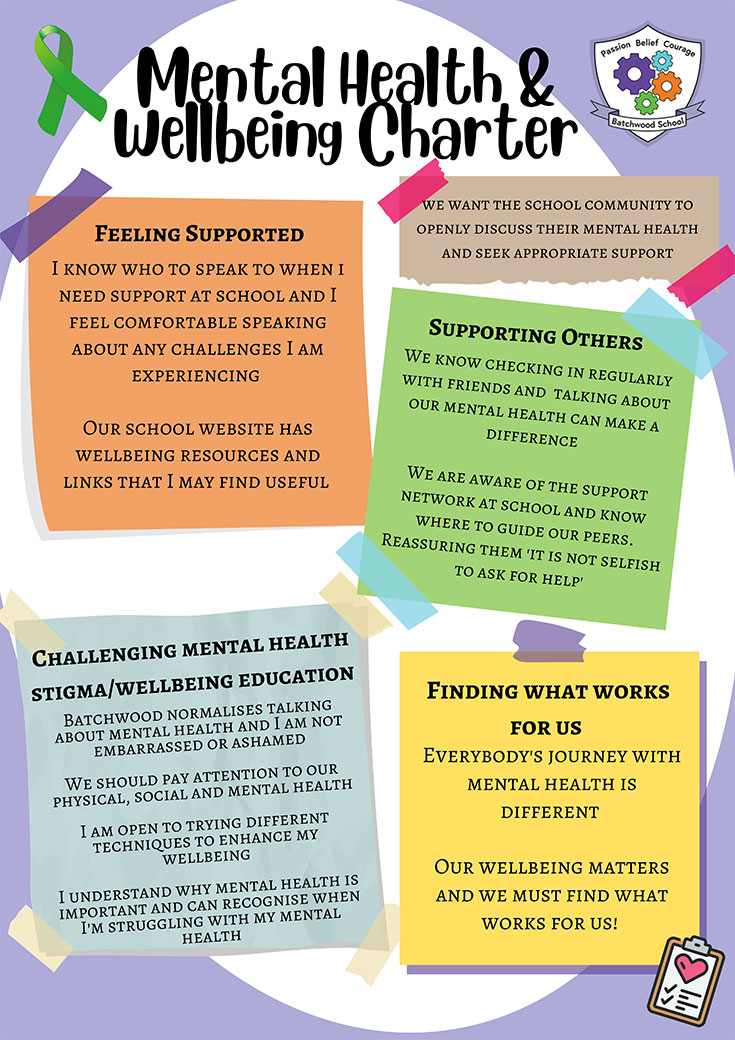
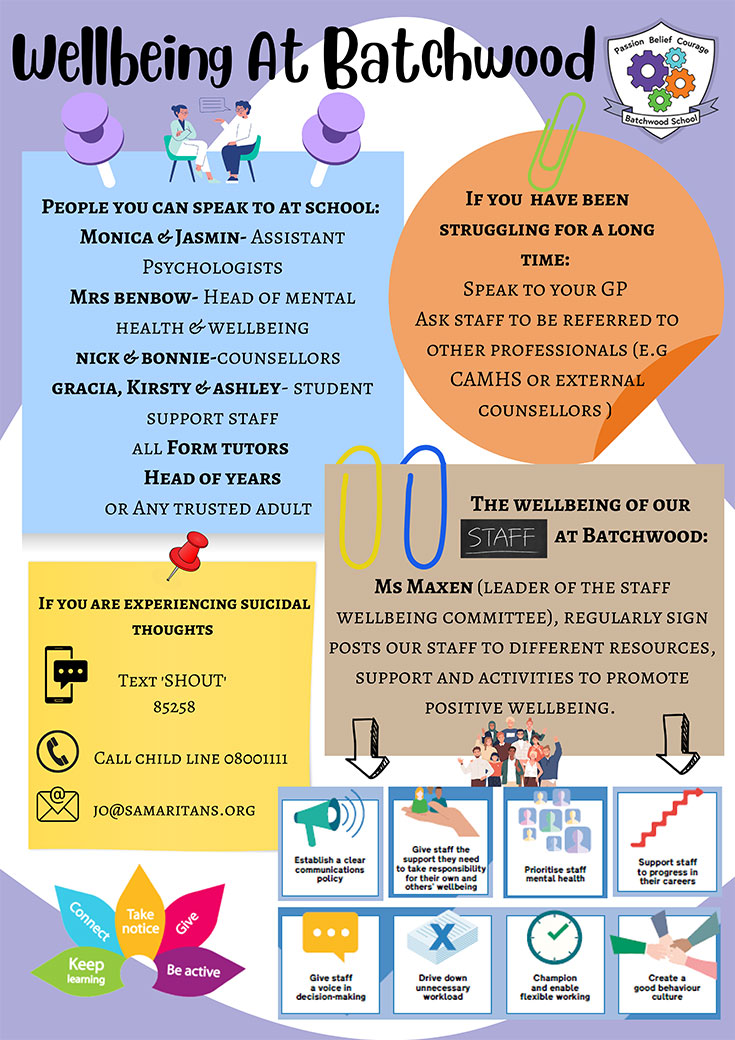
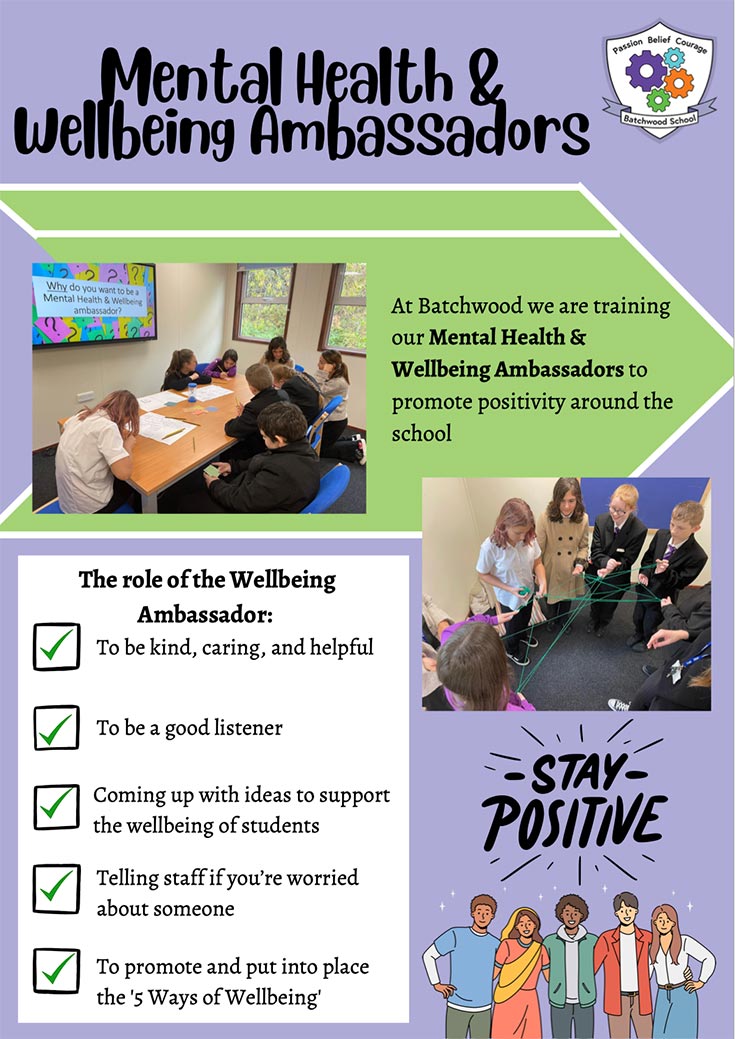
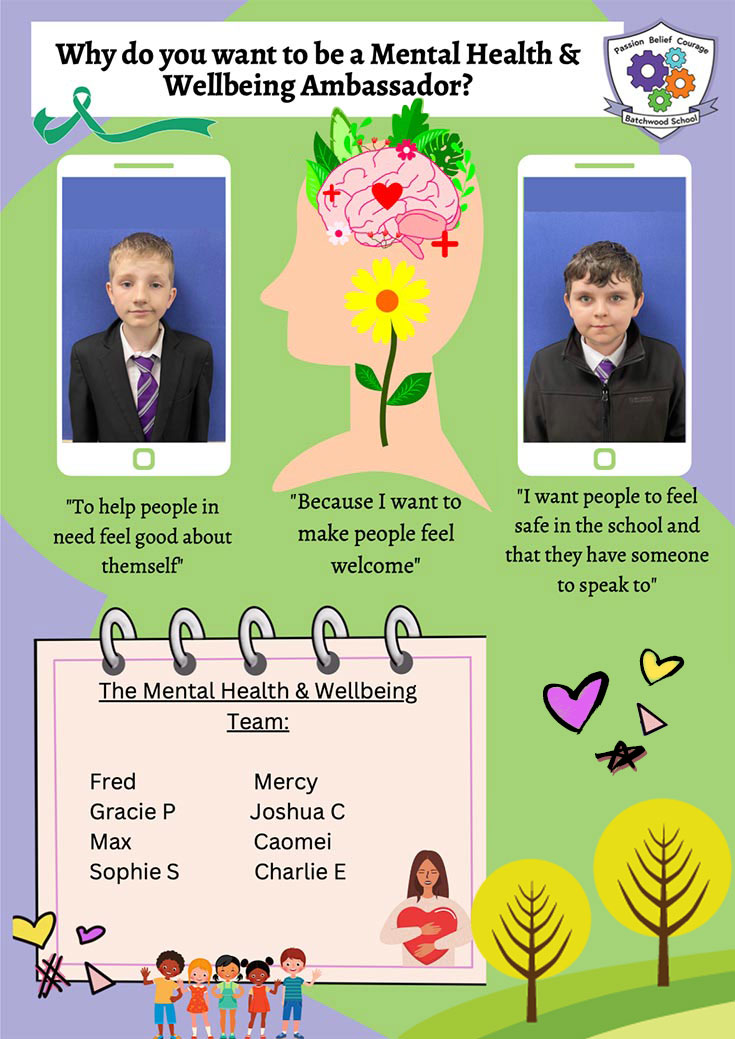
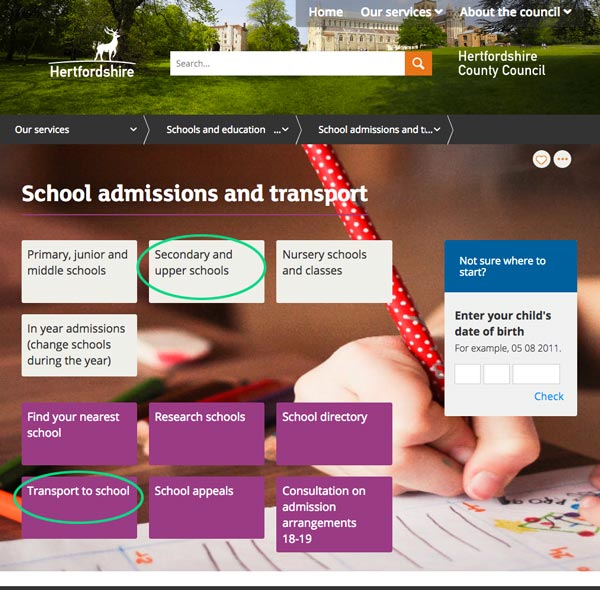
 Summer 2020
Summer 2020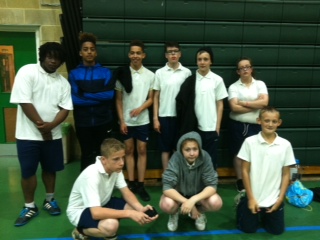

 PE Gallery
PE Gallery